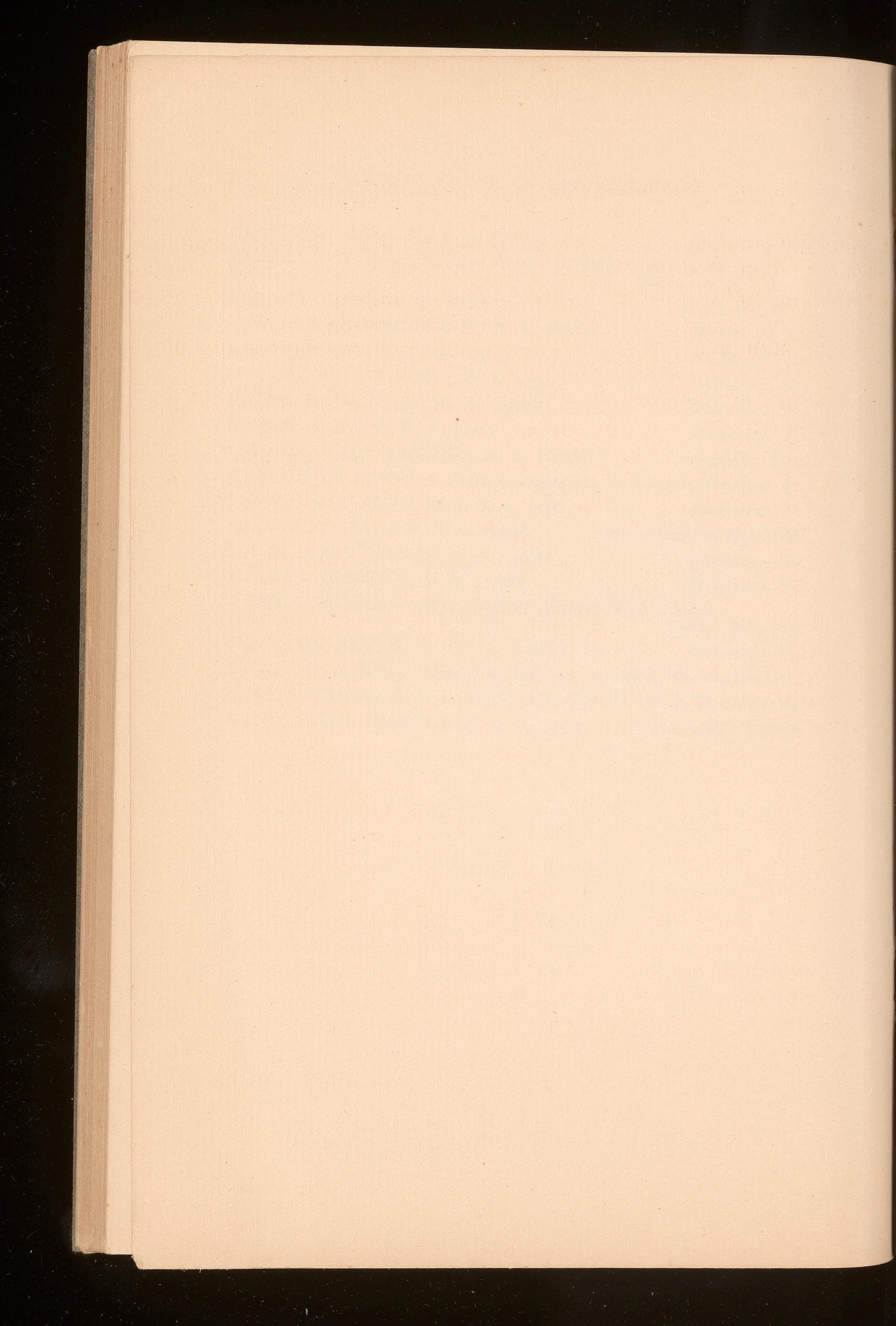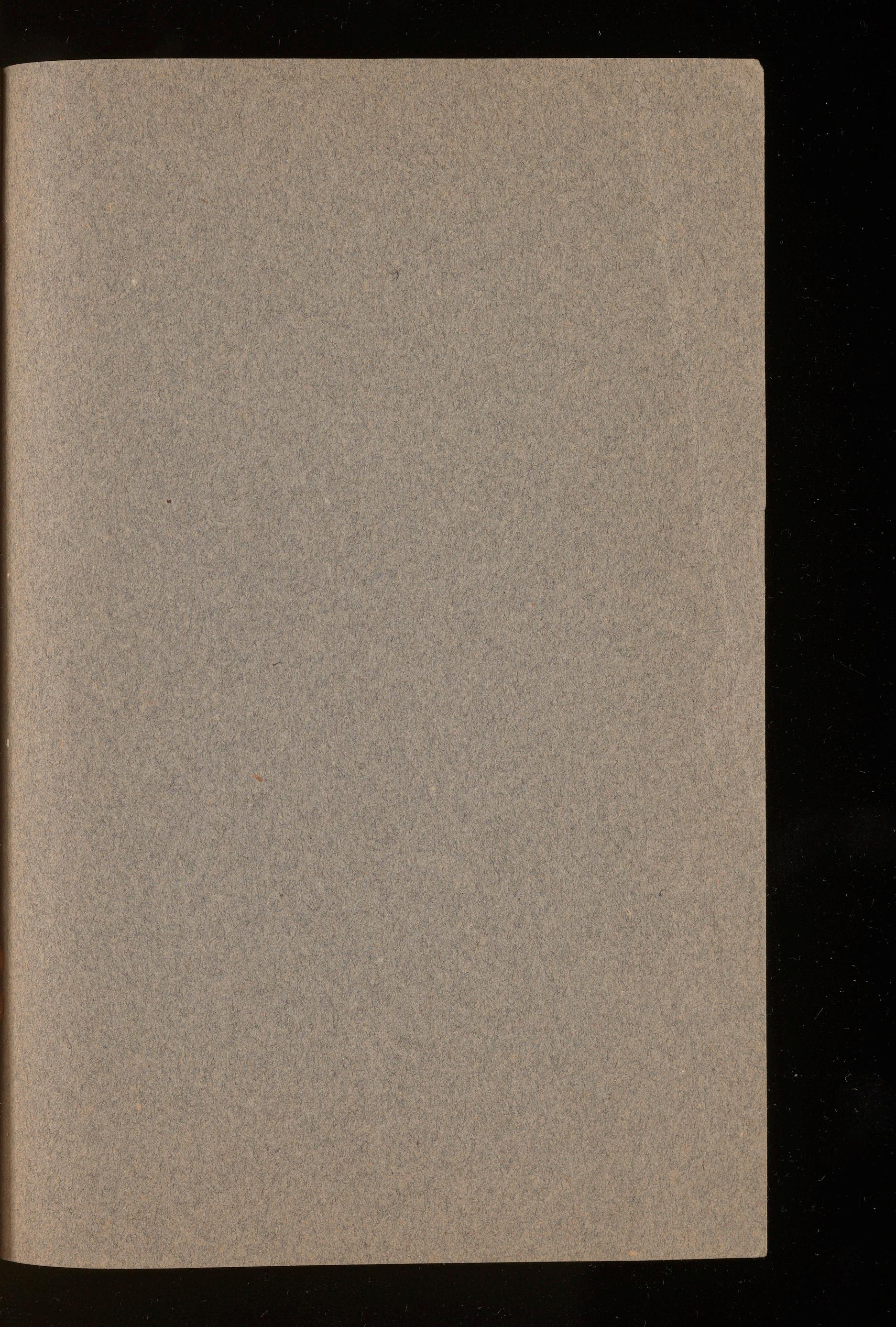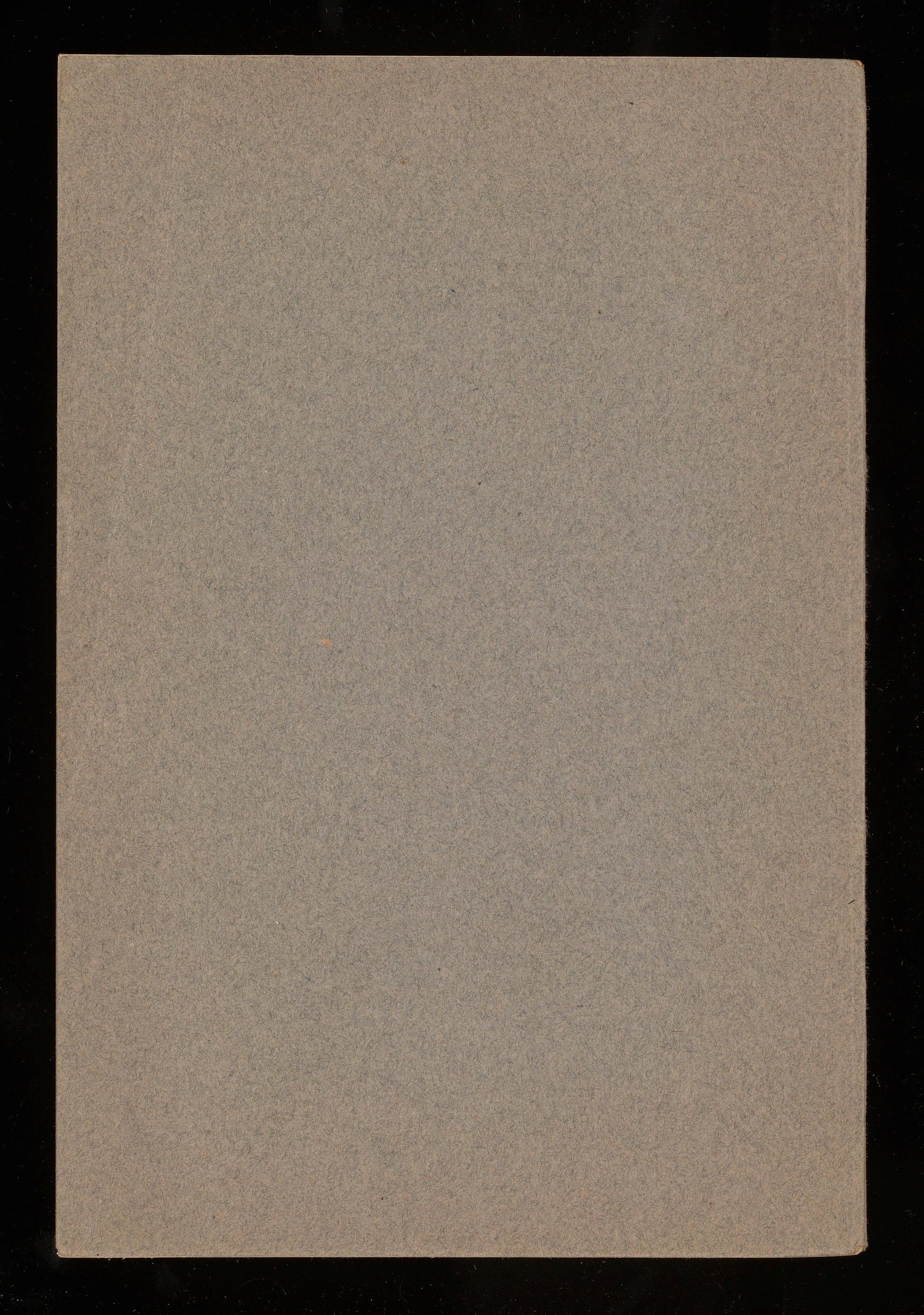CATALOGUE of WESTI-IAMPTON I COLLEGE
A COLLEGE FOR WOMEN CO-ORDINATE WITH RICHMOND COLLEGE FOR MEN
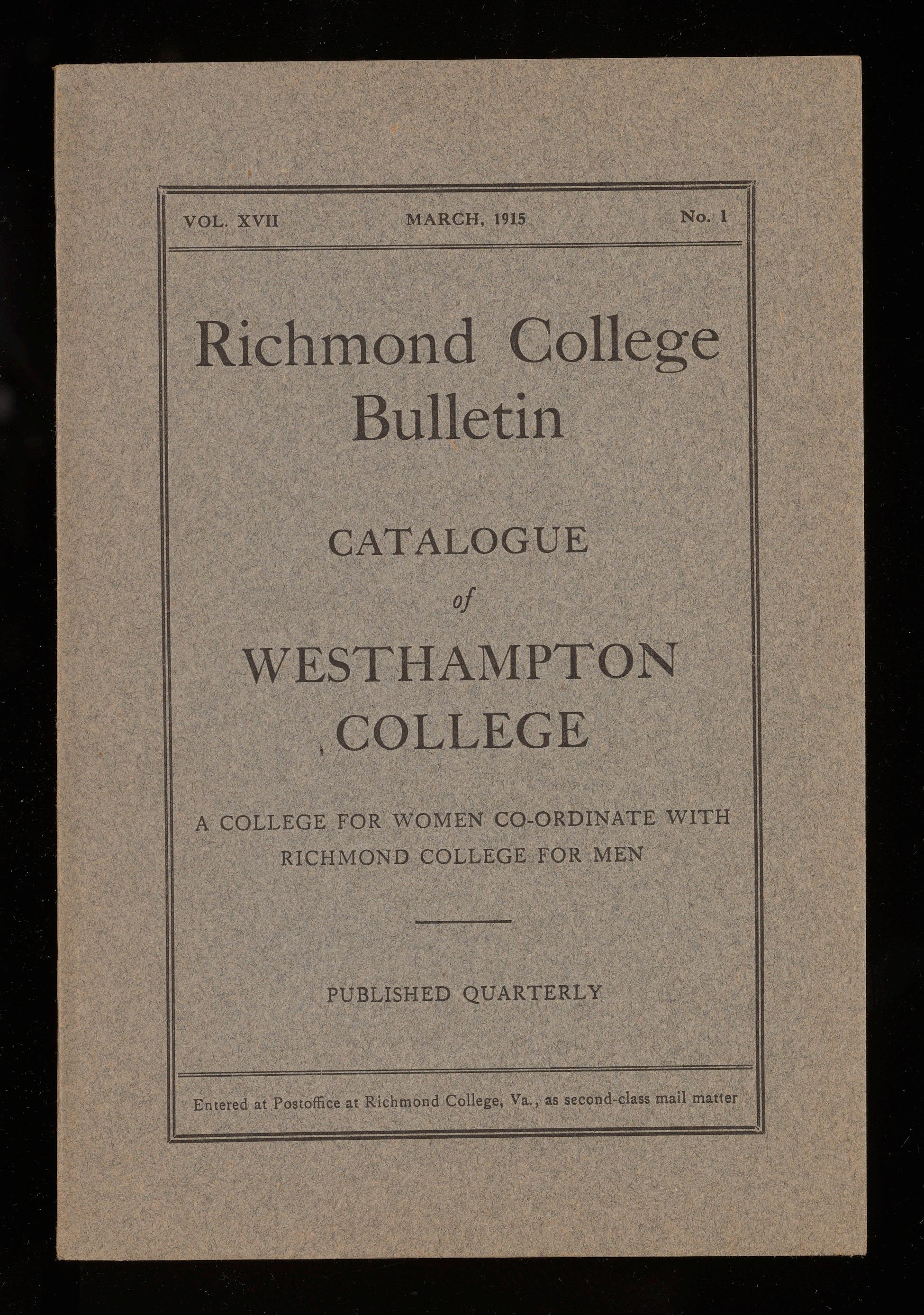
PUBLISHED QUARTERLY
Entered at Post office at Richmond College, Va., as second-class mail mauer
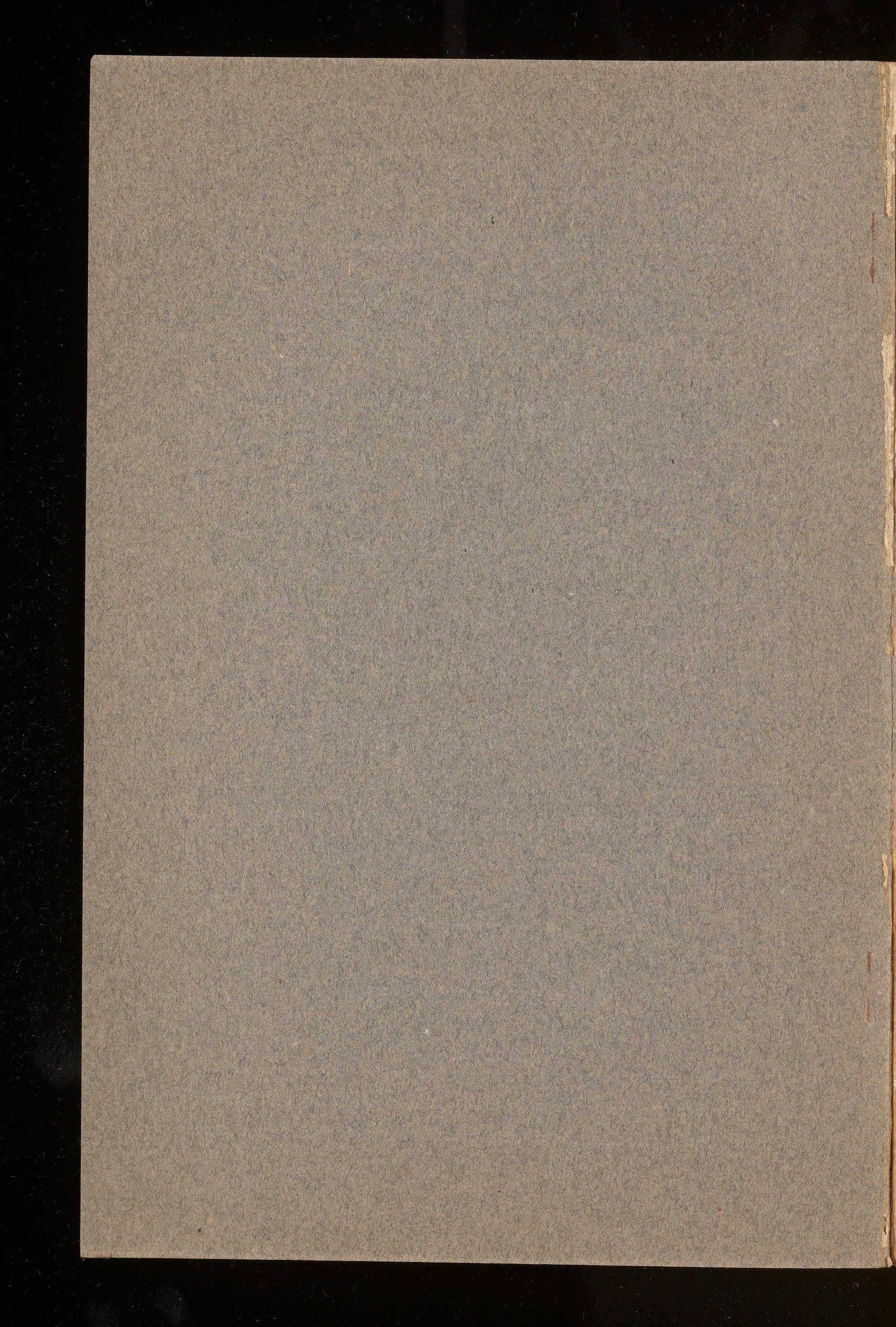

A COLLEGE FOR WOMEN CO-ORDINATE WITH RICHMOND COLLEGE FOR MEN

PUBLISHED QUARTERLY
Entered at Post office at Richmond College, Va., as second-class mail mauer


With Announcements for the Session, 1915-16
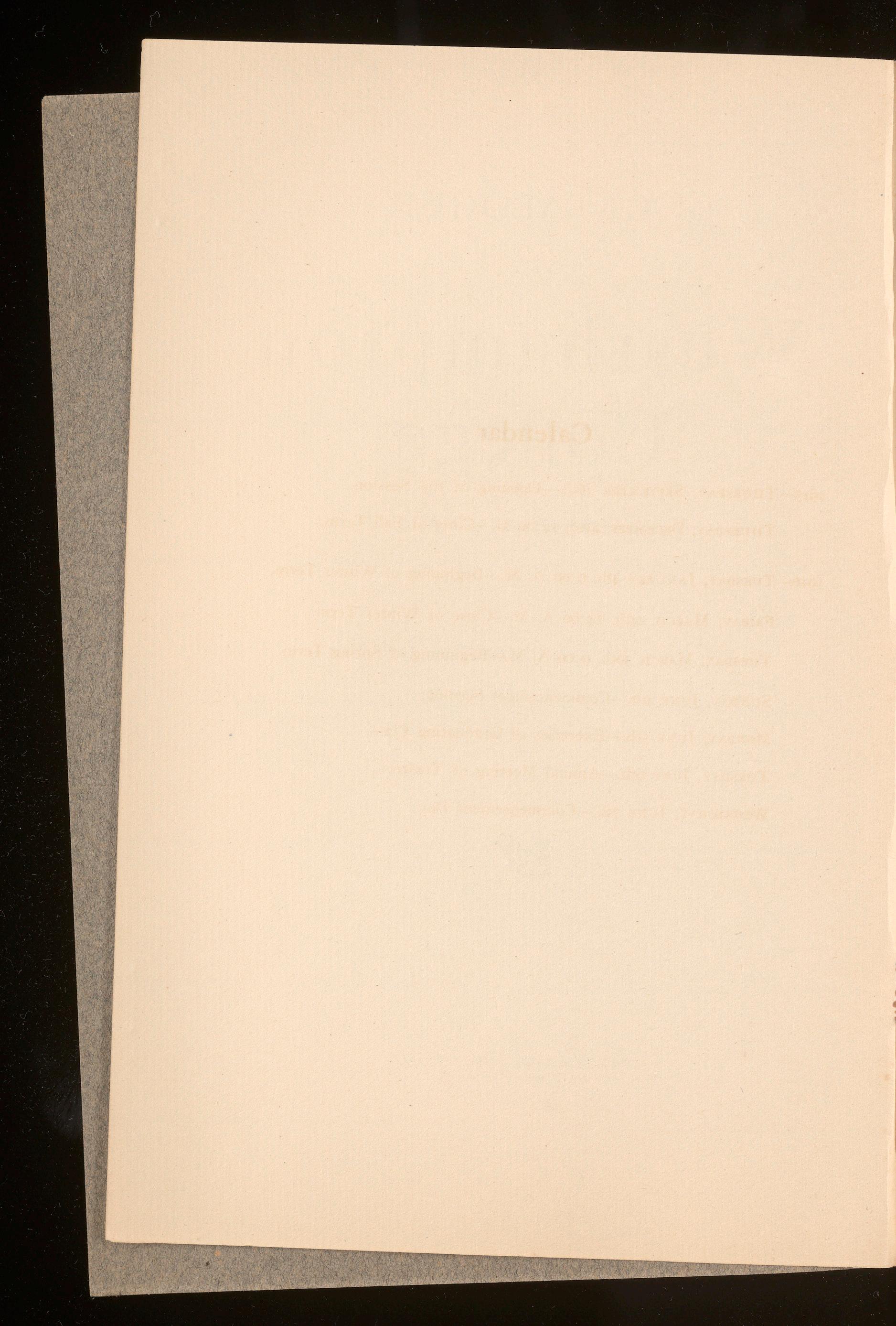

1915-THURSDAY, SEPTEMBER16th.-Opening of the Session.
THURSDAY,DECEMBER23rd, 12 :oo M.-Close of Fall Term.
1916-TuESDAY, JANUARY4th, 9:00 A. M -Beginning of \Vinter Term.
FRIDAY,MARCH24th, 12 :oo A. M.-Close of Winter Term.
TUESDAY,MARCH30th, 9:00 A. M.-Beginning of Spring Term.
SUNDAY,JUNE 4th.-Commencement Sermon.
MONDAY,JUNE 5th.-Exe rcises of Graduating Clas s
TUESDAY,JUNE 6th -Annual Meeting of Truste es
vVEDNESDAY,JuNE 7th.-Commencement Day

WESTHAMPTON COLLEGE, whose first session began September 17, 1914, had its origin in the desire of Virginia Baptists to provide for their daughters educational advantages of the best modern type and standard. Richmond College, founded as t'he Virginia Baptist Seminary in 1832, had already in 1898 admitted women to its advanced classes and to degree privileges. When in 19()6 plans were forming for the proposed college for women, it was agreed between Richmond College and the Virginia Baptist Education Commission that Richmond College should establish and maintain a new college for women of equal grade with the college for men. In order to carry these plans into effect, a campaign for $500,000 was inaugurated and after several years of united effort the full sum was collected. In the meantime the Richmond College corporation had decided not only to build a new college for women, but also to rebuild the old college for men at a new site.
The buildings of Westhampton College were completed in January, 1914, and occupy the highest part of a tract of land embracing 130 acres. Separated from this campus by a lake of about eight acres in extent are the spacious grounds of the college for men. The situation is in the western suburbs of Richmond, easily accessible by street cars.
Westhampton College is owned and controlled by the Richmond College corporation, and enjoys all the general advantages afforded by co-ordination with an old and well established college of standard grade. At the same time the college for women has its own separate campus, its own buildings, and its independent institutional life. While many professors will teach in both colleges, instruction will be

altogether separate, and women will at no time be taught in classes with men. The internal administration of W esthampton College is immediately in charge of a woman dean, and both men and women teach in the faculty.
The grounds, buildings, and equipment of vVesthampton College are valued at $400,000, and the college shares largely in the benefit of the million dollar endowment held by the Richmond College corporation. The buildings, of Gothic architecture, are most substantially constructed. The framework is steel set in concrete. All floors are of reinforced concrete, and partitions are of brick or hollow tile. The stairways are of steel with slate treads, the window frames of concrete stone and the sash of brom:e. The equipment throughout is entirely modern: Safety, health, and comfort of students have e verywhere been considered.
(As AMENDED MARCH 3, 1914)

Be it Resolved:
r. That there be, and is hereby established at, or near the City of Richmond, an institution of learning for the instruction of youth in the various branches of science, literature, philosophy, law, and the liberal and useful arts, which shall consist of two co-ordinate colleges, one for the education of men, to be known by the name of Richmond College, and the other for the education of women, to be known by the name of " Westhampton College."
2. That A. R. Courtney, C. H. Ryland, H. Wythe Davis, C. T. Watkins, J . A. C. Chandler, J. Hunt Hargrave, R. H. Pitt, H. L. Schmelz, H. W. Straley, Geo. B. West, John R. Bagby, J. J. Montague, J. M. Pilcher, C. R. Sands, George Swann, George W . Beale, J. Taylor Ellyson, John T. Griffin, T. C. Williams, Jr., B. T. Gunter, W. C. James, Armistead R. Long, A . J. Montague, R. C. ·Williams, W. W. Baker, J. L. Camp , Livius Lankford, A . W. Patterson, George Braxton Taylor, William L. Ball, S. C. Mitchell, T. B. McAdams, G . W. McDaniel , C. E. Nicol, W. R. Barksdale, T. S. Dunaway, I. B. Lake, C. V . Meredith, and George B. Steel, the trustees of said institution now in office, are to continue therein until their respective terms of office expire, and they and their successors are, and shall be a body corporate under the nam e and style of Richmond College, who shall have perpetual successsion and a common s-eal; may sue or be sued, implead, or be imp leaded; may receive and hold property for the benefit of said institution, in s aid name receiving and holding all rights, claim s , privileges, and appurtenances formerly belonging, or in an ywis e p ertaining to "the Trustees of Richmond
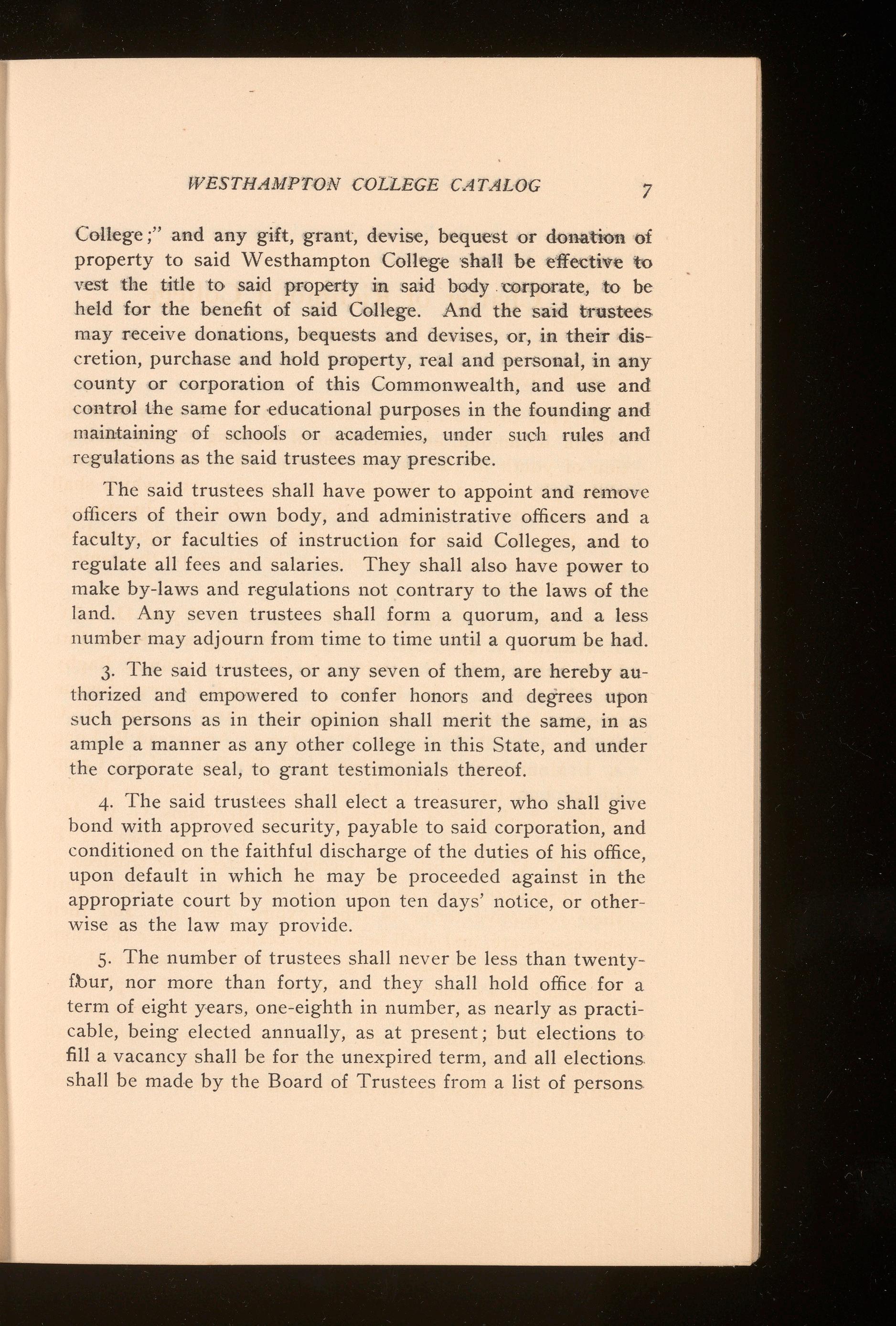
College;" and any gift, grant, devise, bequest or donation of property to said 'vVesthampton College shall be e'ffecthre to vest the title to said property in said body .-corporate, to be held for the benefit of said Co.llege. And the said trustees may receive donations, bequests and devises, or, in their discretion, purchase and hold property, real and personal, in any county or corporation of this Commonwealth, and use and control the same for -educational purposes in the founding and maintaining of schools or academies, under such rules and regulations as the said trustees may prescribe.
The said trustees shall have power to appoint and remove officers of their own body, and administrative officers and a faculty, or faculties of instruction for said Colleges, and to regulate all fees and salaries. They shall also have power to make by-laws and regulations not contrary to the laws of the land. Any seven trustees shall form a quorum, and a less number may adjourn from time to time until a quorum be had.
3. The said trustees, or any seven of them, are hereby authorized and empowered to confer honors and degrees upon such persons as in their opinion shall merit the same, in as ample a manner as any other college in this State, and under the corporate seal, to grant testimonials thereof.
4. The said trustees shall elect a treasurer, who shall give bond with approved security, payable to said corporation, and conditioned on the faithful discharge of the duties of his office, upon default in which he may be proceeded against in the appropriate court by motion upon ten days' notice, or otherwise as the law may provide.
5. The number of trustees shall never be less than twentyfbur, nor more than forty, and they shall hold office for a term of eight years, one-eighth in number, as nearly as practicable, being elected annually, as at present; but elections to fill a vacancy shall be for the unexpired term, and all elections shall be made by the Board of Trustees from a list of persons
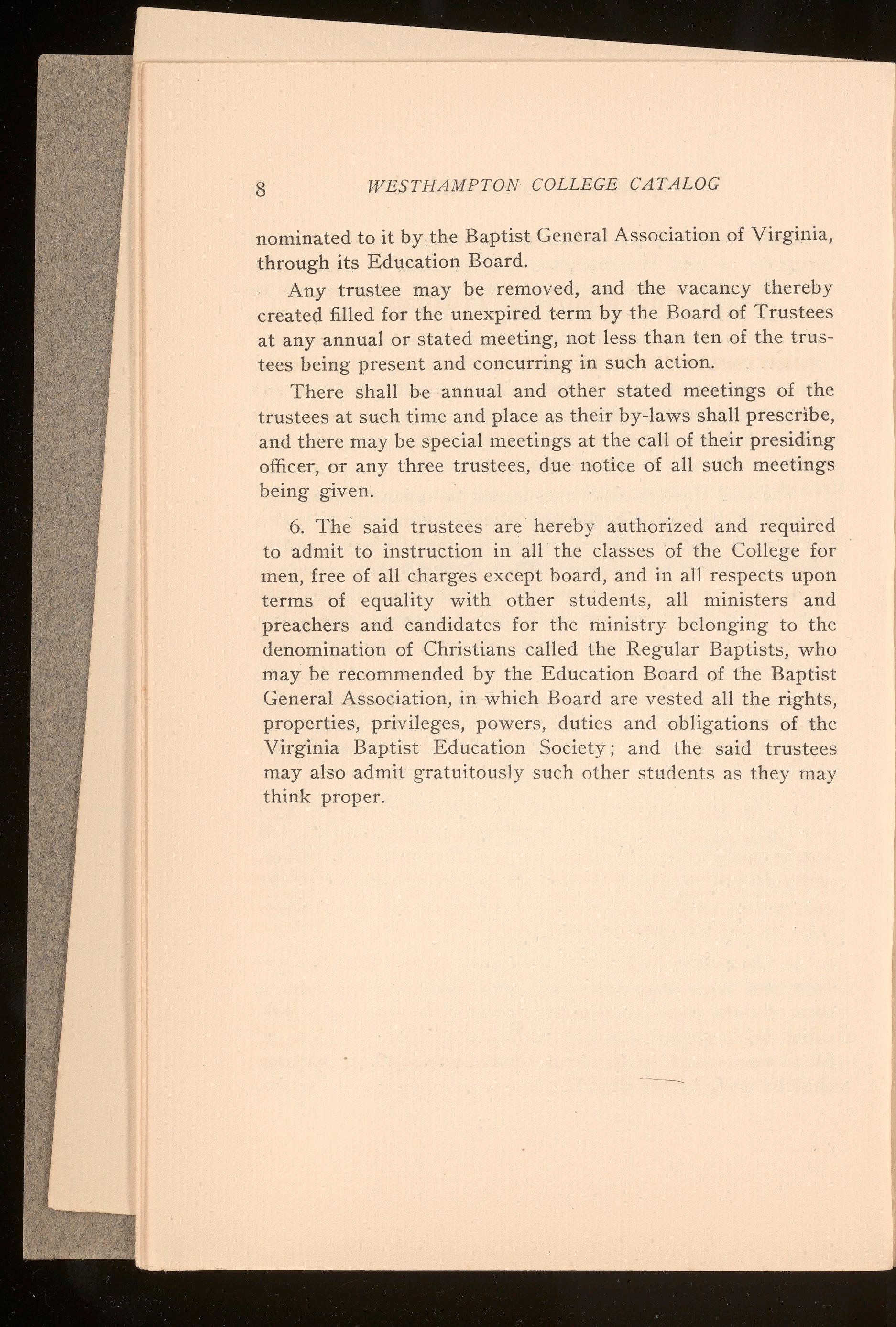
nominated to it by the Baptist General Association of Virginia, through its Education Board.
Any trustee may be removed, and the vacancy thereby created filled for the unexpired term by the Board of Trustees at any annual or stated meeting, not less than ten of the trustees being present and concurring in such action.
There shall be annual and other stated meetings of the trustees at such time and place as their by-laws shall prescribe, and there may be special meetings at the call of their presiding officer, or any three trustees, due notice of all such meetings being given.
6. The said trustees are hereby authorized and required to admit to instruction in all the classes of the College for men, free of all charges except board, and in all respects upon terms of equality with other students, all ministers and preachers and candidates for the ministry belonging to the denomination of Christians called the Regular Baptists, who may be recommended by the Education Board of the Baptist General Association, in which Board are vested all the rights, properties, privileges, powers, duties and obligations of the Virginia Baptist Education Society; and the said trustees may also admit gratuitously such other students as they may think proper.
LIEUTENANT-GOVERNOR J. TAYLOR ELLYSON, PRESIDENT
A. W. PATTERSON, ESQ., VICE-PRESIDENT
CLASS ONE
Term expires June, 1915
J. HUNT HARGRAVE,EsQ .. . Chatham
R. H. PITT, D. D., LL. D., Richmond
H. w. STRALEY,ESQ., Princeton, W. Va.
Gm B. WEST, EsQ., Newport News
CLASS TWO
Term expires June, 1916
J. J. MONTAGUE,EsQ ... Richmond
J. M. PILCHER, D'. D .. . . Petersburg
C. R. SANDS, EsQ . .. Richmond
PROF. GEO SWANN. .... Powhatan
CLASS THREE
Term expires June, 1917
GEo W. BEALE, D. D ... .... Hague
JAMES D. CRUMP, EsQ ... Richmond
J. TA YLORELLYSON,EsQ .. Richmond
}No. T. GRIFFIN, EsQ .. Portsmouth
T. C. WILLIAMS, JR., EsQ, Richmond
CLASS FOUR
Term expire s June , 1918
B. T. GuNTER, EsQ .. .... . Accomac
W. C. JAMES, D. D .. . . . . Richmond
A. R LoNG, EsQ ... ... Lynchburg
A. J. MONTAGUE,LL. D .. Richmond
R. C. \i\TILLIAMS,EsQ ... Richmond

CLASS FIVE
Term expires June, 1919
W. W. BAKER, EsQ ... .. Hallsboro
J. L. CAMP, EsQ . Franklin
Lrvrus L ANKFORD,M. D . . . Norfolk
A. W PATTERSON,EsQ., Richmond
GEo. B. TAYLOR,D. D ...... Hollins
CLASS SIX
Term expires June, 1920
REV. WM L. BALL . Richmond
T. B. McADAMS, EsQ . Richmond
C. E. NrcoL, EsQ ....... Alexandria
CLASS SEVEN
Term expires June, 1921
JUDGE w. R. BARKSDALE, .. Houston
T. S. DUNAWAY, D. :Q., Fred'burg
I. B. LAKE, D. D .... Upperville
C. V. MEREDITH,EsQ ... Richmond
GEo. B STEEL, EsQ; ..... Richmond
CLASS EIGHT
Term expires June 1922
J. A. C. CHANDLER,Ph. D'., Rich ' d
C. T. WATKINS, EsQ . .. Richmond
R. S. BARBOUR,EsQ., South Boston
T . C. SKINNER, D. D . .. . Richmond
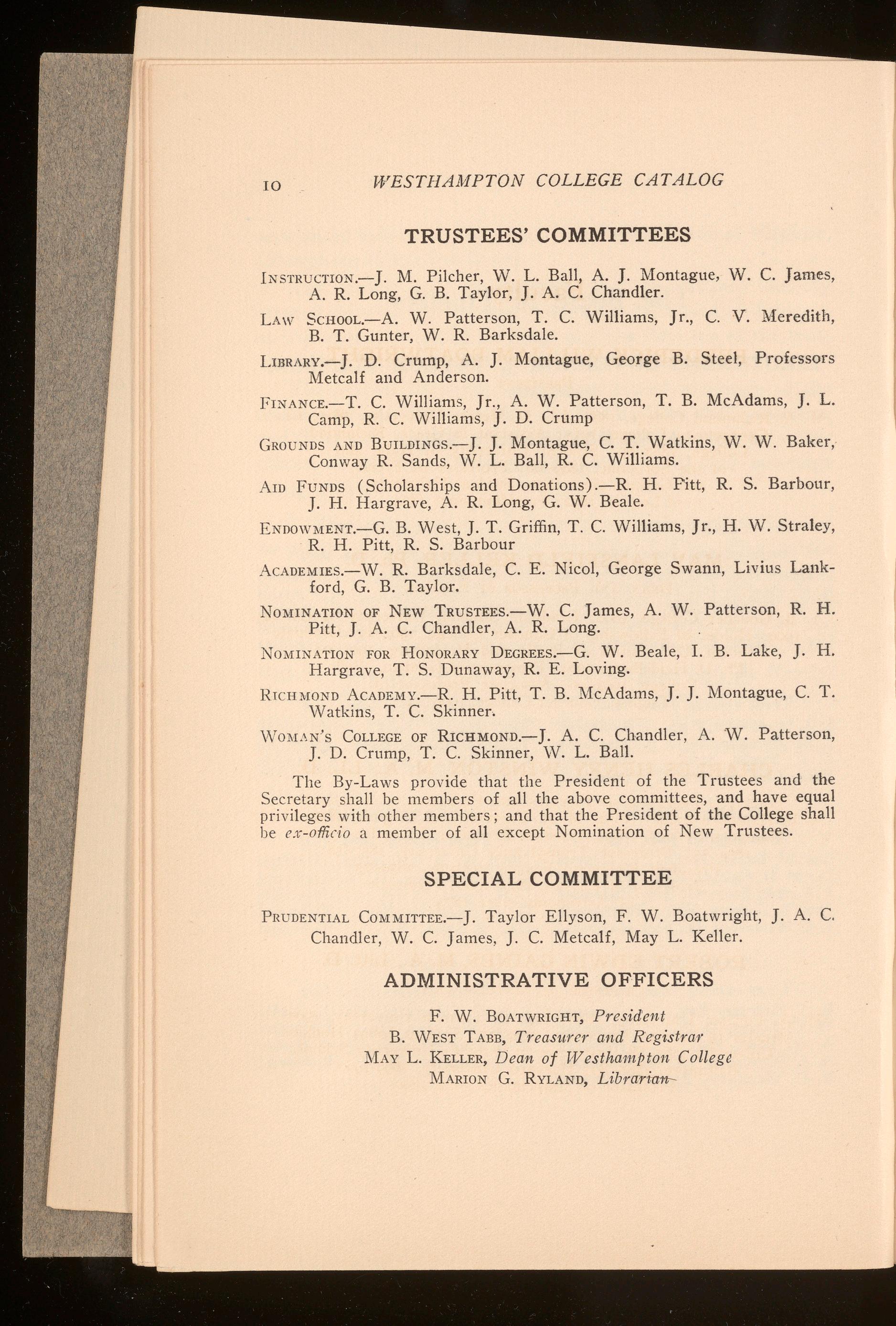
INsrnucnoN.-}. M. Pilcher, W. L. Ball, A. J. Montague, W. C. James, A. R. Long, G. B. Taylor, J. A. C. Chandler.
LAw ScHOOL.-A. W. Patterson, T. C. Williams, Jr., C. V. Meredith, B. T. Gunter, W. R. Barksdale.
LIBRARY.-}. D. Crump, A. J. Montague, George B. Steel, Professors Metcalf and Anderson.
FINANCE.-T. C. Williams, Jr., A. W. Patterson, T. B. McAdams, J. L. Camp, R. C. Williams, J. D. Crump
GROUNDSANDBUILDINGS.-}. J. Montague, C. T. Watkins, W. W. Baker, Conway R. Sands, W. L. Ball, R. C. Williams.
Arn FUNDS (Scholarships and Donations).-R. H. Pitt, R. S. Barbour, J. H. Hargrave, A. R. Long, G. W. Beale.
ENnOWMENT.-G. B. West, J. T. Griffin, T. C. Williams, Jr., H. W. Straley, R. H. Pitt, R. S. Barbour
AcADEMIES.-W. R. Barksdale, C. E. Nicol, George Swann, Livius Lankford, G. B. Taylor.
NOMINATIONOF NEW TRUSTEEs.-W. C. James, A. W. Patterson, R. H. Pitt, J. A. C. Chandler, A. R. Long.
NOMINATIONFOR HONORARYDEGREES.-G. W. Beale, I. B. Lake, J. H. Hargrave, T. S. Dunaway, R. E. Loving.
RrctBIOND AcADEMY.-R. H. Pitt, T. B. McAdams, J. J. Montague, C. T. Watkins, T. C. Skinner.
Wmr.rn's COLLEGEOF RICHMOND.-}. A. C. Chandler, A. ·w. Patterson, J. D. Crump, T. C. Skinner, W. L. Ball.
The By-Laws provide that the President of the Trustees and the Secretary shall be members of all the above committees, and have equal privileges with other members; and that the President of the College shall be ex-officio a member of all except Nomination of New Trustees.
PRUDENTIALCoMMITTEE.-J. Taylor Ellyson, F. W. Boatwright, J. A. C. Chandler, W. C. James, J. C. Metcalf, May L. Keller.
F. W. BOATWRIGHT,President B. WEST TABB, Treasurer and Registrar
MAY L. KELLER,Dean of Westhampton College MARIONG. RYLAND,Librarian-
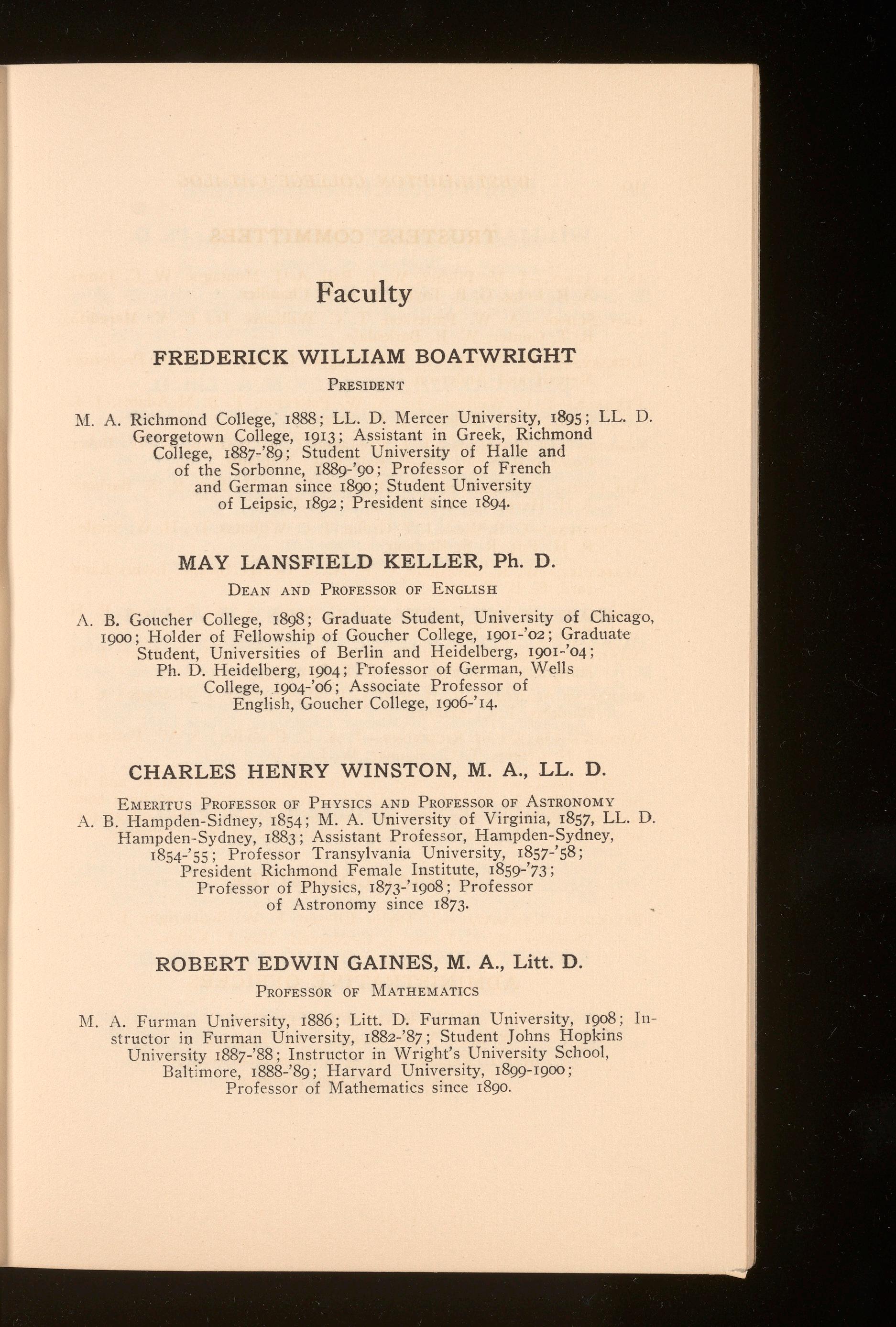
PRESIDENT
:rvf. A. Richmond College, 1888; LL. D. Mercer University, 18g5; LL. D. Georgetown College, 1913; Assistant in Greek, Richmond College, 1887-'89; Student University of Halle and of the Sorbonne, 188g-'90; Profes sor of French and German since 18go; Student University of Leipsic, 1892; President s ince 18g4.
DEAN AND PROFESSOR OF ENGLISH
A. B. Goucher College, 18g8; Graduate Student, University of Chicago, 1900; Holder of Fellowship of Goucher College, 1901-'02; Graduate Student, Universities of Berlin and Heidelberg, 1901-'04; Ph. D. Heidelberg, 1904; Professor of German, Wells College, 1904-'o6; Associate Professor of English, Goucher College, 1906-'14.
EMERITUS PROFESSOR OF PHYSICS AND PROFESSOR OF ASTRONOMY
A. B. Hampden-Sidney, 1854; M. A. University of Virginia, 1857, LL. D. Hampden-Sydney, 1883; Assistant Profes sor, Hampden-Sydney, 1854-'55; Professor Transylvania University, 1857-'58; President Richmond Female In stit ute, 1859-'73; Professor of Physics, 1873-'1908; Professor of Astronomy since 1873.
PROFESSOR OF MATHEMATICS
M. A. Furman U ni versity, 1886; Litt. D. Furman University, 1908; Instructor in Furman University, 1882-'87; Student John s Hopkins University 1887-'88; Instructor in Wright's University School, Balt imore, 1888-'89; Harvard University, 1899-1900; Professor of Mathematics since 1890.

PROFESSOR OF GREEK
M.A. Richmond College, 1886; Ph. D. Johns Hopkins Univ •ersity, 1892; Professor of Greek, Baylor University, 1893-1901; Professor of Greek since 1901.
PROFESSOR OF ENGLISH ON THE JAMES A. BOSTWICK FOUNDATION
M. A. Georgetown College, M. A. Harvard University; Litt. D. Georgetown; Graduate Student, Chicago and Harvard; Professor of Modern Languages, Mercer University; Professor of Latin and later, of English, Georgetown College; Professorial Lecturer, University of Chicago; Professor of English, University of Virginia Summer School, since I9II ; Professor of English ·since 1904.
PROFESSOR OF ROMANCE LANGUAGES
M. A. University of Virginia, 1899; Ph. D. University of Virginia, 1901; Professor of Modern Languages, Wofford College, 1899-1900; Instructor of Teutonic Languag ·es, University of Virginia, 1900-'01; Assistant Professor of Modern Languages, Tulane University, 1901-'02; Associate Professor, 1903-'12; Professor of Romance Languages ~ince 1912.
PROFESSOR OF CHEMISTRY AND GEOLOGY
A. B. Middlebury College, 1900; Ph. D. Johns Hopkins University, 1905; Student of Universities of Leipsic and Berlin, 1906; Professor of Chemistry and Geology since 1900.
PROFESSOR OF PHYSICS
M. A. Richmond College, 1898; Ph. D. Johns Hopkins University, 1904; Professor of Physics and Chemistry, Blackburn College, 1904-'o6; Professor of Physics, Cornell College, 19o6-'07; Associate in Physics, University of Missouri, 1907-'08; Professor of Physics since 1908.

WESTHAMPTON COLLEGE CATALOG 13
DICER. ANDERSON, M. A., Ph. D.
PROFESSOR OJ< HISTORY AND POLITICAL SCIENCE
B. A. Randolph-Macon, rgoo; M. A. Randolph-Macon, r90r; Ph. D. University of Chicago, r9r3; Principal Randolph-Macon Academy, 1903-'05; President of Willie Hansel College (Okla.), r905-'o6; Instructor in History at University of Chicago, 1907-'09; Professor of History and Political Science sin ce 1909.
PROFESSOR OF LATIN
A. B. Johns Hopkins · University, 1892; Ph. D. (ibidem), 1899; Master in Oassics, Sewanee Grammar School, University of the South, Sewanee, Tenn., r902-'o6; Professor of Latin, College of William and Mary, 1900-'rr; Professor of Latin and Greek (ibidem), r9rr1912; Professor of Latin in Summer School of University of Virginia, 1907-'13. Elected Professor of Latin 1912.
ASSOCIATE PROFESSOR OF BIOLOGY
A. B Middlebury College, 1907; Vice-Principal Spring Valley Regent High School, Spring Valley, N. Y., 1907-'08; Rhodes Scholar in Oxford University, 1908-'rr; B. A. 0xon, I9II, M. A., 1904; Professor Natural Science, Shorter College, 19rr'-12; Associate Professor of Biology since 1912.
PROFESSOR OF PHILOSOPHY ON THE JAMES THOMAS, JR., FOUNDATION
B. A. Richmond College, 1907; B. D. Crozer Theological Seminary, 1910; Ph. D. University of Pennsylvania, 19u; Professor of Philosophy, Hampden-Sidney College, 19rr-'13; Profes sor of Philosophy since 1913.
INSTRUCTOR IN DRAWING
B. S. Virginia Military Institute, 1900; S . B. E. E. Massachusetts Institute of Technology, 1903; Instructor in Physics and Electricity Virginia Mechanics Institute sinc •e 1903; Instructor in Drawing since 1904.
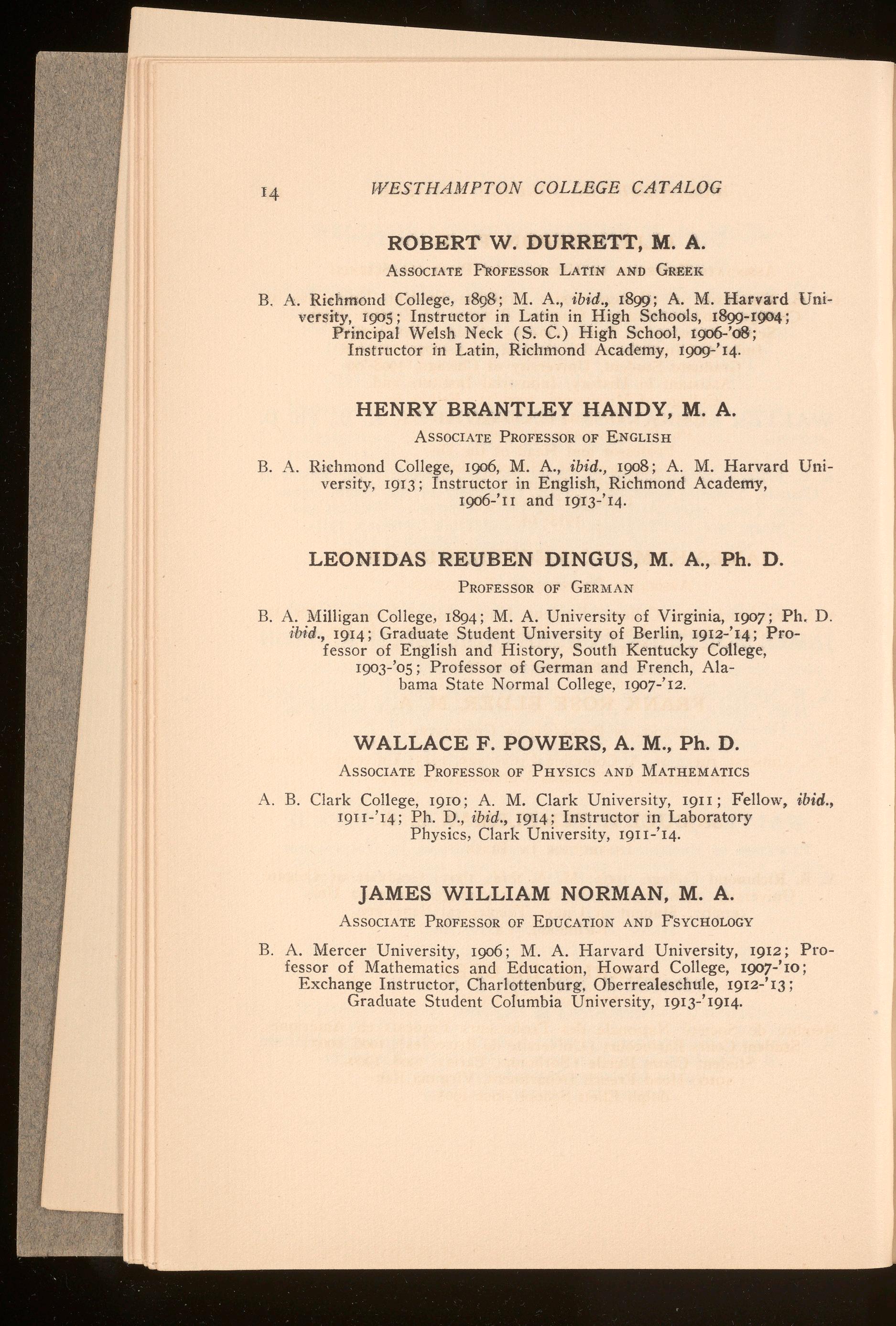
WESTHAMPTON COLLEGE CATALOG
ASSOCIATE f'ROFESSOR LATIN AND GREEK
B. A. Richmond College, 1898; M. A., ibid., 1899; A. M. Harvard University, 1905; Instructor in Latin in High Schools, 1899-1904; Principal Welsh Neck (S. C.) High School, 1go6-'o8; Instructor in Latin, Richmond Academy, 1909-'14.
ASSOCIATE PROFESSOR OF ENGLISH
B. A . Richmond College, 1900, M. A., ibid., 1908; A. M. Harvard University, 1913; Instructor in English, Richmond Academy, 1906-'II and 1913-'14.
PROFESSOR OF GERMAN
B. A. Milligan College, 1894; M. A. University of Virginia, 1907; Ph. D. ibid., 1914; Graduate Student University of Berlin, 1912-'14; Professor of English and History, South Kentucky College, 1903-'05; Professor of German and French, Alabama State Normal College, 1907-'12.
ASSOCIATE PROFESSOR OF PHYSICS AND MATHEMATICS
A. B. Clark College, 1910; A. M. Clark University, 19II; Fellow, ibid ., 19u-'14; Ph. D., ibid., 1914; Instructor in Laboratory Physics , Clark University, 19n-'14.
ASSOCIATE PROFESSOR OF EDUCATION AND PSYCHOLOGY
B. A. Mercer University, 1900; M. A. Harvard University, 1912; Professor of Mathematics and Education, Howard College, 1907-'10; Exchange Instructor, Charlottenburg, Oberrealeschule, 1912-' 13; Graduate Student Columbia University, 1913-'1914.
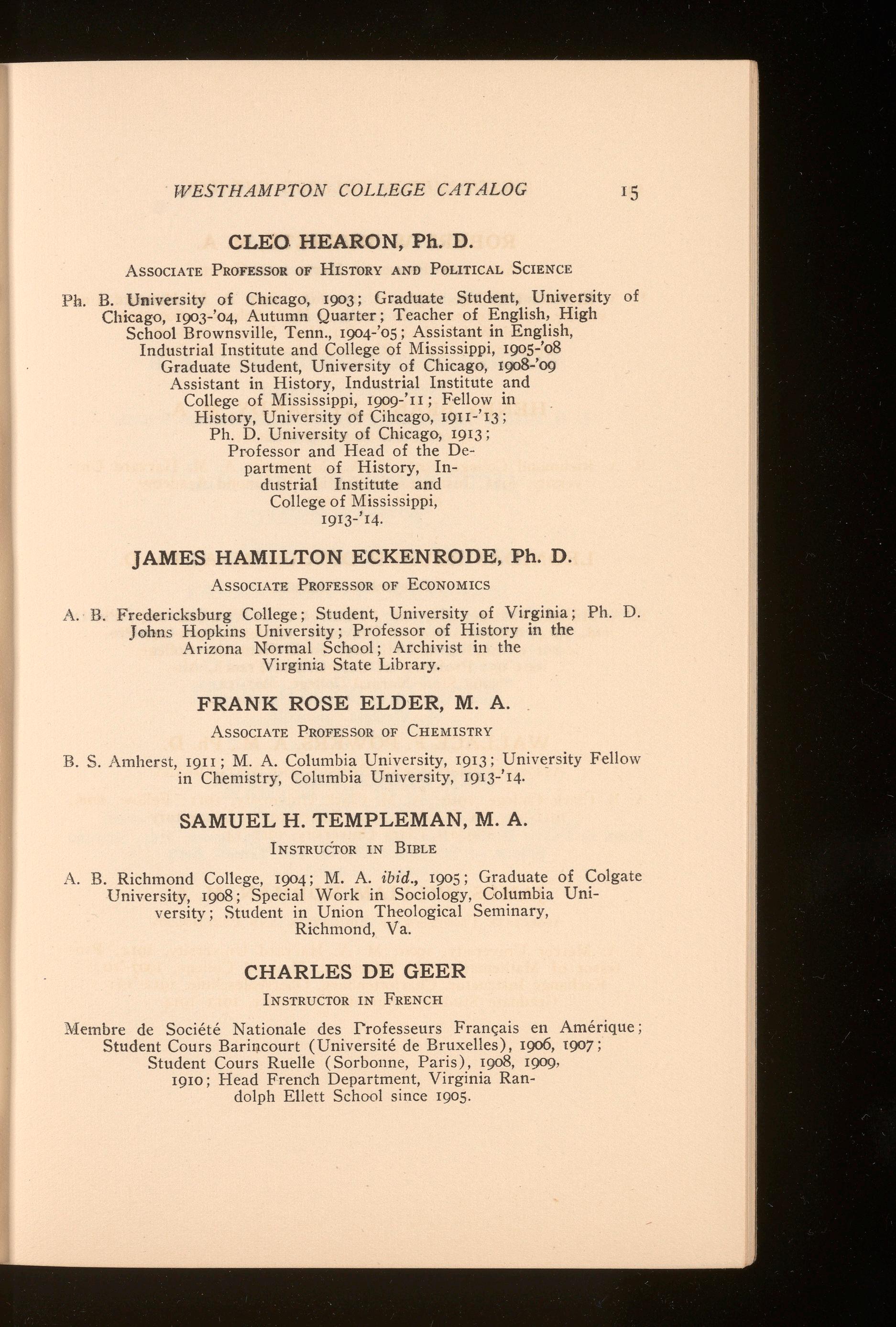
WESTHAMPTON COLLEGE CATALOG IS
ASSOCIATE PROFESSOR OF HISTORY AND POLITICAL SCIENCE
Ph. B. University of Chicago, 1903; Graduate Student, University of Chicago, 1903-'04, Autumn Quarter; Teacher of English, High School Brownsville, Tenn ., 1904-'05; Assistant in English, Industrial Institute and College of Mississippi, 1905-'08 Graduate Student, University of Chicago, 19()8-'09 Assistant in History, Industrial Institute and College of Mississippi, 1909-'II; Fellow in History, University of Cihcago, 19II-'13 ; Ph. D. University of Chicago, 1913; Professor and Head of the D epartment of History, Industrial Institute and College of Mississippi, 1913-'14
ASSOCIATE PROFESSOR OF ECONOMICS
A. B F r edericksburg College; Student, University of Virginia; Ph D. John s Hopkins University; Professor of History in the Arizona Normal School; Archivist in the Virginia State Library.
ASSOCIATE PROFESSOR OF CHEMISTRY
B. S. A mher st , I9II; M A. Columbia Un iversity, 1913; Unive_rsity Fellow in Chemistry, Columbia University , 1913-'14.
INSTRUCTOR IN BIBLE
A B . Richmond College, 1904; M. A . ibid., 1905 ; Graduate of Colgate University, 1908; Special Work in Sociology, Columbia University ; Student in Union Theological Seminary, Richmond, Va .
INSTRUCTOR IN FRENCH
M em bre de Societe Nationale des rrofesseurs Frarn;ais en Amerique ; Student Cours Bari!ilcourt (Universite de Bruxelles), 19()6, 1907; Student Cours Ruelle ( Sorbonne, Paris), rgo8, 1909, 1910; Head French Department, Virginia Randolph Ellett School since 1905.
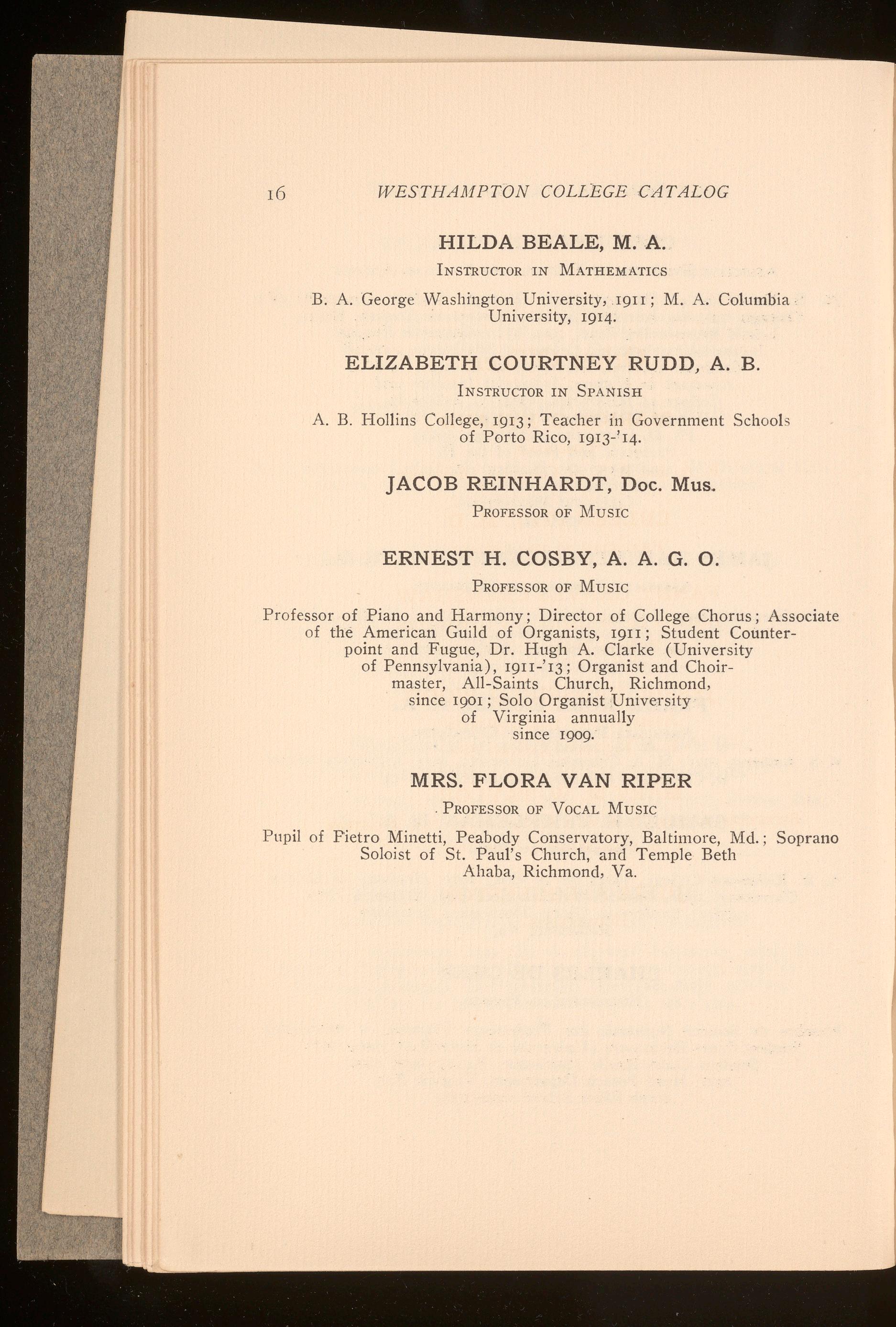
INSTRUCTOR IN MATHEMATICS
B. A. George Washington University, 19rr; M. A. Columbia University, 1914.
INSTRUCTOR IN SPANISH
A. B. Hollins College, 1913; Teacher in Government School s of Porto Rico, 1913-'14.
PROFESSOR OF Musrc
PROFESSOR OF MUSIC
Professor of Piano and Harmony; Director of College Chorus; Associate of the American Guild of Organists, 19rr; Student Counterpoint and Fugue, Dr. Hugh A. Clarke (University of Pennsylvania), 19u-'13; Organist and Choirmaster, All-Saints Church, Richmond, since 1901; Solo Organist University of Virginia annually since 1909.
. PROFESSOR OF VOCAL Musrc
Pupil of Pietro Minetti, Peabody Conservatory, Baltimore, Md.; Soprano Soloist of St. Paul's Church, and Temple Beth Ahaba, Richmond, Va.

LIBRARIAN
B. A. and B. S. of Columbia University.
PHYSICIAN TO THE COLLEGE
DIRECTOR OF ATHLETICS AND GYMNASTICS
A. B Bryn Mawr College, 1912.
ASSISTANT TO THE LIBRARIAN
B. A. Richmond College, 1912
MARY
S E CRETARY TO THE DEAN AND ASSISTANT TO THE REGISTRAJI
A. B. Bryn Mawr College, 19u
JULIA A. EGGLESTON
HOUSEK EEPER

r. COMMITTEEON ENTRANCE-Professor Gaines, Professor Hearon, Professor Olmsted.
2. COMMITTEEoN ADVANCEDSTANDING--Professor Montgomery, Professor Loving, Professor Dingus.
3. COMMITTEEON CURRICULUM-Professor Metcalf, Professor Hearon Professor Gaines.
4. COMMITTEEON STUDENTAcnvITrns-Professor Bingham, Professor Harris, Professor Beale.
5. COMMITTEEON LIBRARY-Professor Eckenrode, Professor Young, Professor Rudd .
6. COMMITTEEON CATALOGUEAND STUDENT PUBLICATIONS-Professor Handy, Professor Stewart, Professor Beale
7. COMMITTEEON SCHEDULEOF CLASSES AND EXERCISES-Professor Durrett, Professor Norman, Professor Dingus.
The President and Dean are e:,;-officio members of all committees.
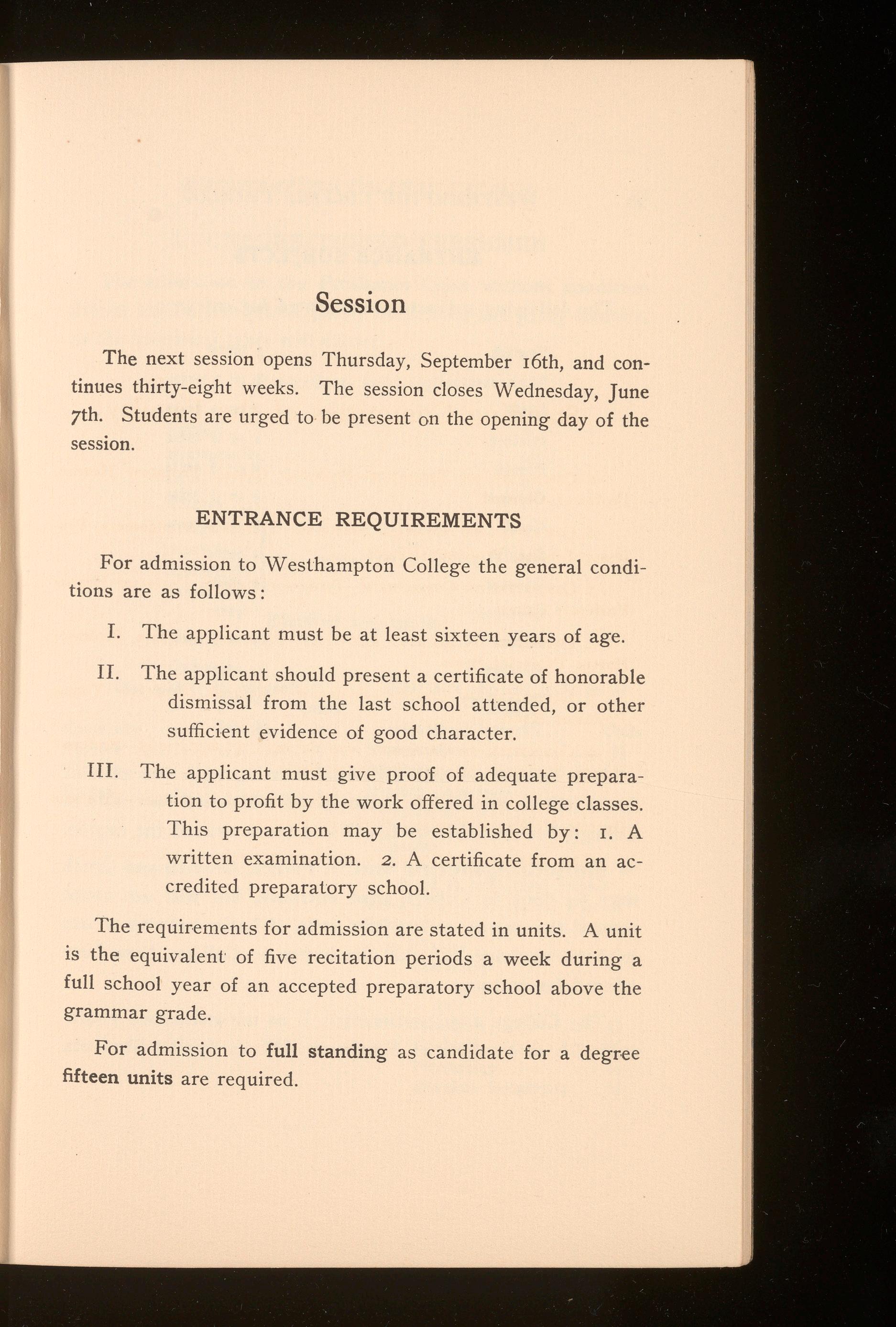
The next session opens Thursday, September 16th, and continues thirty-eight weeks. The session closes Wednesday, June 7th. Students are urged to be present on the opening day of the session.
For admission to Westhampton College the general conditions are as follows :
I. The applicant must be at least sixte -en years of age.
II. The applicant should present a certificate of honorable dismissal from the last school attended, or other sufficient evidence of good character.
III. The applicant must give proof of adequate preparation to profit by the work offered in college classes. This preparation may be established by: I. A written examination. 2. A certificate from an accredited preparatory school.
The requirements for admission are stated in units. A unit 1s the equivalent of five recitation periods a week during a full school year of an accepted preparatory school above the grammar grade.
For admission to full standing as candidate for a degree fifteen units are required.
The following subjects are accepted for entrance:
English . . . . . . . . . 3 units
Mathematic s ..... . ......... 2 or 3 units
... . 2 or 4 units
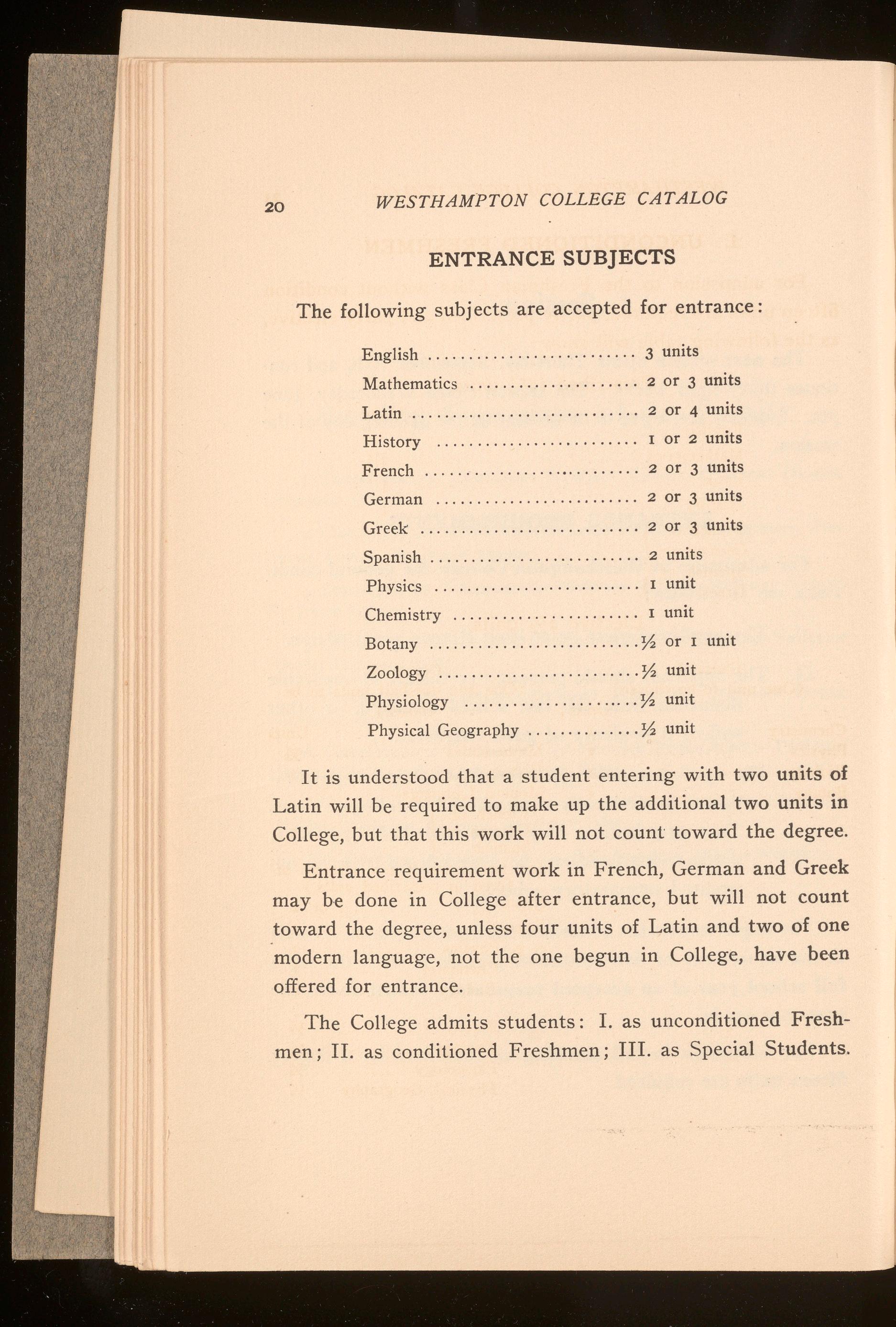
History
French
German
Gr eek
Spanish
I or 2 units
2 or 3 units
2 or 3 units
2 or 3 units
2 unit s Phy sics
I unit Chemistry
Botany
Zoology
Physiology
I unit
..................... ¼ or 1 unit
¼ unit
¼ unit
Physical Geography .. . ¼ unit
It is understood that a student entering with two units of Latin will be required to make up the additional two units in College, but that this work will not count toward the degree. Entrance requirement work in French, German and Greek may be done in College after entrance, but will not count toward the degree, unless four units of Latin and two of one modern language, not the one begun in College, have been offered for entrance .
The College admits students: I. as unconditioned Freshmen; II. as conditioned Freshmen; III. as Special Students
For admission to the Freshman Class without condition fifteen units are required, partly prescribed and party elective, as the following table will show :
Prescribed 12½ units.
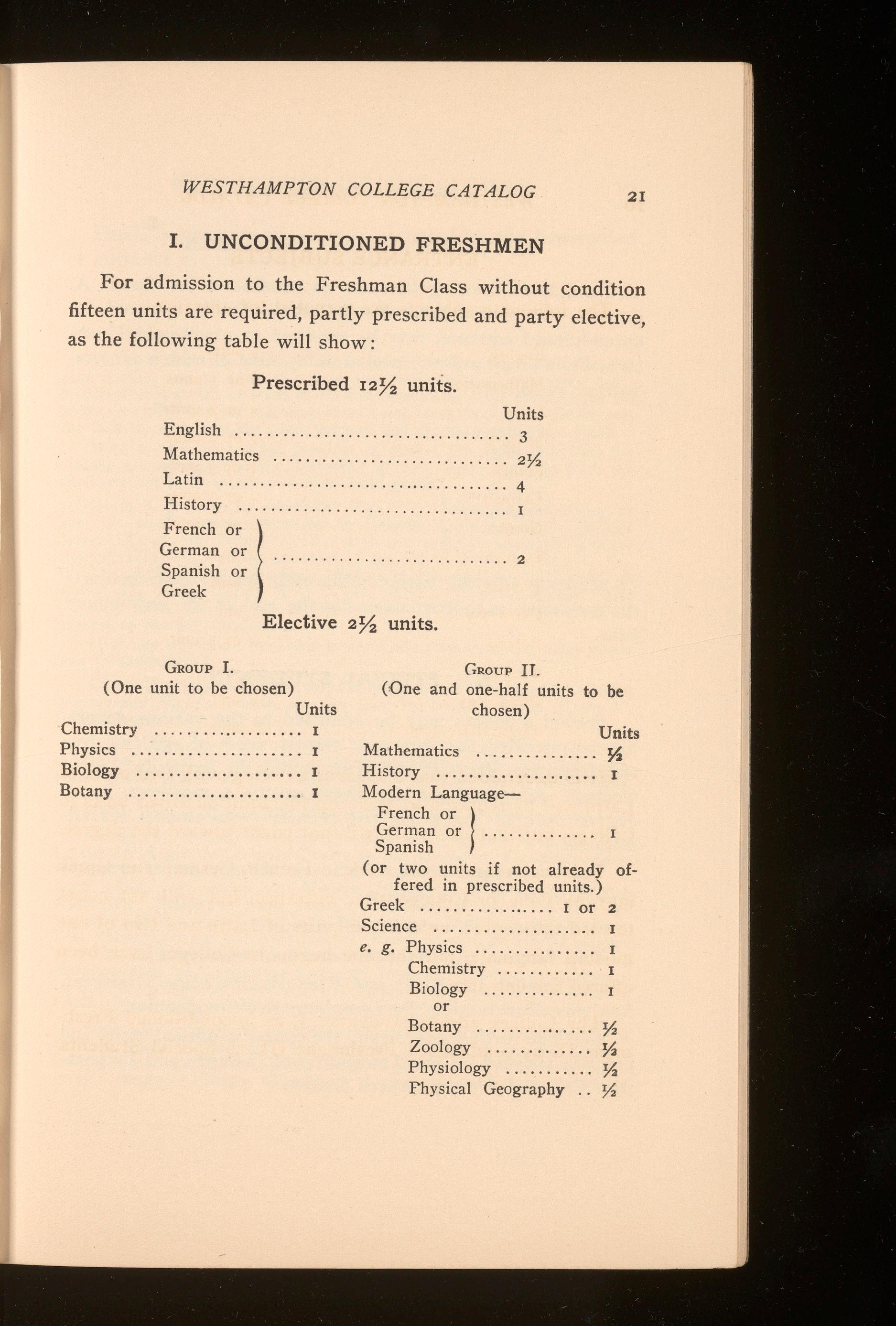
Elective 2½ units. GROUP I. ( One unit to be chosen)
GROUP
(One and one-half units to be chosen)
or two units if not already offered in prescribed units
Candidates desiring to enter as candidates for the B. A. degree, who cannot offer the full fifteen units required for unconditioned entrance, may be admitted as conditioned Freshmen, if they can present twelve units, nine of which are prescribed as follows :
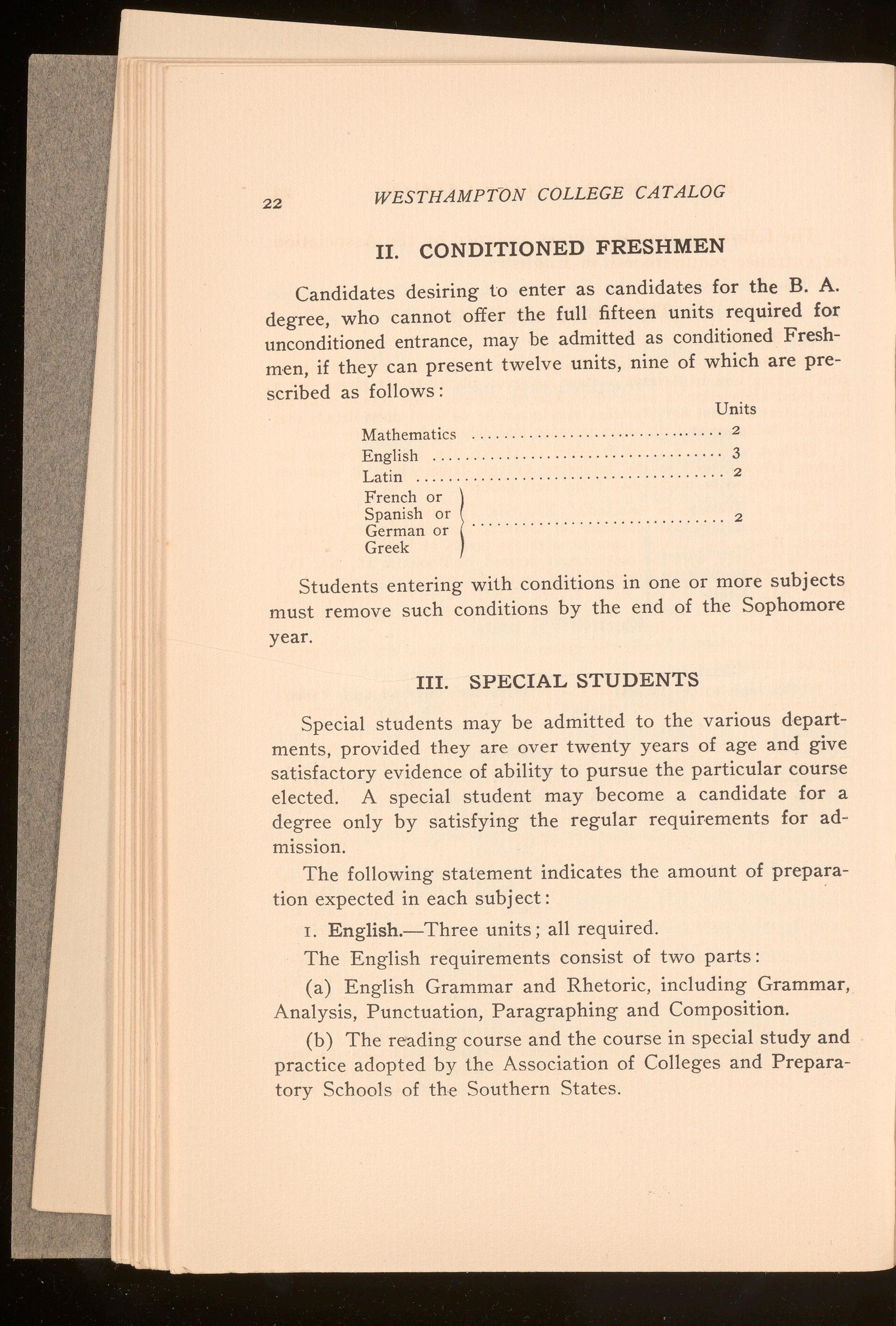
or
or
or
Students entering with conditions in one or more subjects must remove such conditions by the end of the Sophomore year.
Special students may be admitted to the various departments, provided they are over twenty years of age and give satisfactory evidence of ability to pursue the particular cours -e elected. A special student may become a candidate for a degree only by satisfying the regular requirements for admission.
The following statement indicates the amount of preparation expected in each subject:
I. English.-Three units; all required.
The English requirements consist of two parts:
(a) English Grammar and Rhetoric, including Grammar, Analysis, Punctuation, Paragraphing and Composition.
(b) The reading course and the course in special study and practice adopted by the Association of Colleges and Preparatory Schools of th e Southern States.
The following are the courses assigned by the Association for entrance requirements in English:

A. READING.
The aim of this course is to foster in the student the habit of intelligent reading and to develop a taste for good literature, by giving her a first-hand knowledge of some of its best specimens. She should read the books carefully, but her attention should not be so fixed upon details that she fails to appreciate the main purpose and charm of what she reads.
With a view to a great freedom of choice, the books provided for reading are arranged in the following groups, from which at least ten selections are to be made-two from each group:
Group I. (two to be selected). The Old Testatment, comprising at least the chief narrative episodes in Genesis, Exodus, Joshua, Judges, Samuel, Kings, and Daniel together with the books of Ruth and Esther; Homer's Odyssey, with the omission, if desired, of Books I., II., III., IV., V., XV., XVI., XVII.; Homer's Iliad, with the omission, if desired, of Books XL, XIII., XIV., XV., XVII., XXI.; Vergil's Aeneid. The Odyssey, Iliad, and Aeneid should be read in English translations of recognized literary excellence.
(For any selections from this group a selection from any other group may be submitted.)
Group II. (two to be select ed).-Shakespeare's Merchant of Venice, Midsummer Night's Dream, As You Like It, Twelfth Night, Henry V., Julius Caesar.
Group III. ( two to be selected) .-Defoe's Robinson Crusoe, Part I.; Goldsmith's Vicar of Wakefield; Scott's Ivanhoe, or Quentin Durward; Hawthorne's House of the Seven Gables; Dickens' David Copperfield, or Tale of Two Cities; Thackeray's Henry Esmond; Mrs. Gaskell's Cranford; George Eliot's Silas Marner; Stevenson's Treasure Island.
Group IV. (two to be selected).-Bunyan's Pilgrim's Progress, Part I.; the Sir Roger de Coverley Papers in the Spectator; Franklin's Autobiography (condensed); Irving's Sketch Book; Macaulay's Essay on Lord Clive, and Essay on Warren Hastings; Thackeray's English Humorists; Selections from Lincoln, including at lea st the two Inaugurals and Lincoln's Speeches in Independence Hall and at Gettysburg, Last Public Address, Letter to Horace Gr eely, along with a brief memoir or estimate; Parkman's Oregon Trail; Thoreau's Walden, or Huxley's Autobiography, and Selections from Lay Sermons, including the addresses on Improving Natural Knowledge, A Liberal Education, and A Piece of Chalk; Stevenson's Inland Voyage, and Travels with a Donkey.
Group V. (two to be selected).-Palgrave's Golden Treasury (First Series), Books II. and III., with especial attention to Dryden, Collins, Gray, Cowper and Burns; Gray's Elegy in a Country Churchyard; Goldsmith's Deserted Village; Coleridge's Ancient Mariner; Lowell's Vision
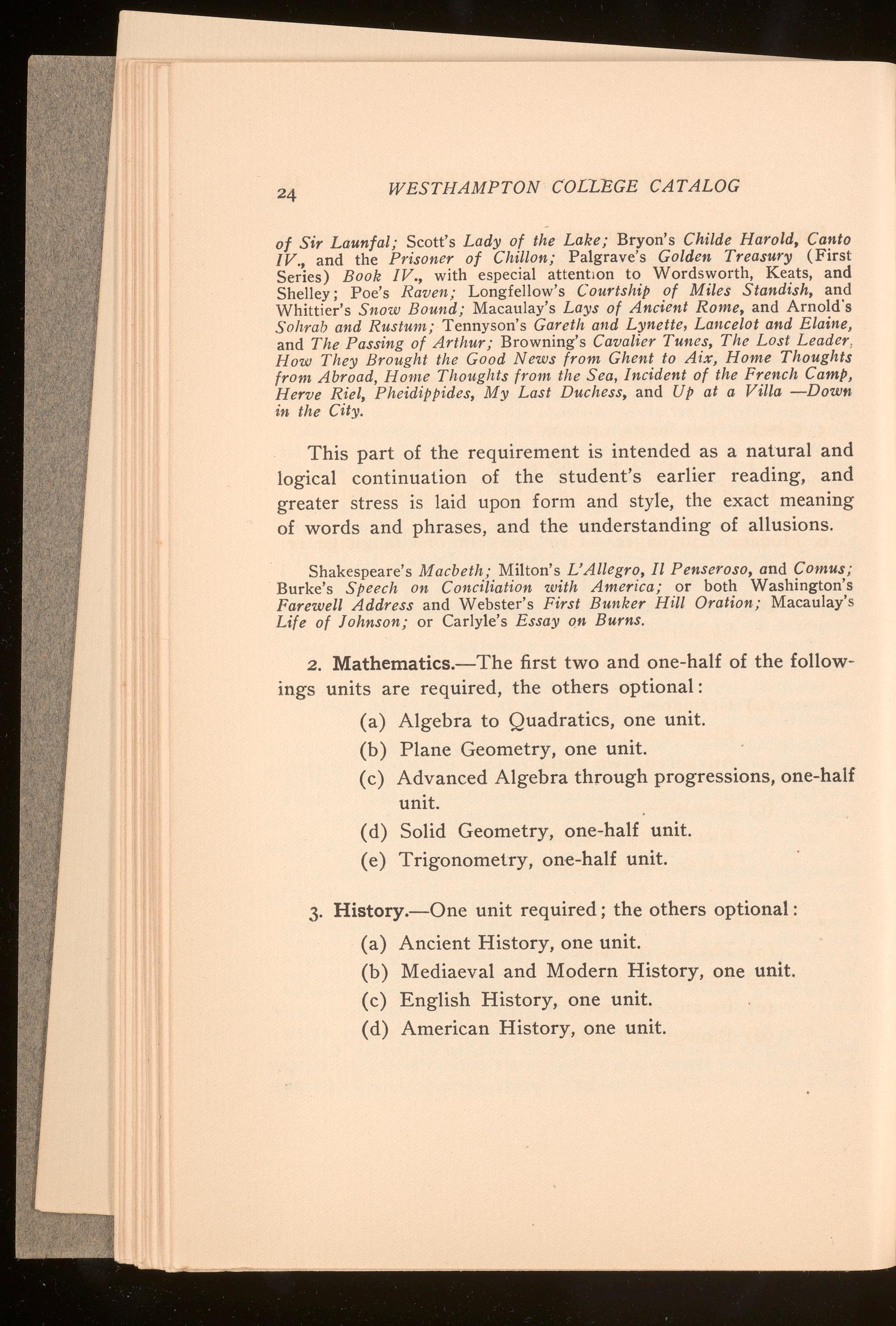
of Sir Laun/al; Scott's Lady of the Lake; Bryon's Childe Harold, Canto IV., and the Prisoner of Chillon; Palgrave's Golden Treasury (First Series) Book IV., with especial attention to Wordsworth, Keats, and Shelley; Poe's Raven; Longfellow's Courtship of Miles Standish, and Whittier's Snow Bound; Macaulay's Lays of Ancient Rome, and Arnold"s Sohrab and Rustum; Tennyson's Gareth and Lynette, Lancelot and Elaine, and The Passing of Arthur; Browning's Cavalier Tunes, The Lost Leader , How They Brought the Good News from Ghent to Aix, Home Thoughts from Abroad, Home Thoi,ghts from the Sea, Incident of the French Camp, Herve Riel, Ph eidippides, My Last Duchess, and Up at a Villa -Down it1 the City.
This part of the requirement is intended as a natural and logical continuation of the student's earlier reading, and greater stress is laid upon form and style, the exact meaning of words and phrases, and the understanding of allusions.
Shakespeare's Macbeth; Milton's L'Allegro, ll Penseroso, and Comus; Burke's Speech on Conciliation with America; or both Washington's Farewell Address and Webster's First Bunker Hill Oration; Macaulay's Life of Johnson; or Carlyle's Essay on Burns.
2. Mathematics.-The first two and one-half of the followmgs units are required, the others optional:
(a) Algebra to Quadratics, one unit.
(b) Plane Geometry, one unit.
( c) Advanced Algebra through progressions, one-half unit.
( d) Solid Geometry, one-half unit.
(e) Trigonometry, one-half unit.
3. History.-One unit required; the others optional:
(a) Ancient History, one unit.
(b) Mediaeval and Modern History, one unit.
( c) English History, one unit.
( d) American History, one unit.
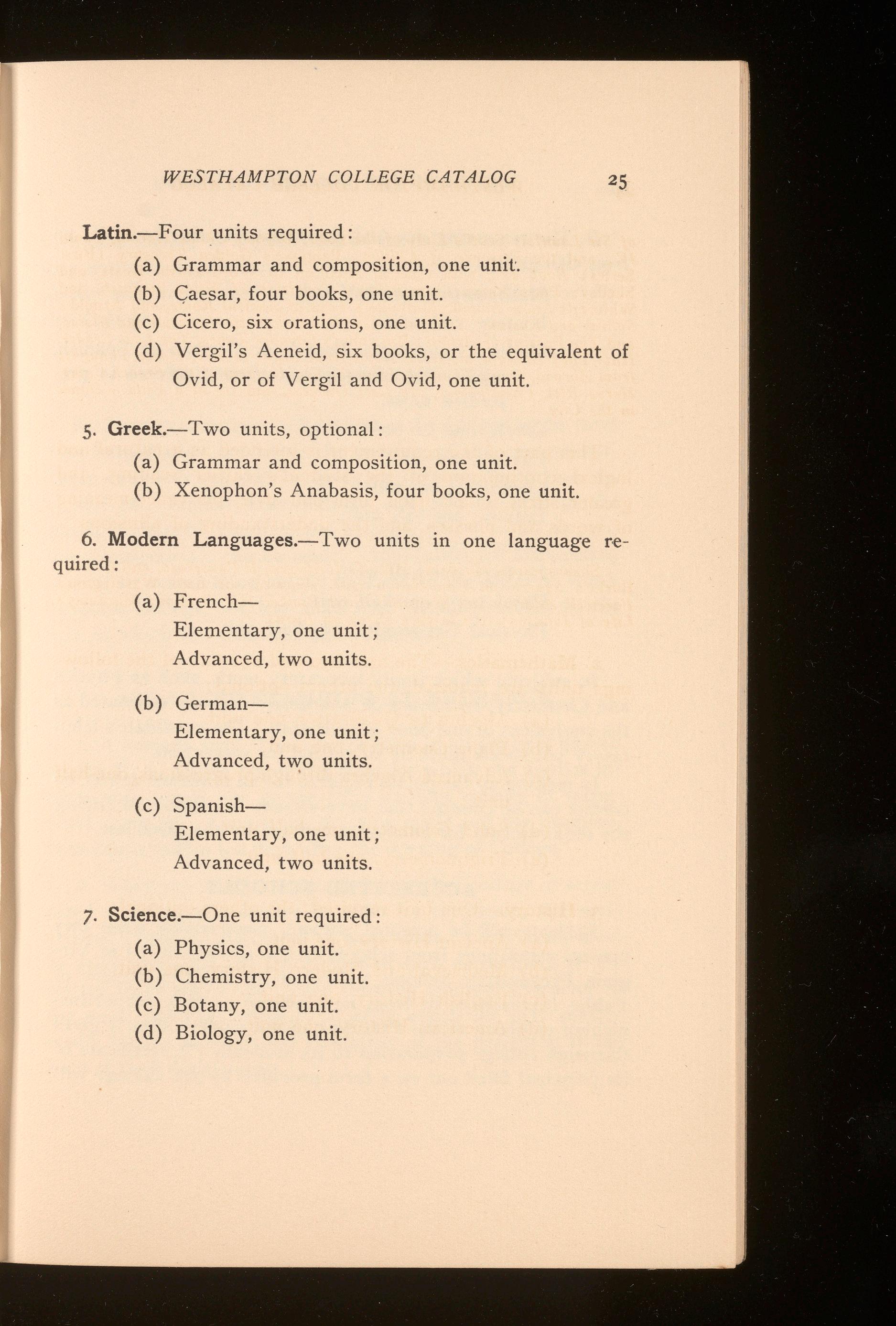
Latin.-Four units required:
(a) Grammar and composition, one unit.
(b) (;aesar, four books, one unit
( c) Cicero, six orations, one unit.
( d) Vergil's Aeneid, six books, or the equivalent of Ovid, or of Vergil and Ovid, one unit.
5. Greek.-Two units, optional:
(a) Grammar and composition, one unit.
(b) Xenophon's Anabasis, four books, one unit.
6 . Modern Languages.-Two units in one language req uired:
(a) FrenchElementary, one unit ; Advanced, two units .
(b) GermanElementary, one unit; Advanced, t"";o units.
(c) SpanishElementary, one unit; Advanced, two units.
7. Science.-One unit required:
(a) Physics, one unit.
(b) Chemistry, one unit.
( c) Botany, one unit.
(d) Biology, one unit.
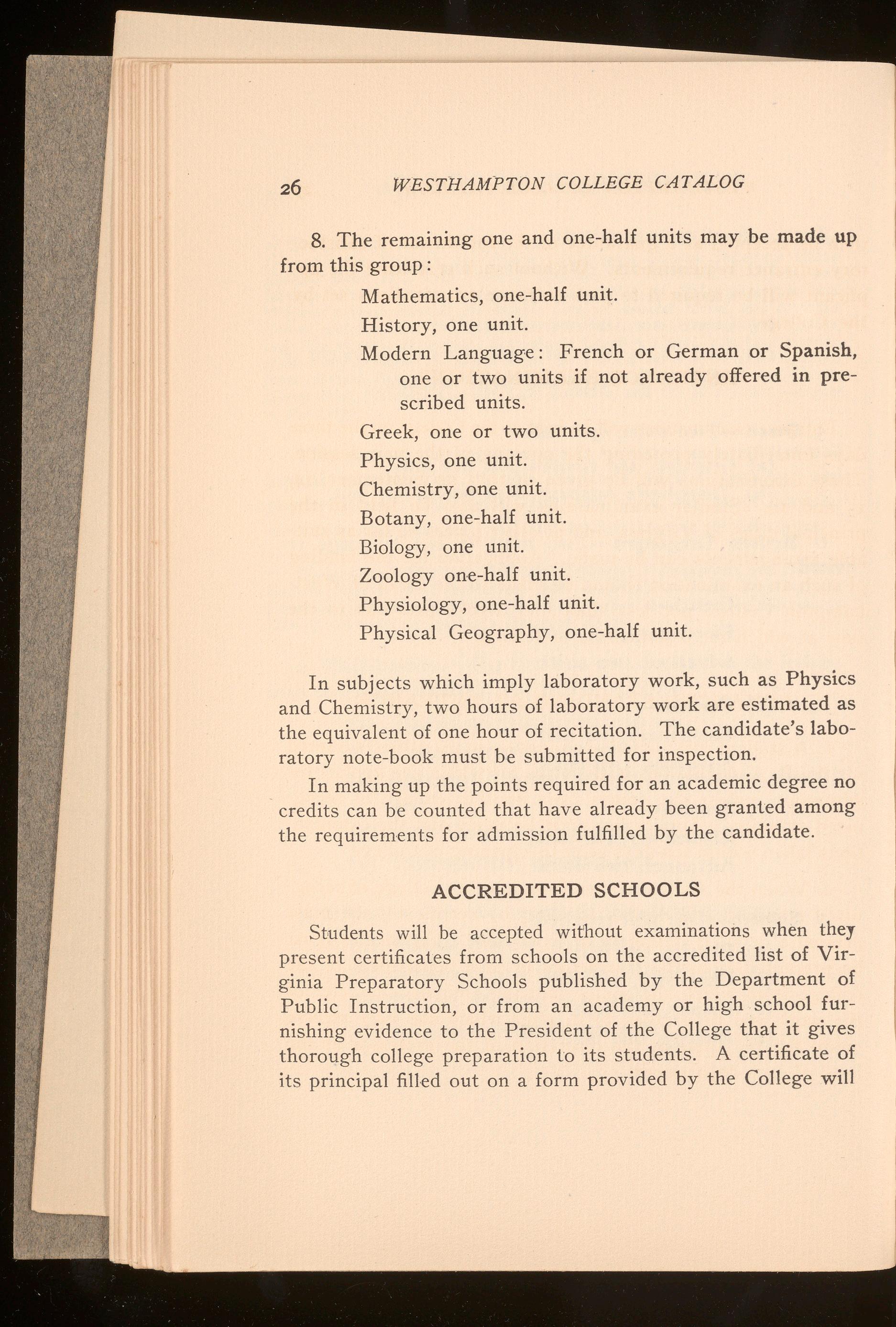
8. The remaining one and one-half units may be made up from this group :
Mathematics, one-half unit.
History, one unit.
Modern Language: French or German or Spanish, one or two units if not already offered in prescribed units.
Greek, one or two units.
Physics, one unit.
Chemistry, one unit.
Botany, one-half unit.
Biology, one unit.
Zoology one-half unit.
Physiology, one-half unit.
Physical Geography, one-half unit.
In subjects which imply laboratory work, such as Physics and Chemistry, two hours of laboratory work are estimated as the equivalent of one hour of recitation. The candidate's laboratory note-book must be submitted for inspection.
In making up the points required for an academic degree no credits can be counted that have already been granted among the requirements for admission fulfilled by the candidate.
Students will be accepted without examinations when they present certificates from schools on the accredited list of Virginia Preparatory Schools published by the Department of Public Instruction, or from an academy or high school furnishing evidence to the President of the College that it gives thorough college preparation to its students. A certificate of its principal fiHed out on a form provided by the College will

then be accepted as a guarantee of the fulfillment of satisfactory entrance requirements. Without such certificate the applicant will be required to pass entrance examinations set by the College.
Entrance examinations will be held at the College on the three days immediately preceding ·the opening of the new session. These examinations will be given in 1915 on September, 14, 15 and 16. Similar examinations will also be held in the principal cities of Virginia, and at other places so far as suitable arrangements can be made. Application for the holding of such an examination should be made to the Dean of Westhampton College not less than four weeks previous to the time at which the examination is desired.
I. A student must stand -examination in all subjects offered for the B A. degree below the class for which she applies for admission, unle s s she comes from another college of recognized standing. Application must be made and the examinations taken within ten days after the opening of College.
2. When the student comes from another college of recogniz ed standing and desires to enter by certificate, she must present a detailed statement of work done. Certificates must b e presented from the instructors in each department of the college from which she comes showing amount, character of the work and time given to it, after which she may receive cre dit for th e sam e at the discretion of the professor at the he ad of each department .

Every applicant for admission, upon arriving at the College, must report promptly to the Dean. If she has been a student at any other college, she should present satisfactory evidence of general good conduct while there. If she comes from an academy or high school, she must bring a certificate from the principal showing what studies she has pursued and what progress she has made.
When the question of preparation for College has been settled affirmatively, she will receive a permit to matriculate, and, upon presentation of this to the Treasurer and Registrar of the College and payment of the required fees, her name will be placed on the rolls. Students who delay their matriculation longer than forty-eight hours after obtaining a permit will be charged an extra fee of $2.00.
PROFESSORMONTGOMERY
Four units of the standard entrance requirements as published in the catalogue are required for entrance to the department. A course is, however, provided for students who lack one year of preparation for the Fres 'hman class. It carries no credits toward a degree, embracing reading in Cicero's Orations and Letters, or equivalent Latin prose; six books of Vergil's Aeneid; Grammar and prose exercise work; Rudiments of Roman Antiquities.
The College courses are as follows:
1.
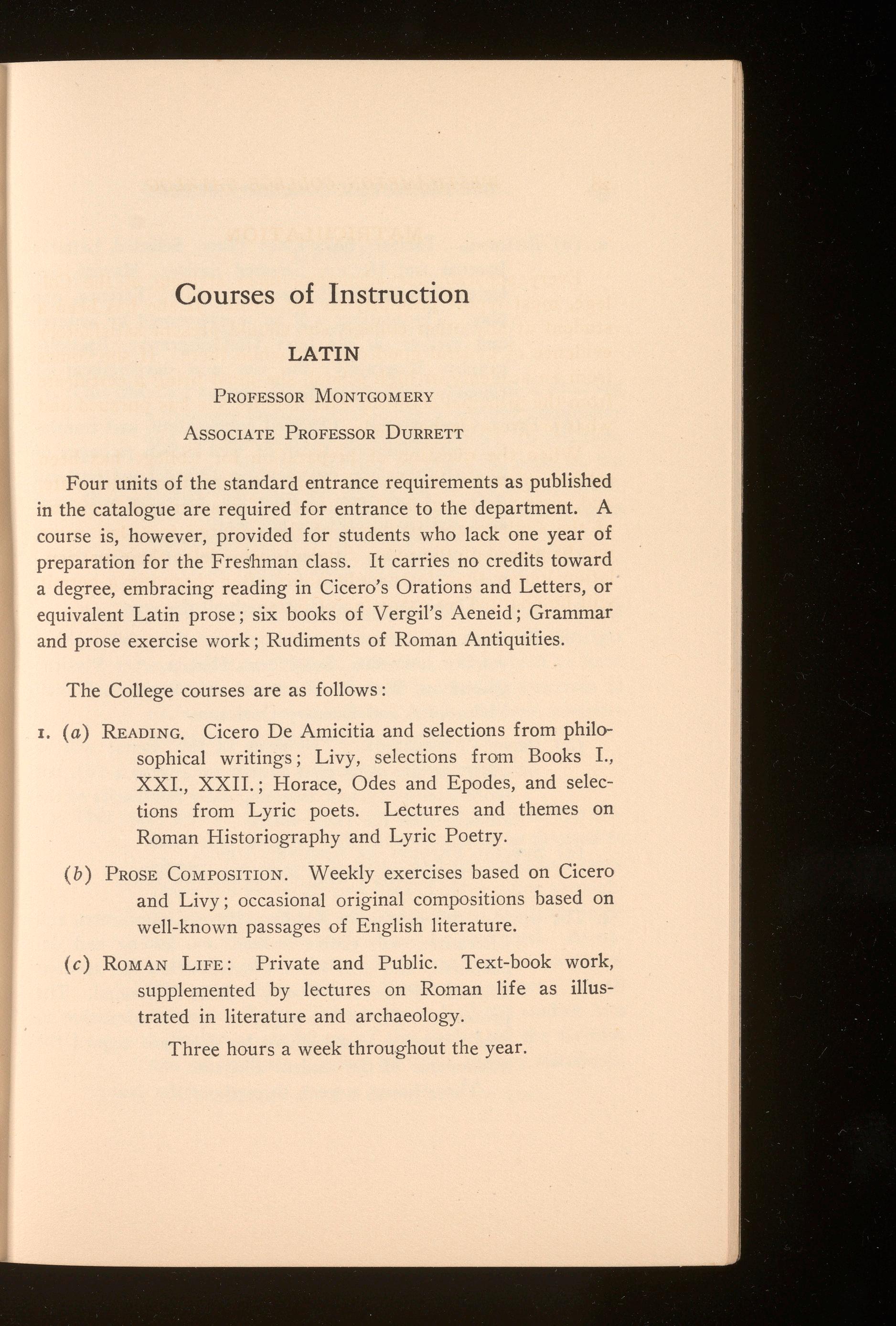
(a) READING. Cicero De Amicitia and selections from philosophical writings; Livy, selections from Books I., XXL, XXII.; Horace, Odes and Epodes, and selections from Lyric poets. Lectures and themes on Roman Historiography and Lyric Poetry.
(b) PROSE COMPOSITION. Weekly exercises based on Cicero and Livy; occasional original compositions based on well-known passages of English literature.
(c) ROMAN LIFE: Private and Public. Text-book work, supplemented by lectures on Roman life as illustrated in literature and archaeology.
Three hours a week throughout the year.
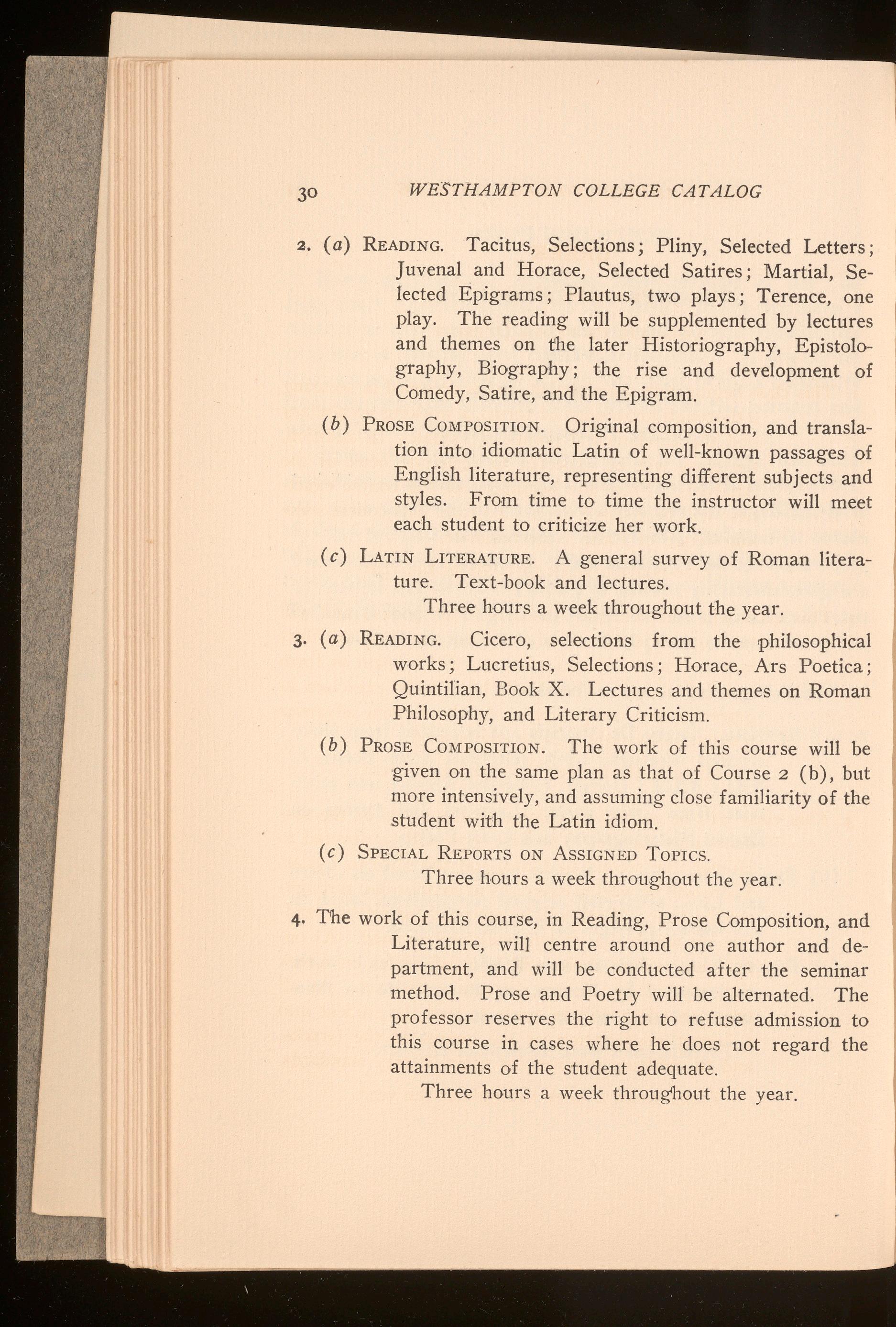
2. (a) READING. Tacitus, Selections; Pliny, Selected Letters; Juvenal and Horace, Selected Satires; Martial, Selected Epigrams; Plautus, two plays; Terence, one play. The reading will be supplemented by lectures and themes on t'he later Historiography, Epistolography, Biography; the rise and development of Comedy, Satire, and the Epigram.
( b) PROSECOMPOSITION . Original composition, and translation into idiomatic Latin of well-known passages of English literature, representing different subjects and styles. From time to time the instructor will meet each student to criticize her work.
(c) LATIN LITERATURE. A general survey of Roman literature. Text-book and lectures.
Three hours a week throughout the year.
3. (a) READING. Cicero, selections from the philosophical works; Lucretius, Selections ; Horace, Ars Poetica; Quintilian, Book X. Lectures and themes on Roman Philosophy, and Literary Criticism.
( b) PROSE COMPOSITION. The work of this course will be ·given on the same plan as that of Course 2 (b), but more intensively, and as suming clo se familiarity of the .student with the Latin idiom.
(c) SPECIALREPORTSON AssIGNED TOPICS.
Three hours a week throughout the year.
4. The work of this course, in Reading, Prose Composition, and Literature, will centre around one author and department, and will be conducted after the seminar method. Prose and Poetry will be alternated. The professor reserves the right to refuse admission to this course in cases where he does not regard the attainments of the student adequate.
Three hours a week throughout the year.
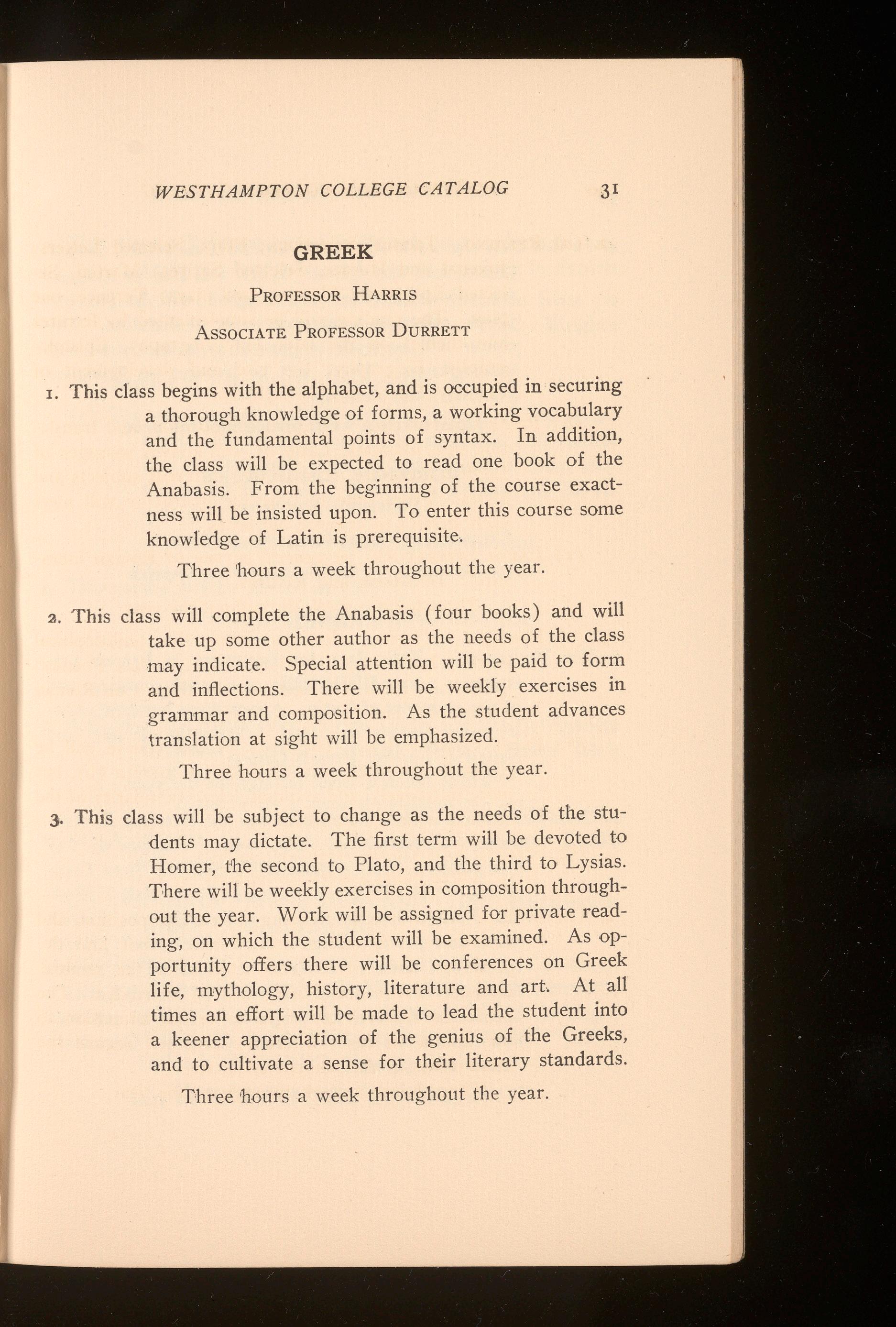
PROFESSOR HARRIS
ASSOCIATE
PROFESSOR DURRETT
1. This class begins with the alphabet, and is occupied in securing a thorough knowledge of forms, a working vocabulary and the fundamental points of syntax. In addition, the class will be expected to read one book of the Anabasis. From the beginning of the course exactness will be insisted upon. To enter this course some knowledge of Latin is prerequisite.
Three 'hours a week throughout the year.
2. This class will complete the Anabasis ( four books) and will take up some other author as the needs of the class may indicate. Special attention will be paid to form and inflections. There will be weekly exercises in grammar and composition. As the student advances translation at sight will be emphasized.
Three hDurs a week throughout the year.
3. This class will be subject to change as the needs of the students may dictate. The first term will be devoted to Homer, t'he second to Plato, and the third to Lysias. There will be weefly exercises in composition throughout the year. Work will be assigned for private reading, on which the student will be examined. As opportunity offers there will be conferences on Greek life, mythology, history, literature and art. At all times an effort will be made to lead the student into a keener appreciation of the genius of the Greeks, and to cultivate a sense for their literary standards.
Three 'hDurs a week throughout the year.
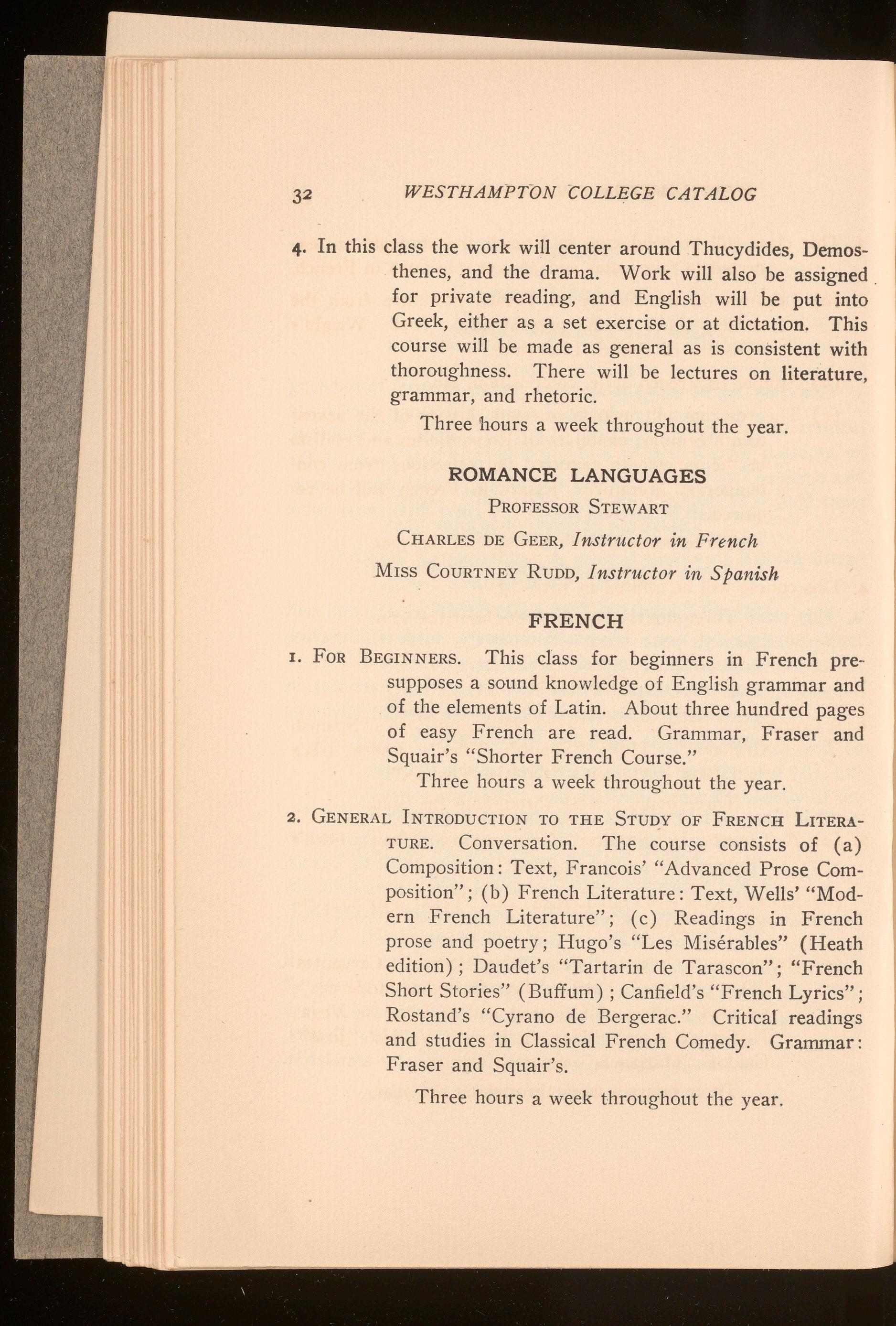
4. In this class the work will center around Thucydides, Demosthenes, and the drama. Work will also be assigned for private reading, and English will be put into Greek, either as a set exercise or at dictation. This course will be made as general as is consistent with thoroughness. There will be lectures on literature, grammar, and rhetoric.
Three hours a week throughout the year.
PROFESSORSTEWART
CHARLESDE GEER, Instructor in French
MISS CouRTNEYRuDD, Instructor in Spanish
1. FoR BEGINNERS. This class for beginners in French presupposes a sound knowledge of English grammar and of the elements of Latin. About three hundred pages of easy French are read. Grammar, Fraser and Squair's "Shorter French Course."
Three hours a week throughout the year.
2. GENERALINTRODUCTIONTO THE STUD_YOF FRENCH LITERATURE. Conversation. The course consists of (a) Composition: Text, Francois' "Advanced Prose Composition"; (b) French Literature: Text, Wells' "Modern French Literature"; ( c) Readings in French prose and poetry; Hugo's "Les Miserables" (Heath edition) ; Daudet's "Tartarin de Tarascon"; "French Short Stories" (Buffum); Canfield's "French Lyrics"; Rostand's "Cyrano de Bergerac." Critical readings and studies in Classical French Comedy. Grammar: Fraser and Squair's.
Three hours a week throughout the year.
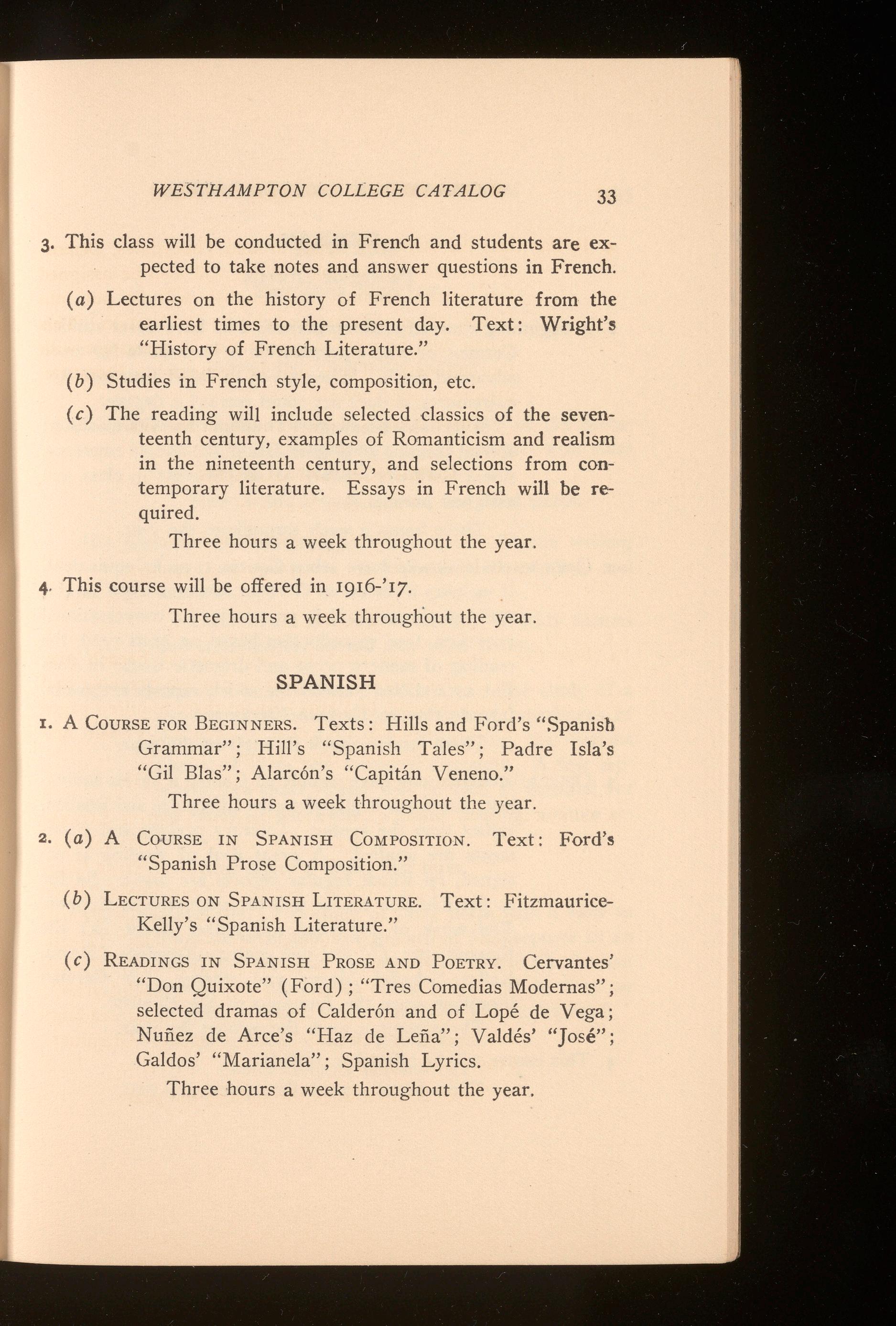
3. This class will be conducted in French and students are expected to take notes and answer questions in French.
(a) Lectures on the history of French literature from the earliest times to the present day. Text: Wright's "History of French Literature."
(b) Studies in French style, composition, etc.
( c) The reading will include selected classics of the seventeenth century, examples of Romanticism and realism in the nineteenth century, and selections from contemporary literature. Essays in French will be required.
Three hours a week throughout the year.
4. This course will be offered in 1916-'17.
Three hours a week throughout the year.
I. A CouRSE FORBEGINNERS. Texts: Hills and Ford's "Spanish Grammar"; Hill's "Spanish Tales"; Padre Isla's "Gil Blas"; Alarc6n's "Capitan Veneno."
Three hours a week throughout the year.
2. (a) A CouRSE IN SPANISH COMPOSITION.Text: Ford's "Spanish Prose Composition."
( b) LECTURESON SPANISHLITERATURE.Text: FitzmauriceKelly's "Spanish Literature."
(c) READINGSIN SPANISH PROSEAND POETRY. Cervantes' "Don Quixote" (Ford); "Tres Comedias Modernas"; selected dramas of Calderon and of Lope de Vega; Nunez de Arce's "Haz de Lena"; Valdes' "Jose"; Galdos' "Marianela"; Spanish Lyrics.
Three hours a week throughout the year.
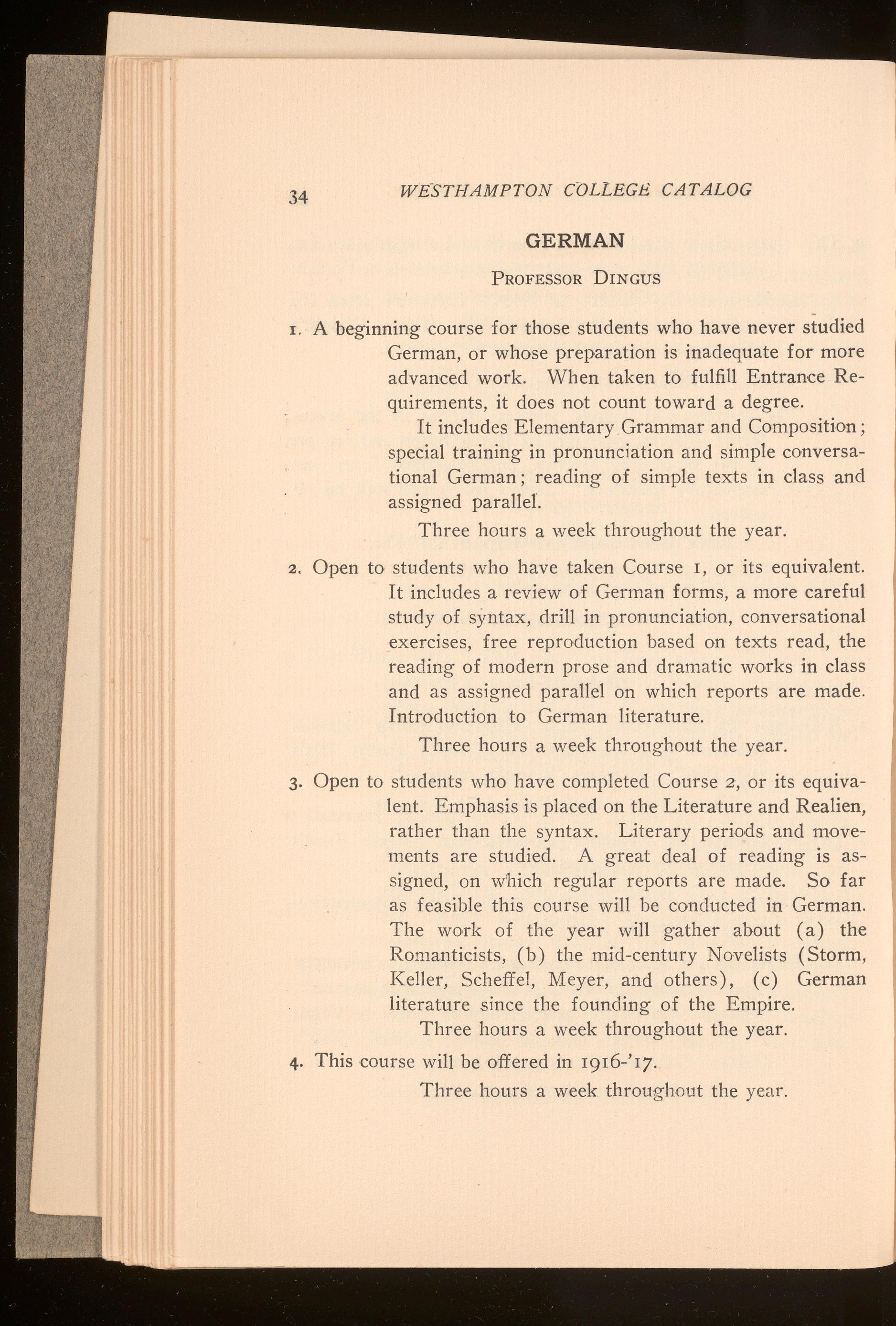
1. A beginning course for those students who have never studied German, or whose preparation is inadequate for more advanced work. When taken to fulfill Entrance Requirements, it does not count toward a degree. It includes Elementary Grammar and Composition; special training in pronunciation and simple conversational German; reading of simple texts in class and assigned parallel.
Three hours a week throughout the year.
2. Open to students who have taken Course 1, or its equivalent. It includes a review of German forms, a more careful study of syntax, drill in pronunciation, conversational exercises, free reproduction based on texts read, the reading of modern prose and dramatic works in class and as assigned parallel on which reports are made. Introduction to German literature.
Three hours a week throughout the year.
3. Open to students who have completed Course 2, or its equivalent. Emphasis is placed on the Literature and Realien, rather than the syntax. Literary periods and movements are studied. A great deal of reading is assigned, on w'hich regular reports are made. So far as feasible this course will be conducted in German.
The work of the year will gather about (a) the Romanticists, (b) the mid-century Novelists ( Storm, Keller, Scheffel, Meyer, and others), ( c) German literature since the founding of the Empire.
Three hours a week throughout the year.
4. This course will be offered in 1916-'17.
Three hours a week throughout the year.
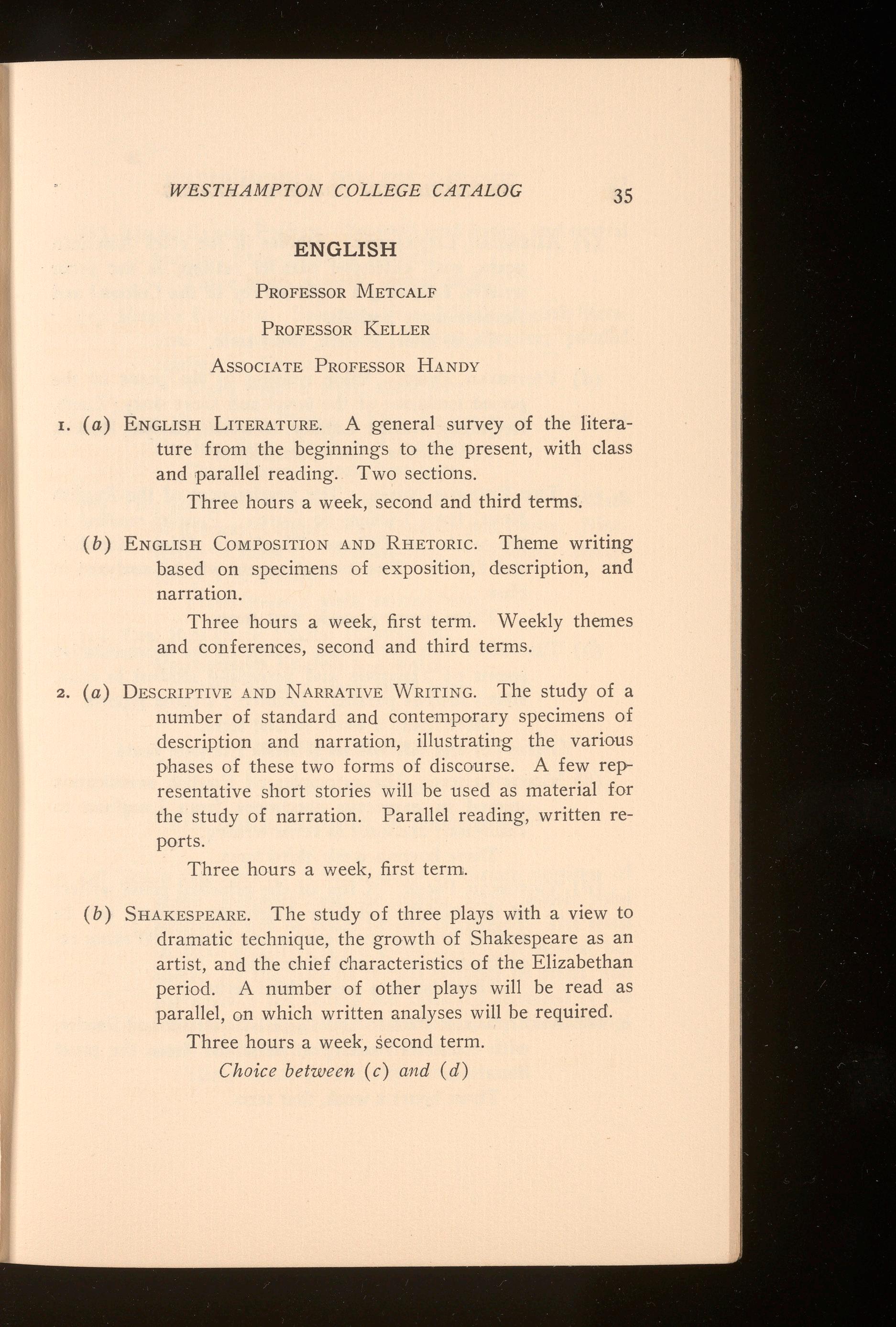
WESTHAMPTON COLLEGE CATALOG
ENGLISH
PROFESSORMETCALF
PROFESSORKELLER
ASSOCIATEPROFESSORHANDY
1. (a) ENGLISH LITERATURE. A general survey of the literature from the beginnings to the present, with class and parallel reading. Two sections.
Three hours a week, second and third terms.
( b) ENGLISH COMPOSITIONAND RHETORIC. Theme writing based on specimens of exposition, description, and narration.
Three hours a week, first term. Weekly themes and conferences, second and third terms.
2. (a) DESCRIPTIVEAND NARRATIVEWRITING. The study of a number of standard and contemporary specimens of description and narration, illustrating the various phases of these two forms of discourse. A few representative short stories will be used as material for the study of narration. Parallel reading, written reports.
Three hours a week, first term.
( b) SHAKESPEARE. The study of three plays with a view to dramatic technique, the growth of Shakespeare as an artist, and the chief characteristics of the Elizabethan period. A number of other plays will be read as parallel, on which written analyses will be required.
Three hours a week, second term.
Choice between (c) and (d)
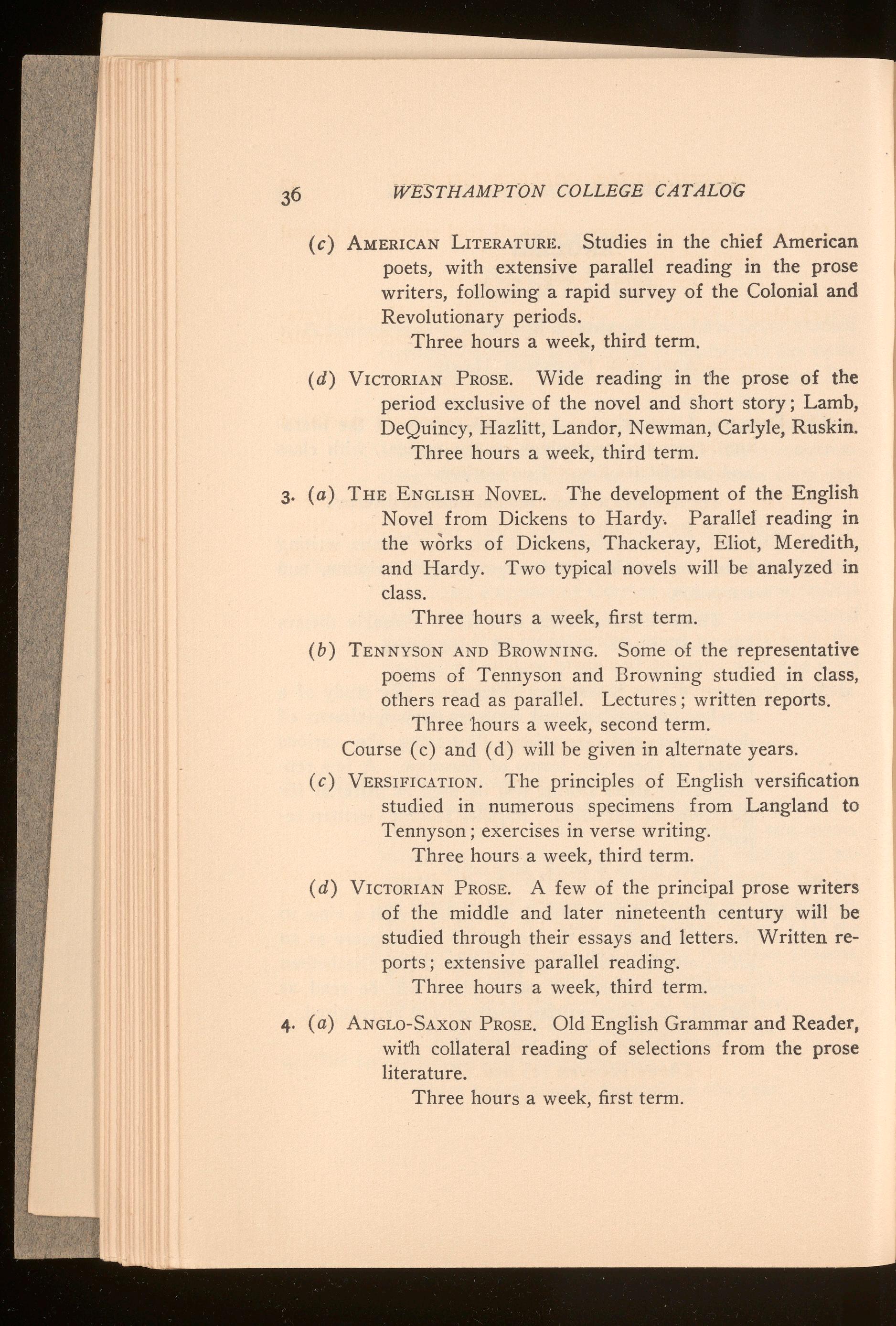
WESTHAMPTON COLLEGE CATAroc;
(c) AMERICANLITERATURE. Studies in the chief American poets, with extensive parallel reading in the prose writers, following a rapid survey of the Colonial and Revolutionary periods.
Three hours a week, third term.
( d) VICTORIANPROSE. Wide reading in the prose of the period exclusive of the novel and short story; Lamb, DeQuincy, Hazlitt, Landor, Newman, Carlyle, Ruskin.
Three hours a week, third term.
3. (a) THE ENGLISH NOVEL. The development of the English Novel from Dickens to Hardy, Parallel reading in the works of Dickens, Thackeray, Eliot, Meredith, and Hardy. Two typical novels will be analyzed in class.
Three hours a week, first term.
( b) TENNYSONAND BROWNING. Some of the representative poems of Tennyson and Browning studied in class, others read as parallel. Lectures ; written reports.
Three hours a week, second term.
Course ( c) and ( d) will be given in alternate years
( c) VERSIFICATION.The principles of English versification studied in numerous specimens from Langland to Tennyson; exercises in verse writing .
Three hours a week, third term.
( d) VICTORIANPROSE. A few of the principal prose writers of the middle and later nineteenth century will be studied through their essays and letters. Written reports; extensive parallel reading
Three hours a week, third term.
4. (a) ANGLO-SAXONPROSE. Old English Grammar and Reader, wit'h collateral reading of selections from the prose literature.
Three hours a week, first term.
( b) ANGLO-SAXONPOETRY. Beowulf read entire, and several hundred lines critically studied.
Three hours a week, second term.
(c) MIDDLEENGLISH. Selections from Middle English literature. Emerson's Middle English Reader; parallel reading in Chaucer.
Three hours a week, third term.
5. (a) THE CLASSICALPERIOD. The characteristic works of Dryden, Pope, Swift, and Johnson.
Three hours a week, first term.
( b) THE ROMANTICPERIOD. Eighteenth Century: The poems of Ramsay, Collins, Gray, Cowper, and Burns. Nineteenth Century: Wordsworth, Coleridge, Byron, Keats, and Shelley.
Three hours a week, second term.
(c) THE ROMANTICPERIOD (Continued). Prerequisites English I, 2 and 3.
Three hours a week, third term.
PROFESSORGAiNES

I. ( a) SOLID GEOMETRY.A brief study of certain portions of plane geometry will be made, after which solid geometry will be taken up and completed. The work in plane geometry is not given merely for review, but rather for the sake of certain methods of proof, and particularly for calling the student's attention to the interrelation of groups of theorems, and the development of the subject as a whole.
Three hours a week, first term.

( b) COLLEGEALGEBRA.A course designed to follow the work of a good high school, beginning with quadratic equations, and including such subjects as the progressions, permutations and combinations, mathematical induction, binominal theorem, inequalities, logarithms, theory of equations, and infinite series .
Three hours a week, second term.
(c) PLANE TRIGONOMETRY.The subject is approached from tfie practical side, problems being solved at first by graphical methods, and afterwards computed by means of trigonometrical formulas and mathematical tables. After the interest of the student is thus secured, the remainder of the time is devoted to the development of analytical trigonometry.
Three hours a week, third term .
2. ~a) ANALYTICALGEOMETRY . Elementary course . Systems of co-ordinates with various illustrations of the use of graphical methods, the constructi on and discussion of loci, a detailed study of the straight line and circle, and of the simpler properties of the parabola, ellipse , and hyperbola
Three hours a week, first term.
( b) DIFFERENTIALCALCULus In this course th e student is not only given much practice in differentiating the ordinary functions, but emphasis is la id upon getting a clear conception of the meaning and purpose of the calculus. The method is then applied to questions of maxima and minima, tangents and normals, inflexions, assymptotes, curve tracing, and the expansion of functions in series.
Three hours a week, second term.

( c) INTEGRALCALCULUS. An elementary course, but one in which care is taken to lay the foundations securely, and prepare the way for the more advanced work of the following year. During the course the method of integration is applied to a sufficient variety of problems to suggest to the student its wide range of usefulness.
Three hours a week, third term.
3. (a) ANALYTICALGEOMETRY.An advanced course designed to follow Course 2 (a).
Three hours a week, first term.
( b) DIFFERENTIALCALCULUS. An advanced course which presupposes the completion of Course 2 (b) or its equivalent.
Three hours a week, second term.
(c) INTEGRALCALCULUS. Advanced course following Course 2 ( c).
Three hours a week, third term.
4. The work of this course will vary somewhat from year to year. Lecture courses will be given on one or more of the following subjects: Infinite series and products, analytical mechanics, differential equations , an introduction to the theory of functions.
PROFESSORLOVING
ASSOCIATEPROFESSORPOWERS
1. (a) ELEMENTARYGENERALPHYSICS. This course covers in an elementary way the fundamental principles of Physics, including Mechanics, Properties of Matter.
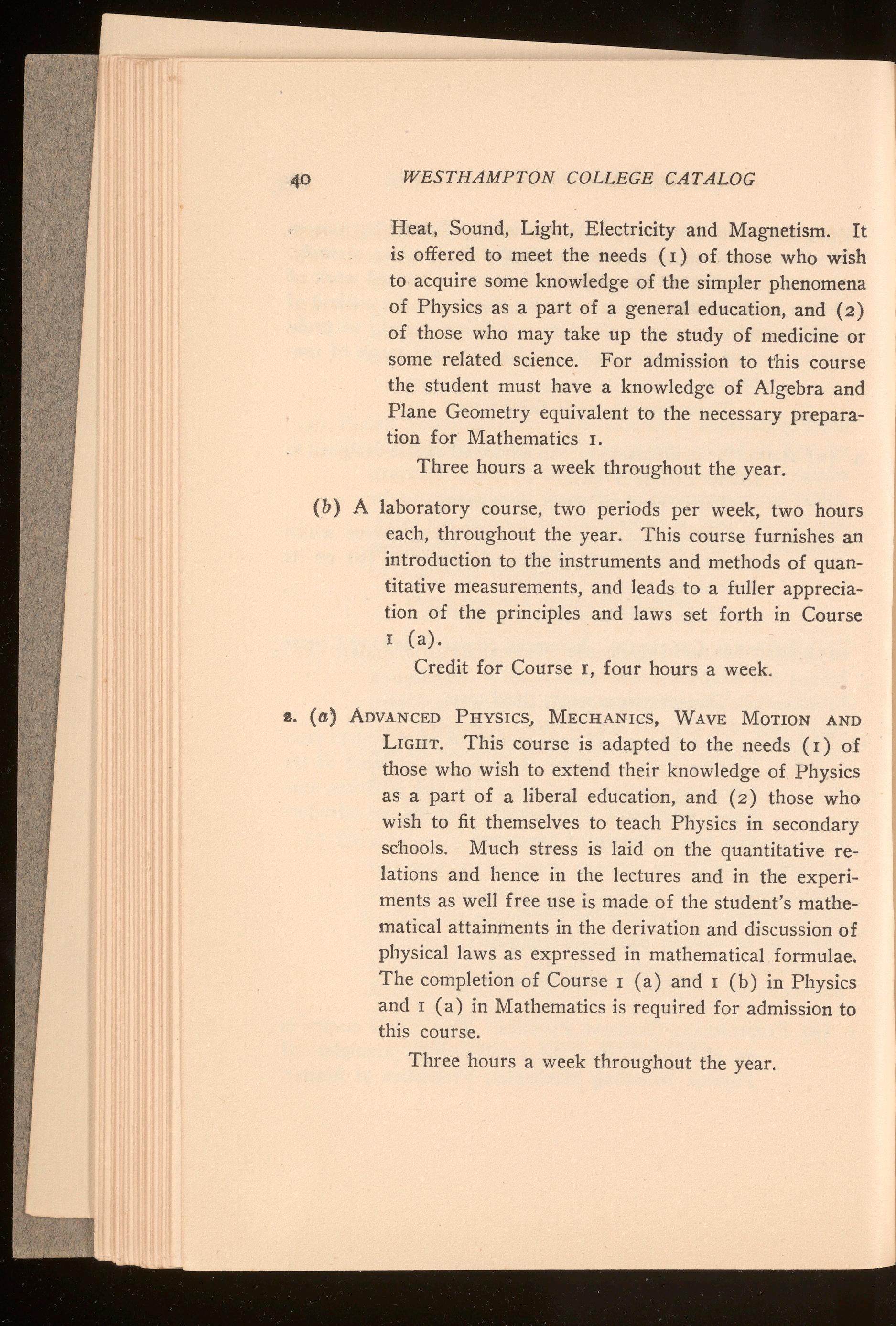
Heat, Sound, Light, Electricity and Magnetism. It is offered to meet the needs ( r) of those who wish to acquire some knowledge of the simpler phenomena of Physics as a part of a general education, and (2) of those who may take up the study of medicine or some related science. For admission to t'his course the student must have a knowledge of Algebra and Plane Geometry equivalent to the necessary preparation for Mathematics r.
Three hours a week throughout the year.
(b) A laboratory course, two periods per week, two hours each, throughout the year. This course furnishes an introduction to the instruments and methods of quantitative measurements, and leads to a fuller appreciation of the principles and laws set forth in Course I (a).
Credit for Course r, four hours a week.
LIGHT. This course is adapted to the needs ( r) of those who wish to extend their knowledge of Physics as a part of a liberal education, and ( 2) those who wish to fit themselves to teach Physics in secondary schools. Much stress is laid on the quantitative relations and hence in the lectures and in the experiments as well free use is made of the student's mathematical attainments in the derivation and discussion of physical laws as expressed in mathematical formulae. The completion of Course r (a) and r (b) in Physics and r (a) in Mathematics is required for admission to this course.
Three hours a week throughout the year.
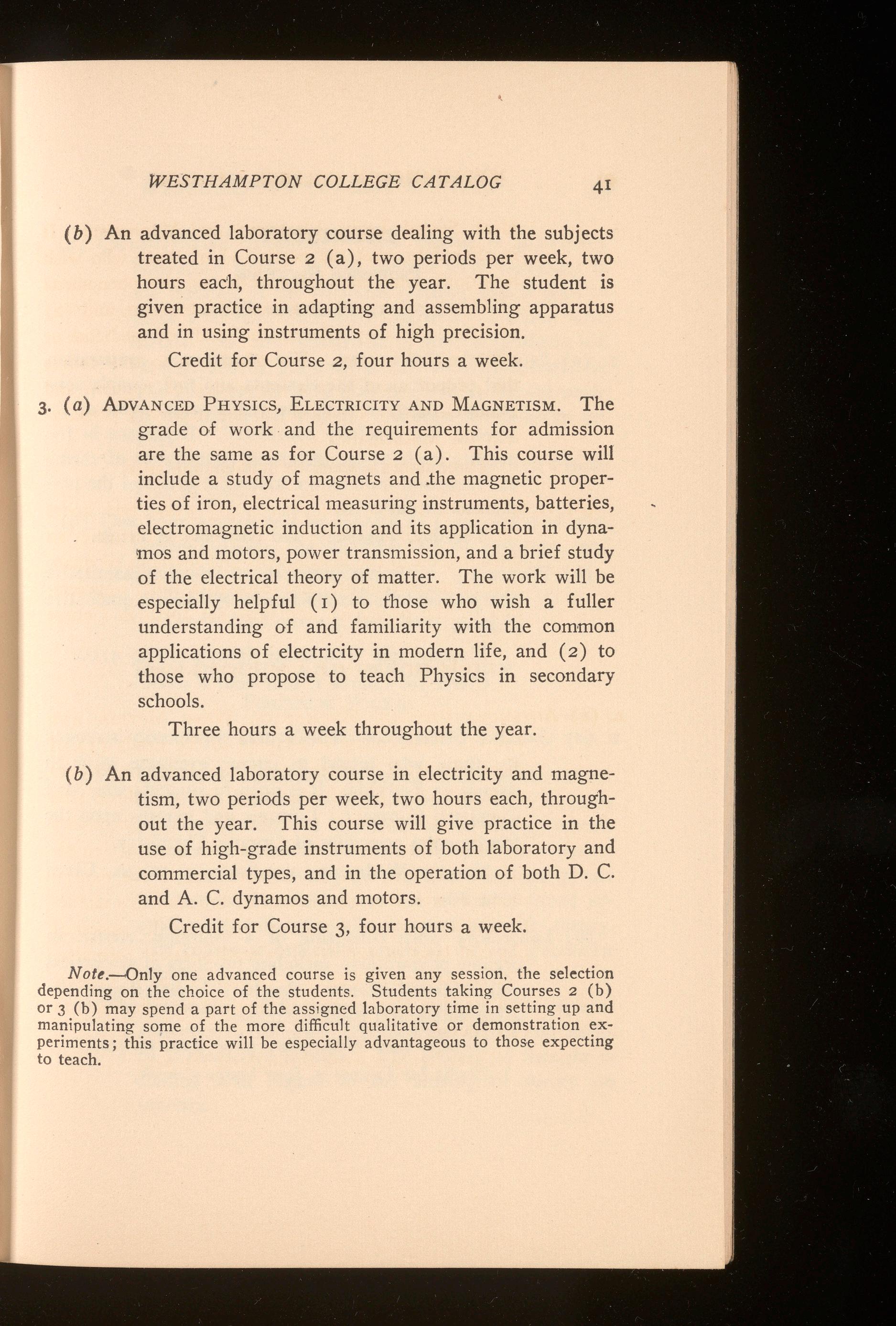
(
b) An advanced laboratory course dealing with the subjects treated in Course 2 (a), two periods per week, two hours each, throughout the year. The student is giveri practice in adapting and assembling apparatus and in using instruments of high precision.
Credit for Course 2, four hours a week.
The grade of work and the requirements for admission are the same as for Course 2 (a). This course will include a study of magnets and .the magnetic properties of iron, electrical measuring instruments, batteries, electromagnetic induction and its application in dynamos and motors, power transmission, and a brief study of the electrical theory of matter. The work will be especially helpful (I) to those who wish a fuller understanding of and familiarity with the common applications of electricity in modern life, and ( 2) to those who propose to teach Physics in secondary schools.
Three hours a week throughout the year.
( b) An advanced laboratory course in electricity and magnetism, two periods per week, two hours each, throughout the year. This course will give practice in the use of high-grade instruments of both laboratory and commercial types, and in the operation of both D. C. and A. C. dynamos and motors.
Credit for Course 3, four hours a week.
Nott!.---Only one advanced course is given any session. the selection depending on the choice of the students. Students taking Courses 2 (b) or 3 (b) may spend a part of the assigned laboratory time in setting up and manipulating some of the more difficult qualitative or demonstration experiments; this practice will be especially advantageous to those expecting to teach.

PROFESSORBINGHAM
ASSOCIATEPROFESSORELDER
1. (a) INORGANICCHEMISTRY. The occurrence, preparation, and properties of the elements and their simple compounds, together with the fundamental laws of the science, are carefully considered . Reference is frequently made to the important applications of c'hemical facts and laws to the industrial arts and the phenomena of daily life.
Tuesday, Thursday, and Saturday at Ir: 20.
( b) Elementary inorganic preparations, simple quantitative analysis, and an introduction to systematic qualitative analysis.
Monday and Wednesday from 2: oo to 4: oo.
Credit for Course I, four hour a week.
2. (a) ORGANICCHEMISTRY . This course is primarily arranged for those who intend to pursue graduate study in science or medicine. It is open to students who have completed Course r. Lectures and quizzes upon the fundamental principles of Organic Chemistry.
Monday, Wednesday and Friday at 12: 20 Given 1914-'15.
(b) Laboratory work cons1stmg of a thorough course in organic preparations, including products of synthetical and industrial interest. Emphasis is placed upon the acquirement of a good technique .
Monday and Wednesday from 2 :oo to 4 :oo
Credit for Course 2, four hours a week.
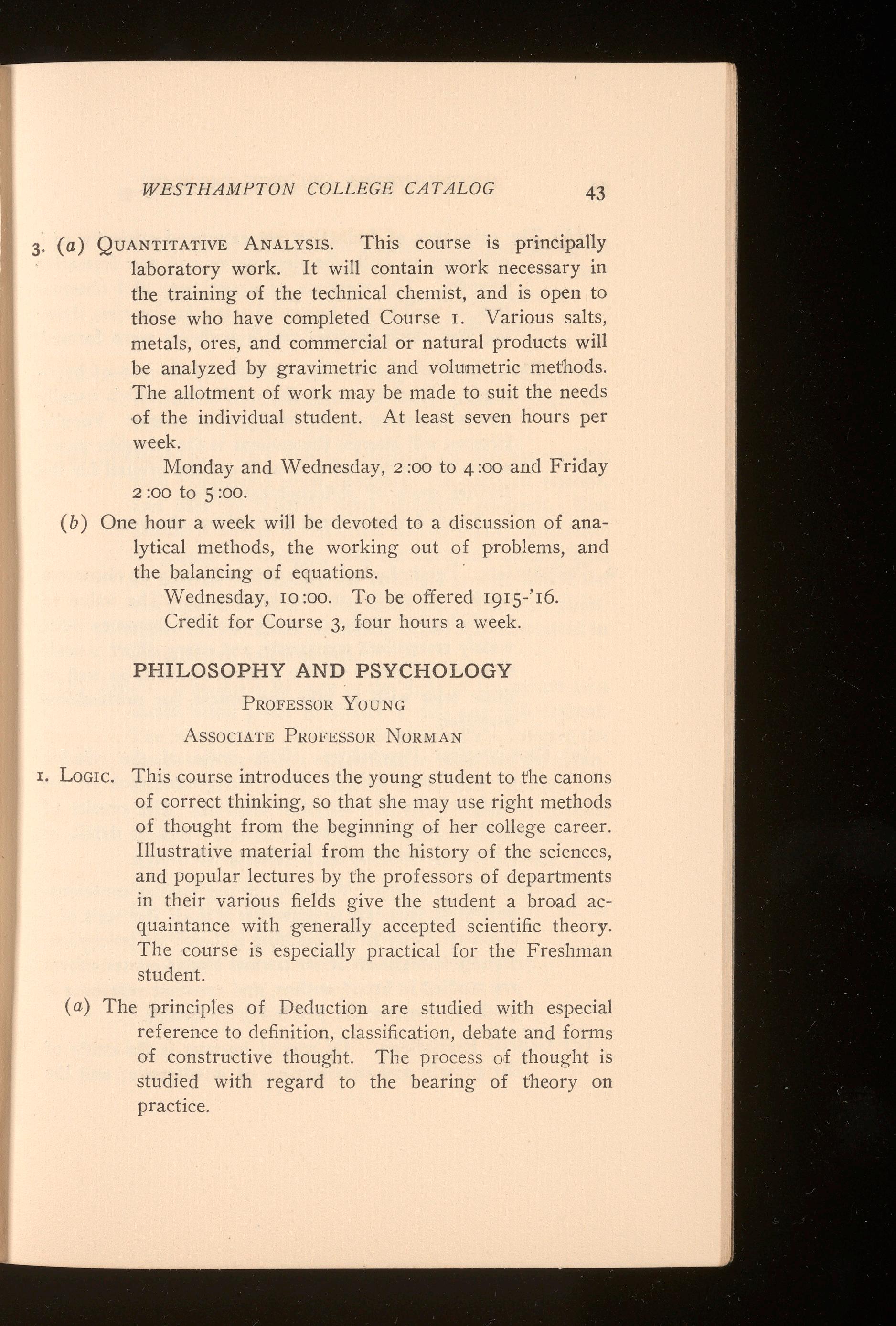
3 . (a) QUANTITATIVE ANALYSIS. This course is principally laboratory work. It will contain work necessary in the training of the technical chemist, and is open to those who have completed Course I. Various salts, metals, ores, and commercial or natural products will be analyzed by gravimetric and volumetric methods. The allotment of work may be made to suit the needs of the individual student. At least seven hours per week.
Monday and Wednesday, 2 :oo to 4 :oo and Friday 2 :oo to 5 :oo.
( b) One hour a week will be devoted to a discussion of analytical methods, the working out of problems, and the balancing of equations.
Wednesday, IO :oo. To be offered 1915-'16. Credit for Course 3, four hours a week.
PROFESSORYOUNG
ASSOCIATEPROFESSORNORMAN
I. LoGIC. This ,course introduces the young student to the canons of correct thinking, so that she may use right methods of thought from the beginning of her college career. Illustrative material from the history of the sciences, and popular lectures by the professors of departments in their various fields give the student a broad acquaintance with ,generally accepted scientific theory The course is especially practical for the Freshman student.
( a) The principles of Deduction are studied with especial reference to definition, cl a ssification, debate and forms of constructive thought. The process of thought is studied with regard to the bearing of theory on practice.
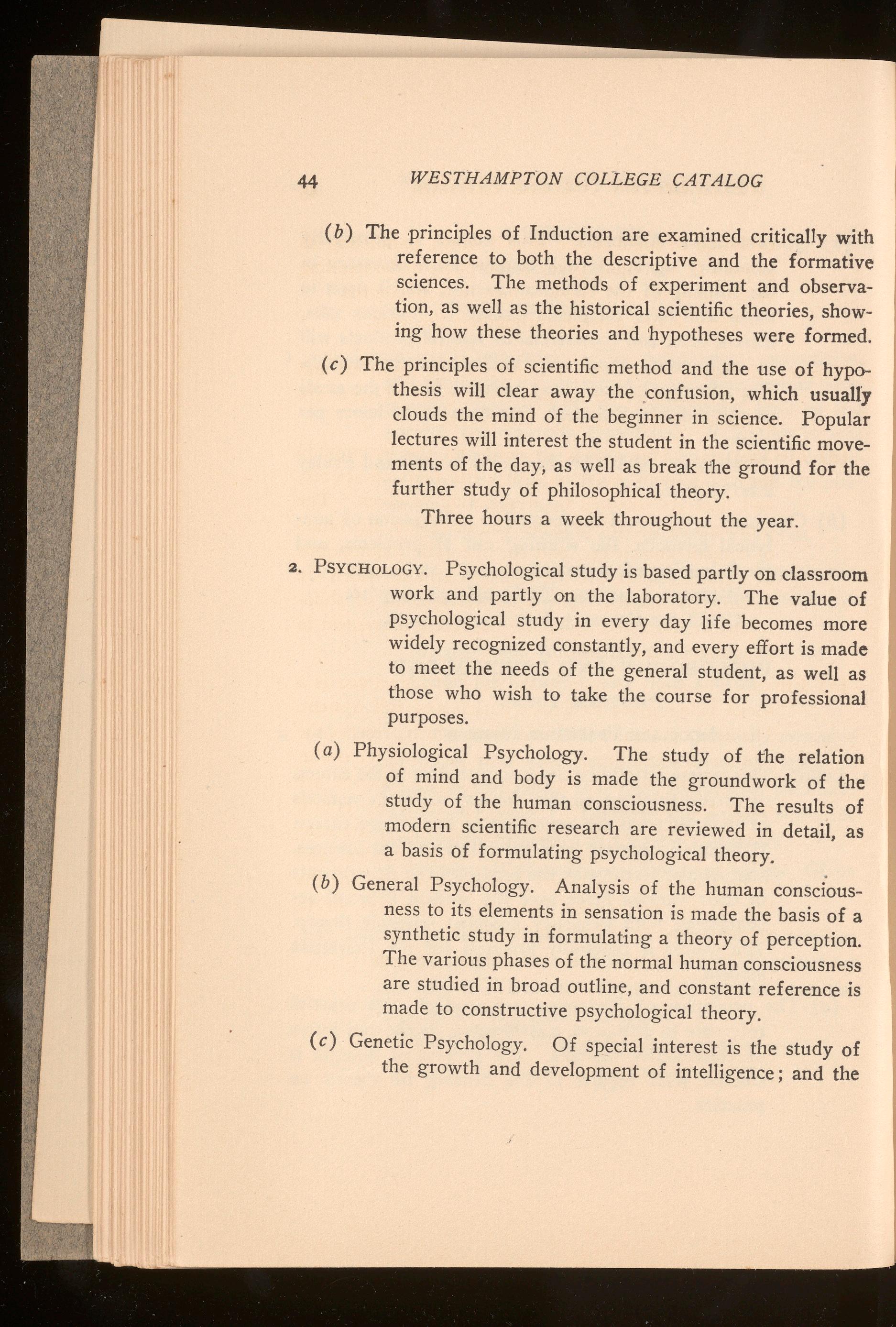
(
(
b) The principles of Induction are examined critically with reference to both the descriptive and the formative sciences. The methods of experiment and observation, as well as the historical scientific theories, showing how these theories and hypotheses were formed.
c) The principles of scientific method and the use of hypothesis will clear away the confusion, which usually clouds the mind of the beginner in science. Popular lectures will interest the student in the scientific movements of the day, as well as break the ground for the further study of philosophical theory.
Three hours a week throughout the year.
2. PSYCHOLOGY.Psychological study is based partly on classroom work and partly on the laboratory. The value of psychological study in every day life becomes more widely recognized constantly, and every effort is made to meet the needs of the general student, as well as those who wish to take the course for professional purposes.
( a) Physiological Psychology. The study of the relation of mind and body is made the groundwork of the study of the human consciousness. The results of modern scientific research are reviewed in detail, as a basis of formulating psychological theory.
( b) General Psychology. Analysis of the human consciousness to its elements in sensation is made the basis of a synthetic study in formulating a theory of perception. The various phases of the normal human consciousness are studied in broad outline, and constant reference is made to constructive psychological theory.
( c) Genetic Psychology. Of special interest is the study of the growth and development of intelligence; and the
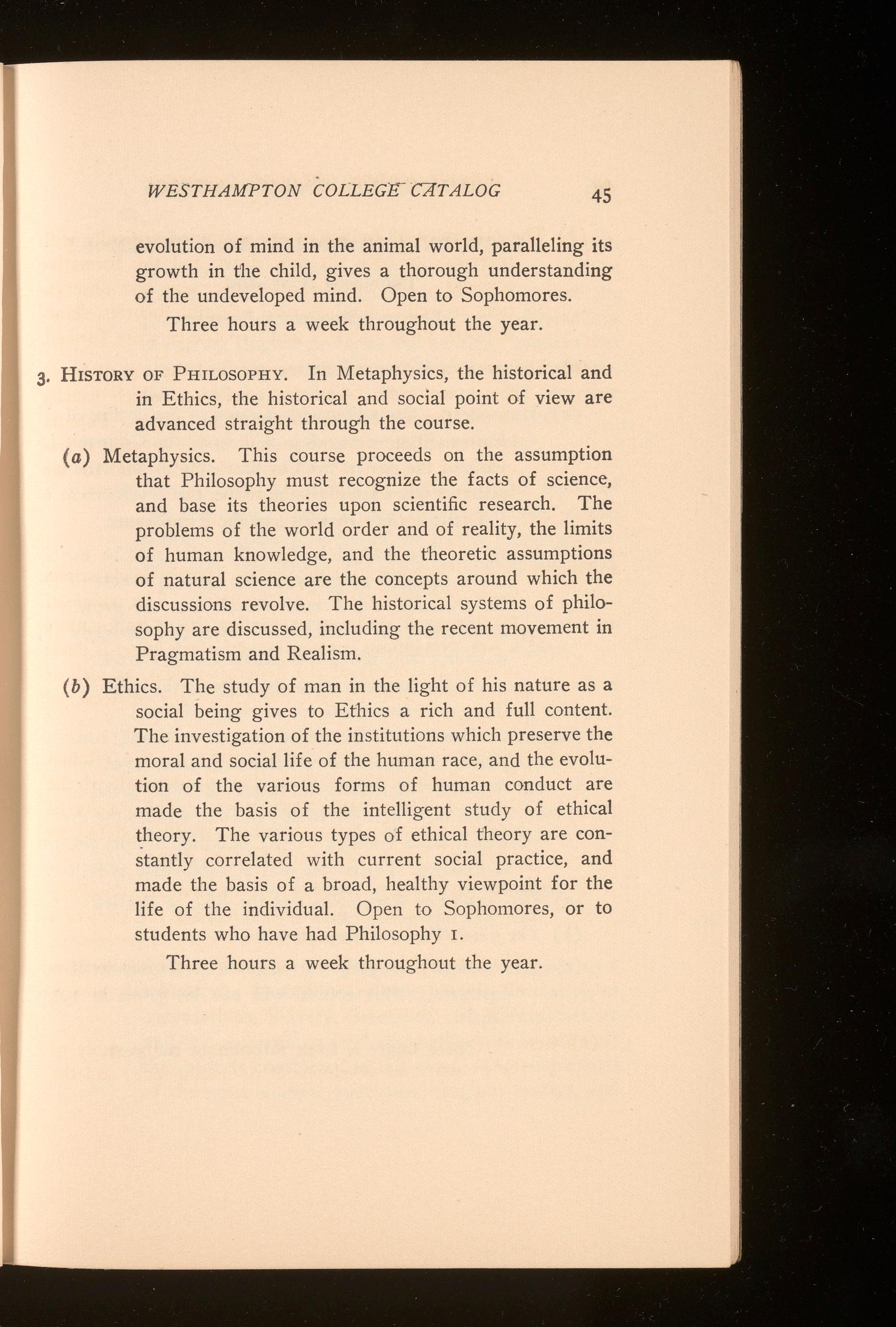
evolution of mind in the animal world, paralleling its growth in the child, gives a thorough understanding of the undeveloped mind. Open to Sophomores.
Three hours a week throughout the year.
3. HISTORYOF PHILOSOPHY. In Metaphysics, the historical and in Ethics, the historical and social point of view are advanced straight through the course.
(a) Metaphysics. This course proceeds on the assumption that Philosophy must recognize the facts of science, and base its theories upon scientific research. The problems of the world order and of reality, the limits of human knowledge, and the theoretic assumptions of natural science are the concepts around which the discussions revolve. The historical systems of philosophy are discussed, including the recent movement in Pragmatism and Realism.
( b) Ethics. The study of man in the light of his nature as a social being gives to Ethics a rich and full content. The investigation of the institutions which preserve the moral and social life of the human race, and the evolution of the various forms of human conduct are made the basis of the intelligent study of ethical theory. The various types of ethical theory are constantly correlated with current social practice, and made the basis of a broad, healthy viewpoint for the life of the individual. Open to Sophomores, or to students who have had Philosophy 1.
Three hours a week throughout the year.
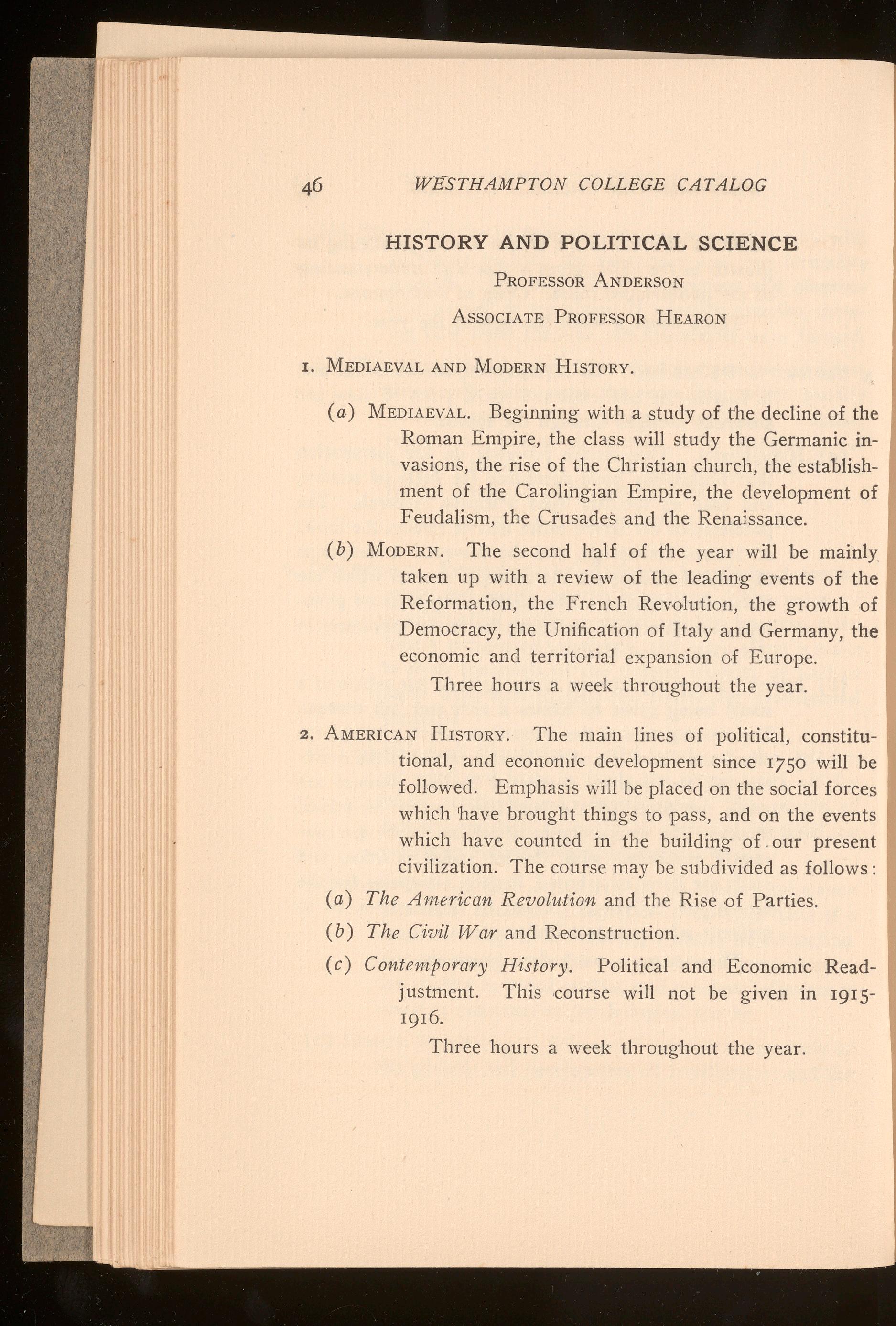
WI!STHAMPTON COLLEGE CATALOG
HISTORY AND POLITICAL SCIENCE
PROFESSOR ANDERSON
ASSOCIATE PROFESSOR HEARON
I. MEDIAEVAL AND MODERN HISTORY.
(a) MEDIAEVAL. Beginning with a study of the decline of the Roman Empire, the class will study the Germanic invasions, the rise of the Christian church, the establishment of the Carolingian Empire, the development of Feudalism, the Crusades and the Renaissance.
(
b) MODERN. The second half of the year will be mainly taken up with a review of the leading events of the Reformation, the French Revolution, the growth of Democracy, the Unification of Italy and Germany, the economic and territorial expan sion of Europe.
Three hours a week throughout the year .
2. AMERICAN HISTORY. The main lines of political, constitutional, and economic development since 1750 will be followed. Emphasis will be placed on the social forces which 'have brought things to pass, and on the events which have counted in the building of . our present civilization. The course may be subdivided as follows :
(a) The American Revolution and the Rise of Parties.
(
b) The Civil War and Reconstruction.
(c) Contemporary History. Political and Economic Readjustment. This course will not be given in 19151916.
Three hours a week throughout the year.
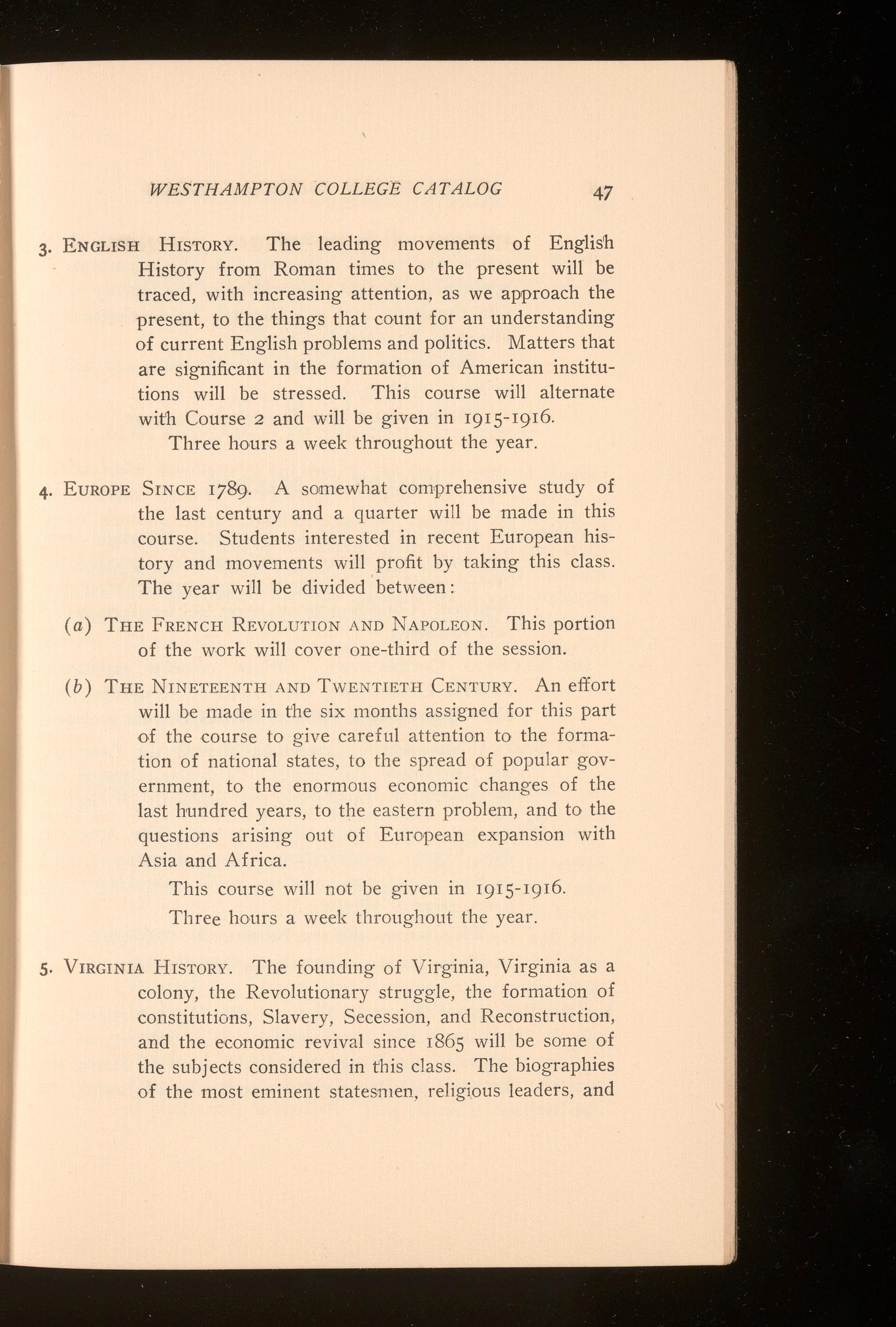
3. ENGLISH HISTORY. The leading movements of English History from Roman times to the present will be traced, with increasing attention, as we approach the present, to the things that count for an understanding of current English problems and politics. Matters that are significant in the formation of American institutions will be stressed. This course will alternate wit'h Course 2 and will be given in 1915-1916.
Three hours a week throughout the year.
4. EUROPE Srnrn 1789. A somewhat comprehensive study of the last century and a quarter will be made in this course. Students interested in recent European history and movements will profit by taking this class. The year will be divided between:
(a) THE FRENCH REVOLUTIONAND NAPOLEON. This portion of the work will cover one-third of the session.
(b) THE NINETEENTH AND TWENTIETH CENTURY. An effort will be made in the six months assigned for this part of the course to give careful attention to the formation of national states, to the spread of popular government, to the enormous economic changes of the last hundred years, to the eastern problem, and to the questions arising out of European expansion with Asia and Africa.
This course will not be given m 1915-1916.
Three hours a week throughout the year.
5. VIRGINIA HISTORY. The founding of Virginia, Virginia as a colony, the Revolutionary struggle, the formation of constitutions, Slavery, Secession, and Reconstruction, and the economic revival since 1865 will be some of the subjects considered in t'his class. The biographies of the most eminent statesmen, religious leaders, and

WESTHAMPTON COLTEGE CATAL -OG
educators will be touched upon. The objects of the course are, in the main, two : to afford students an opportunity to gain a knowledge of the History of the Old Dominion, and to encourage the development of historical scholarship among us.
This course alternates with Course 4 and will be given in 1915-1916.
Three hours a week throughout the year.
I. AMERICAN GovERNMENT will be discussed, National, State, and Local, both in theory and practice. Special topics are assigned for investigation, and parallel reading is required. Considerable attention will be given to current problems.
(a) NATIONAL GovERNMENT. Origin, colonial experience, Federal Constitution, the President, Congress, Judiciary Departments, Political Parties, current problems.
( b) STATEGOVERNMENT.Constitutional basis, the Executive, the Legislative, the Courts. Particular attention will be given to the institutions and problems of Virginia.
(c) MUNICIPAL AND RURAL GovERNMENT. The American city, history, organization, reform movements, such as the Commission and the City Manager plans; the town, county, village.
This course will not be given in 1915-1916.
Three hours a week throughout the year.
2. THE THEORYOF PoLITICAL ScrnNcE AND CoMPARATIVEGovERNMENTwill be discussed. Such subjects as the origin of the States, the classification of States, the form .s of government, the distribution of powers, the
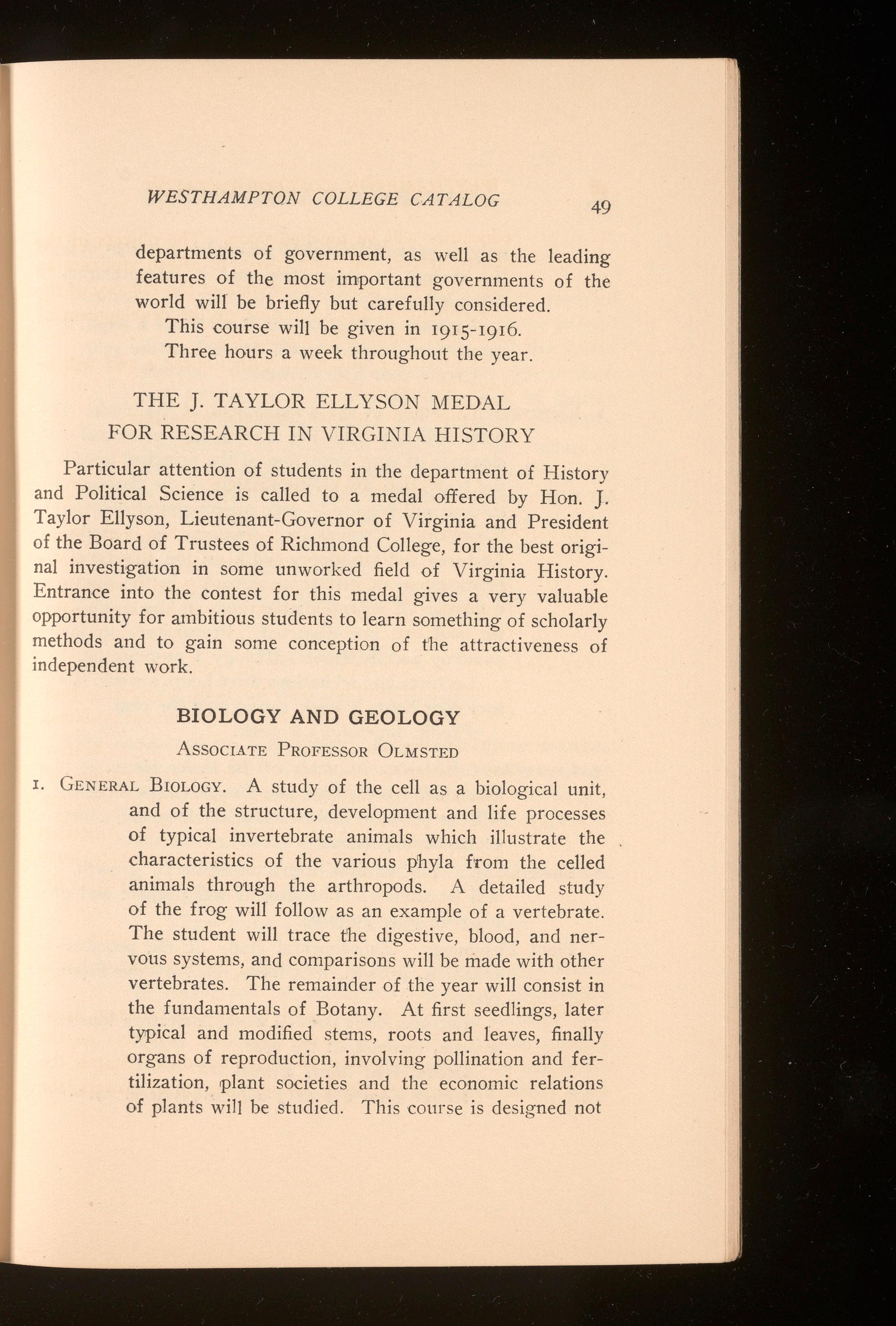
departments of government, as well as the leading features of the most important governments of the world will be briefly but carefully considered. This course will be given in 1915-1916. Three hours a week throughout the year.
Particular attention of students in the department of History and Political Science is called to a medal offered by Hon. J. Taylor Ellyson, Lieutenant-Governor of Virginia and President of the Board of Trustees of Richmond College, for the best original invesfigation in some unworked field of Virginia History. Entrance into the contest for this medal gives a very valuable opportunity for ambitious students to learn something of scholarly methods and to gain some conception of t11e attractiveness of independent work.
ASSOCIATE PROFESSOR OLMSTED
1. GENERALBIOLOGY. A study of the cell as a biological unit, and of the structure, development and life processes of typical invertebrate animals which illustrate the characteristics of the various phyla from the celled animals through the arthropods. A detailed study of the frog will follow as an example of a vertebrate. The student will trace t'he digestive, blood, and nervous systems, and comparisons will be made with other vertebrates. The remainder of the year will consist in the fundamentals of Botany. At first seedlings, later typical and modified stems, roots and leaves, finally organs of reproduction, involving pollination and fertilization, ,plant societies and the economic relations of plants wil! be studied. This course is designed not
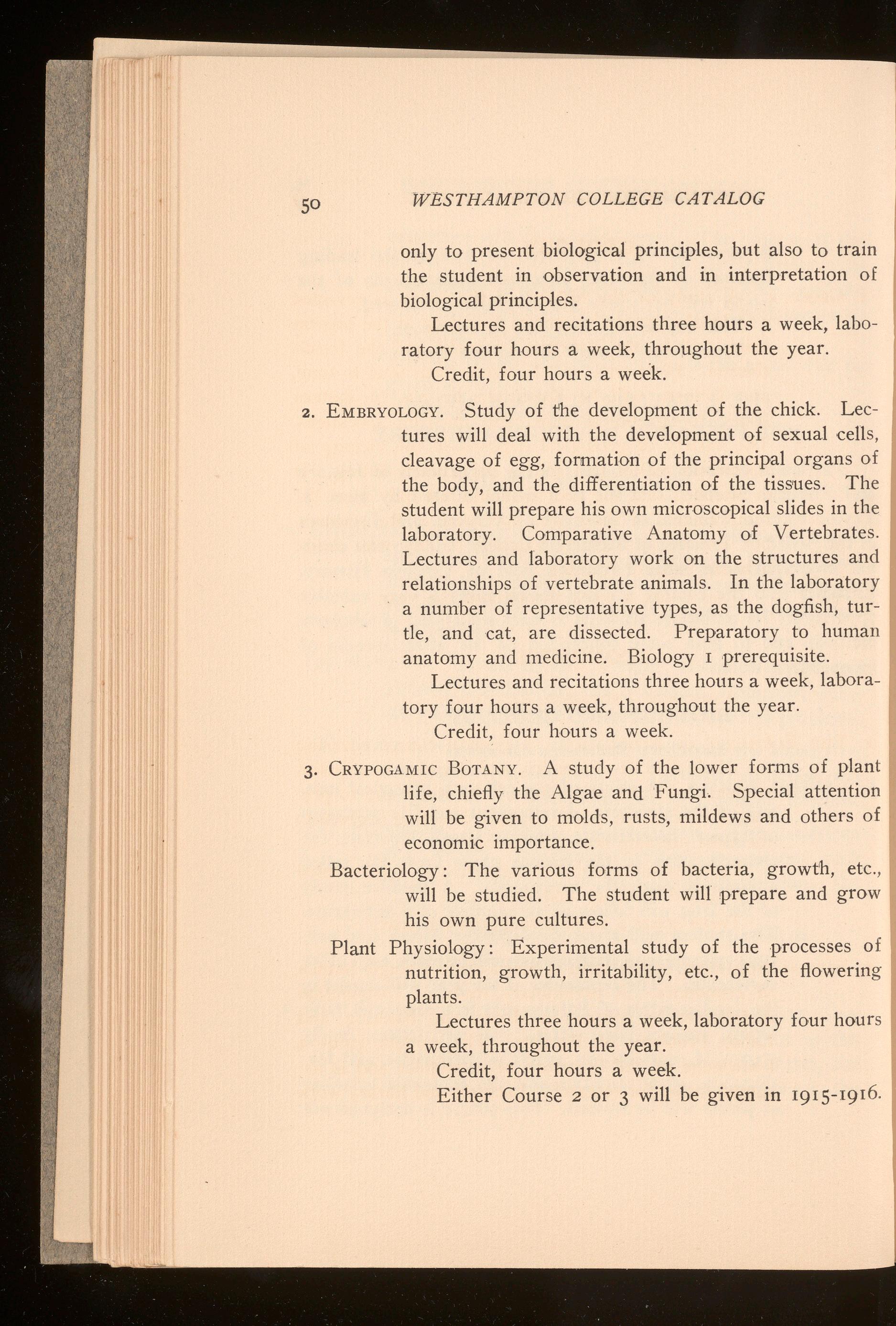
only to present biological principles, but also to train the student in observation and in interpretation of biological principles.
Lectures and recitations three hours a week, laboratory four hours a week, throughout the year.
Credit, four hours a week.
2. EMBRYOLOGY.Study of t'he development of the chick. Lectures will deal with the development of sexual cells , cleavage of egg, formation of the principal organs of the body, and the differentiation of the tissues. The student will prepare his own microscopical slides in the laboratory. Comparative Anatomy of Vertebrates . Lectures and laboratory work on the structures and relationships of vertebrate animals. In the laboratory a number of representative types, as the dogfish, turtle, and cat, are dissected. Preparatory to human anatomy and medicine. Biology 1 prerequisite.
Lectures and recitations three hours a week, laboratory four hours a week, throughout the year.
Credit, four hours a week.
3. CRYPOGAMlCBOTANY . A study of the lower forms of plant life , chiefly the Algae and Fungi. Special attention will be given to molds, rusts, mildews and others of economic importance.
Bacteriology: The various forms of bacteria, growt'h, etc. , will be studied. The student will prepare and grow his own pure cultures.
Plant Physiology: Experimental study of the processes o f nutrition, growth, irritability, etc., of the flowering plants.
Lectures three hours a week, laboratory four hour s a week, throughout the year.
Credit, four hours a week.
Either Course 2 or 3 will be given in 1915-1916
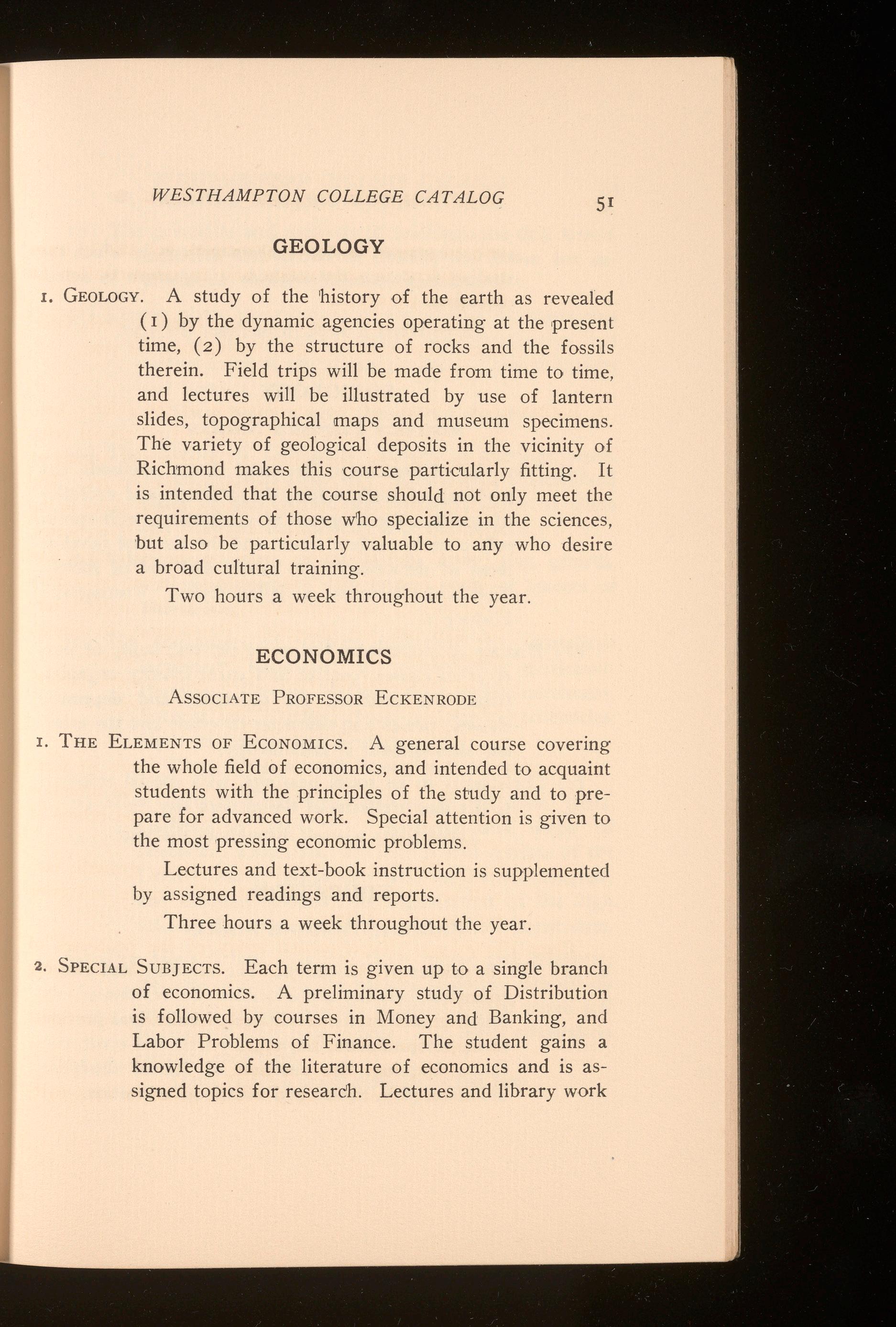
1. GEOLOGY. A study of the 'history of the earth as revealed (I) by the dynamic agencies operating at the present time, ( 2) by the structure of rocks and the fossils therein. Field trips will be made from time to time, and lectures will be illustrated by use of lantern slides, topographical maps and museum specimens. The variety of geological deposits in the vicinity of Richmond makes this course particularly fitting. It is intended that the course should not only meet the requirements of those w'ho specialize in the sciences , but also be particularly valuable to any who desire a broad cultural training.
Two hours a week throughout the year
ASSOCIATEPROFESSORECKENRODE
I. THE ELEMENTSOF EcoNOMICS. A general course covering the whole field of economics, and intended to acquaint students with the principles of the study and to prepare for advanced work. Special attention is given to the most pressing economic problems.
Lectures and text-book instruction is supplemented by assigned readings and reports.
Three hours a week throughout the year.
2. SPECIALSUBJECTS. Each term is given up to a single branch of economics. A preliminary study of Distribution is followed by courses in Money and Banking, and Labor Problems of Finance. The student gains a knowledge of the literature of economics and is assigned topics for researc'h. Lectures and library work
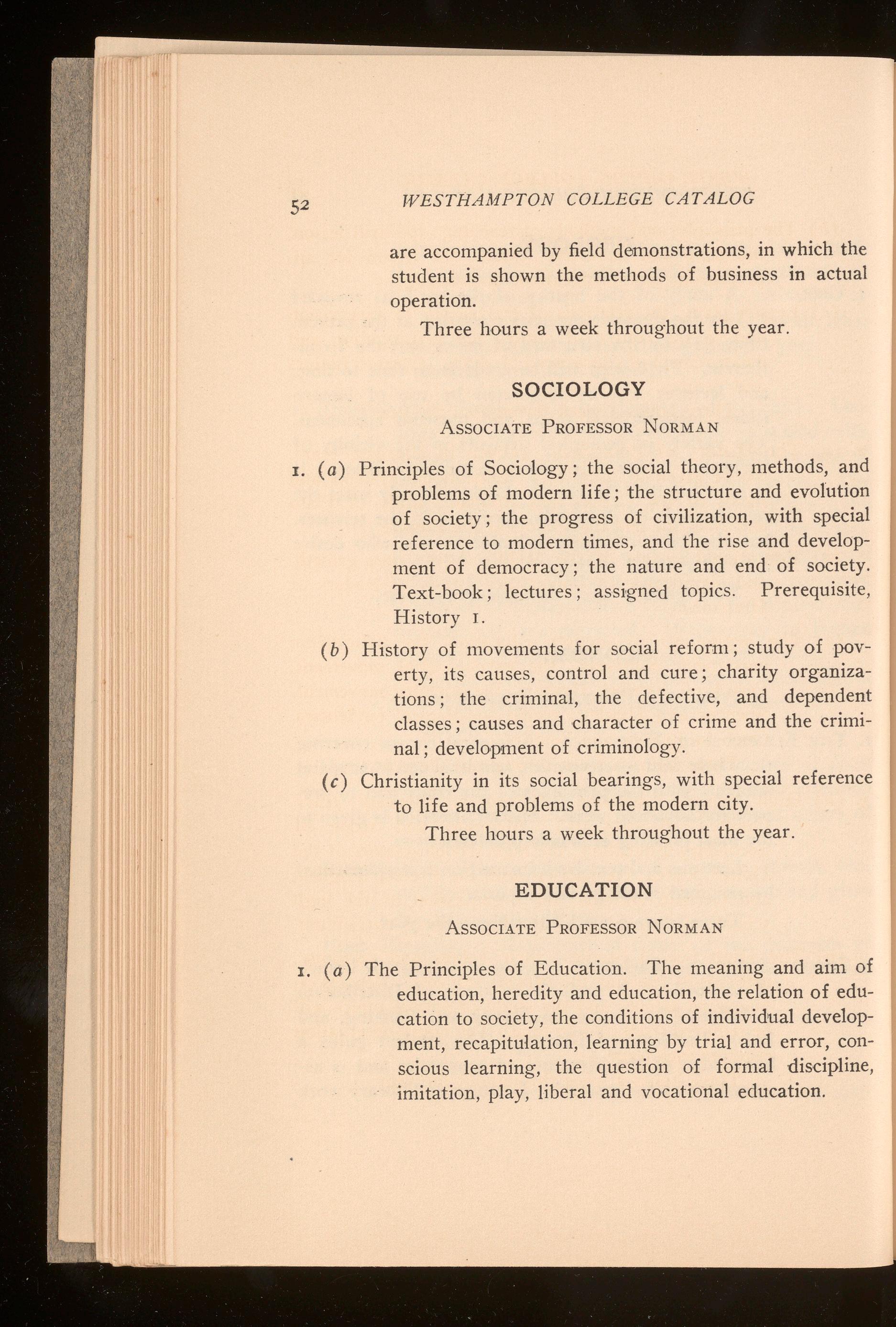
are accompanied by field demonstrations, in which the student is shown the methods of business in actual operation.
Three hours a week throughout the year
ASSOCIATE PROFESSOR NORMAN
1. (a) Principles of Sociology; the social theory, methods, and problems of modern life; the structure and evolution of society; the progress of civilization, with special reference to modern times, and the rise and development of democracy; the nature and end of society. Text-book; lectures; assigned topics . Prerequisite, History I.
( b) History of movements for social reform; study of poverty, its causes, control and cure; charity organizations ; the criminal, the defective, and dependent classes; causes and character of crime and the criminal; development of criminology.
( c) Christianity in its social bearings, with special reference to life and problems of the modern city
Three hours a week throughout the year
ASSOCIATE PROFESSOR NORMAN
1. (a) The Principles of Education. The meaning and aim of education, heredity and education, the relation of education to society, the conditions of individual development, recapitulation, learning by trial and error, conscious learning, the question of formal discipline, imitation, play, liberal and vocational education.
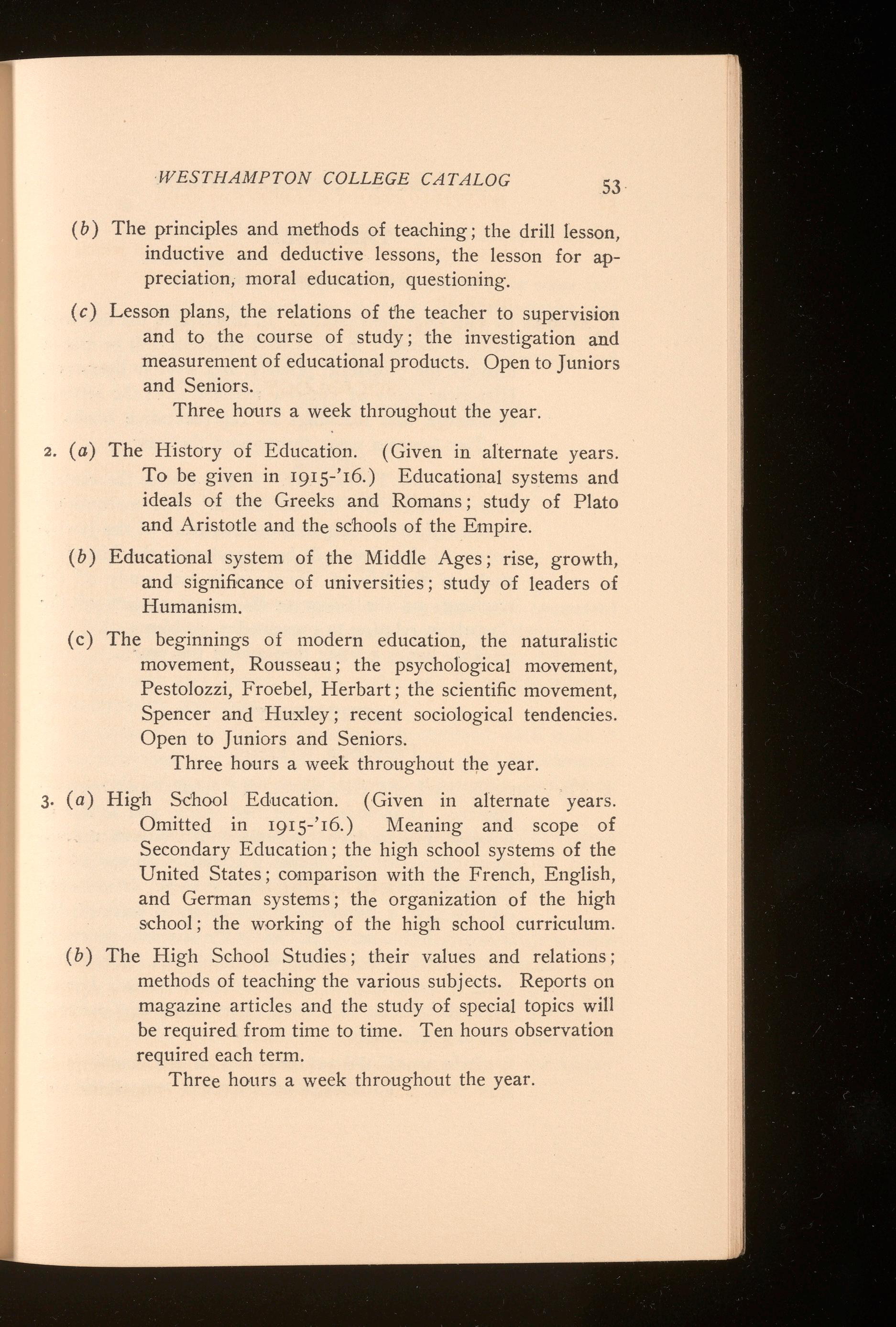
( b) The principles and methods of teaching; the drill lesson, inductive and deductive lessons, the lesson for appreciation; moral education, questioning.
( c) Lesson plans, the relations of t'he teacher to supervision and to the course of study; the investigation and measurement of educational products. Open to Juniors and Seniors.
Three hours a week throughout the year.
2. (a) The History of Education. ( Given in alternate years. To be given in 1915-'16.) Educational systems and ideals of the Greeks and Romans; study of Plato and Aristotle and the schools of the Empire.
( b) Educational system of the Middle Ages; rise, growth, and significance of universities ; study of leaders of Humanism.
(
c) The beginnings of modern education, the naturalistic movement, Rousseau; the psychological movement, Pestolozzi, Froebe!, Herbart; the scientific movement, Spencer and Huxley; recent sociological tendencies. Open to Juniors and Seniors.
Three hours a week throughout tqe year.
3. (a) High School Education. (Given in alternate years. Omitted in 1915-'16.) Meaning and scope of Secondary Education; the high school systems of the United States; comparison with the French, English, and German systems; the organization of the high school; the working of the high school curriculum.
( b) The High School Studies ; their values and relations; methods of teaching the various subjects. Reports on magazine articles and the study of special topics will be required from time to time. Ten hours observation required each term.
Three hours a week throughout the year.
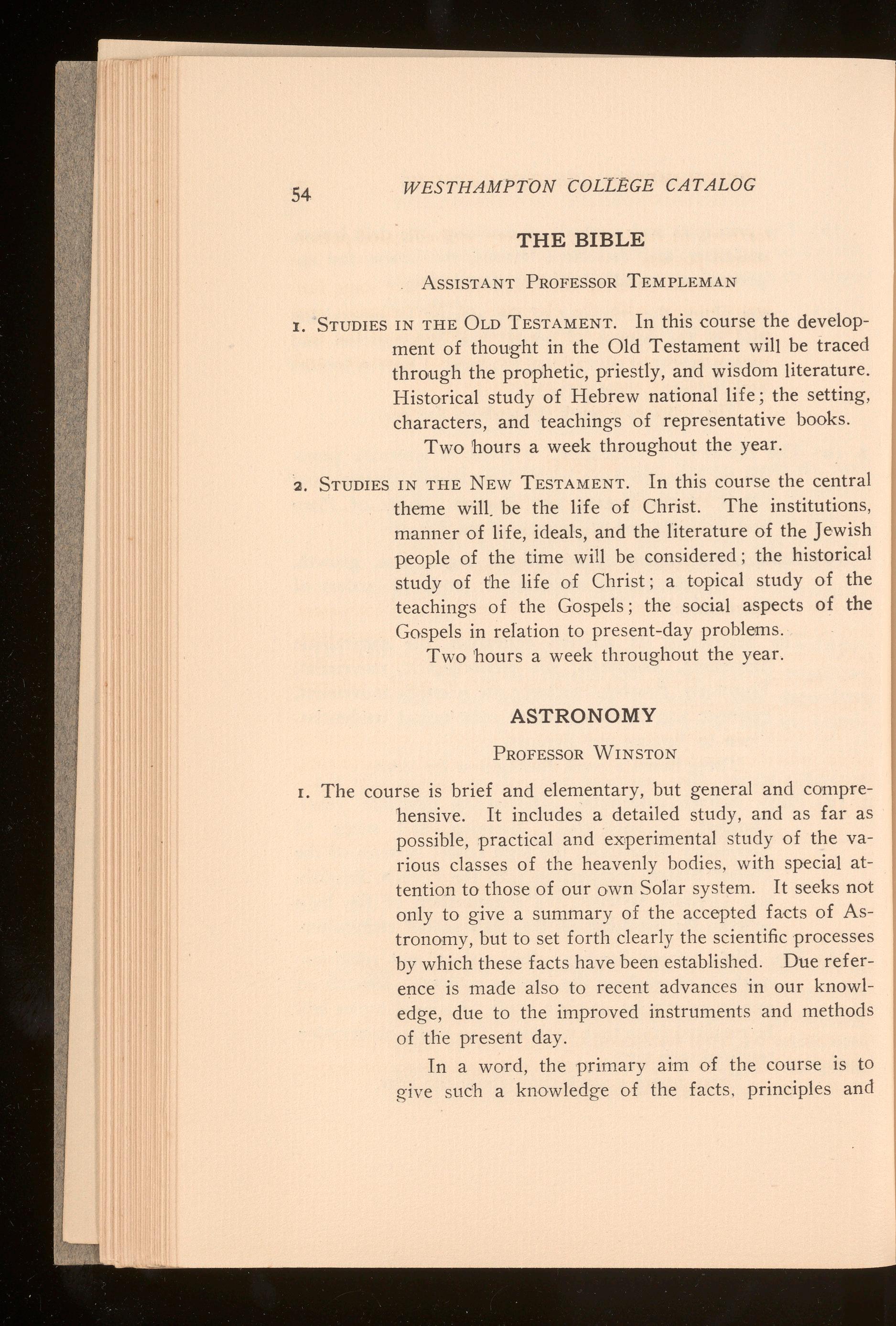
WESTHAMPTON COLLEGE CATALOG
ASSISTANTPROFESSORTEMPLEMAN
x. STUDIESIN THE OLD TESTAMENT. In this course the development of thonght in the Old Testament will be traced through the prophetic, priestly, and wisdom literature. Historical study of Hebrew national life; the setting, characters, and teachings of representative books. Two hours a week throughout the year.
2. STUDIESIN TI-IENEW TESTAMENT. In this course the central theme will . be the life of Christ. The institutions, manner of life, ideals, and the literature of the Jewish people of the time will be considered ; the historical study of the life of Christ; a topical study of the teachings of the Gospels; the social aspects of the Gospels in relation to pre sent-day problems Two 'hours a week throughout the year.
PROFESSORWINSTON
I. The course is brief and elementary, but general and comprehensive. It includes a detailed study , and as far as possible , practical and ex,perimental study of the various classes of the heavenly bodies , with special attention to those of our own Solar system. It seeks not only to give a summary of the accepted facts of Astronomy, but to set forth clearly the scientific processes by which these facts have been established Due reference is made also to recent advances in our knowledge, due to the improved instruments and methods of the present day.
In a word, the primary aim of the course is to give such a knowled g e of the facts , principles and
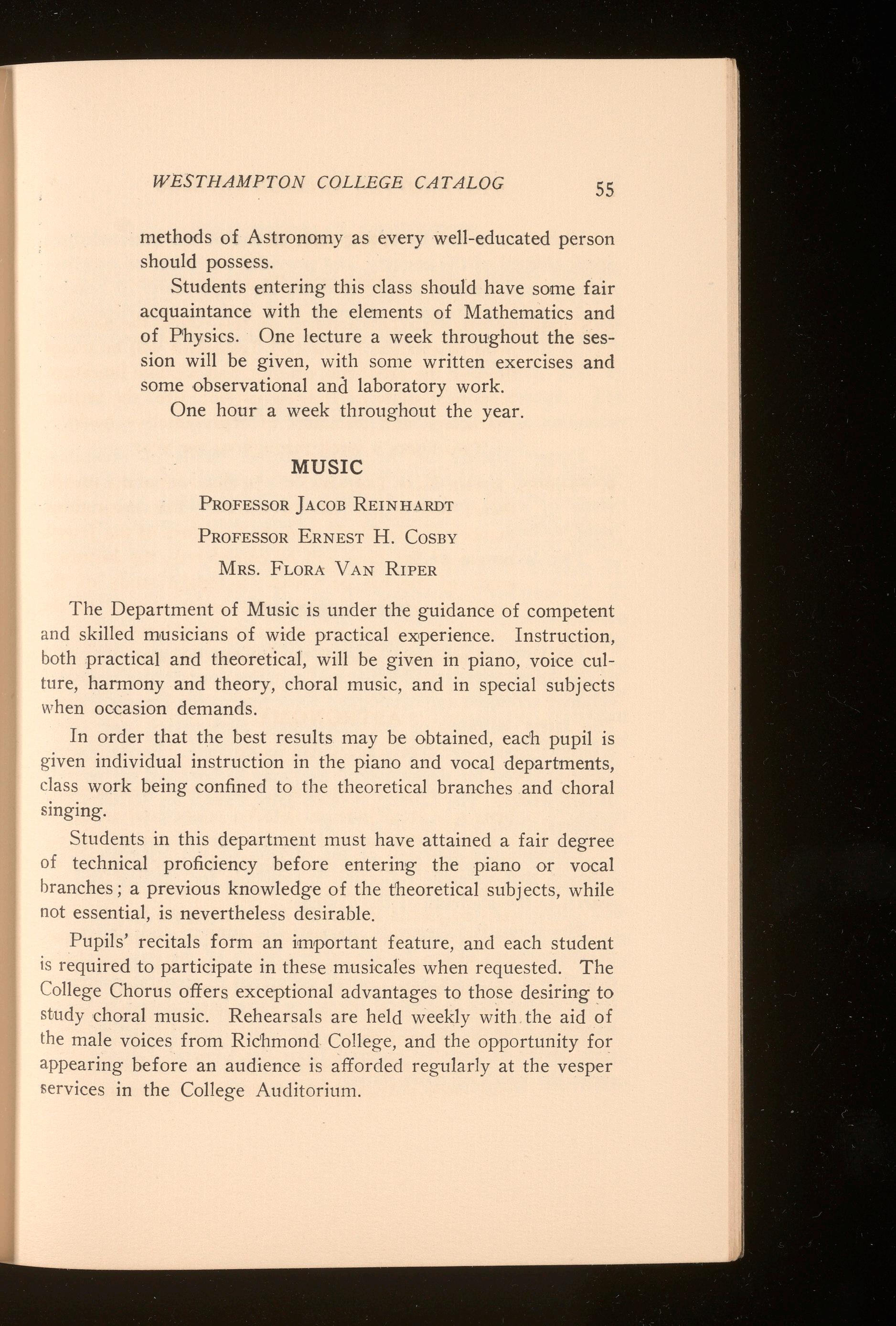
methods of Astronomy as every well-educated person should possess.
Students entering this class should have some fair acquaintance with the elements of Mathematics and of Physics. One lecture a week throughout the session will be given, with some written exercises and some observational and laboratory work.
One hour a week throughout the year .
PROFESSOR JACOB REINHARDT
PROFESSOR ERNEST H. COSBY
MRS. FLORA VAN RIPER
The Department of Music is under the guidance of competent an d skilled musicians of wide practical ex ,perience. Instruction, both practical and theoretical, will be given in piano, voice culture , harmony and theory, choral music, and in special subjects when occasion demands.
In order that the best results may be obtained, eac'h pupil is given individual instruction in the piano and vocal departments, cla ss work being confined to the theoretical branches and choral singing.
Students in this department must have attained a fair degree of technical proficiency before entering the piano or vocal branches; a previous knowledge of the theoretical subjects, while not essential, is nevertheless desirable.
Pupils' recitals form an important feature, and each student is required to participate in these musicales when requested. The College Chorus offers exceptional advantages to those desiring to study choral music. Rehearsals are held weekly with the aid of the male voices from Richmond College, and the opportunity for appearing before an audience is afforded regularly at the vesper services in the College Auditorium.
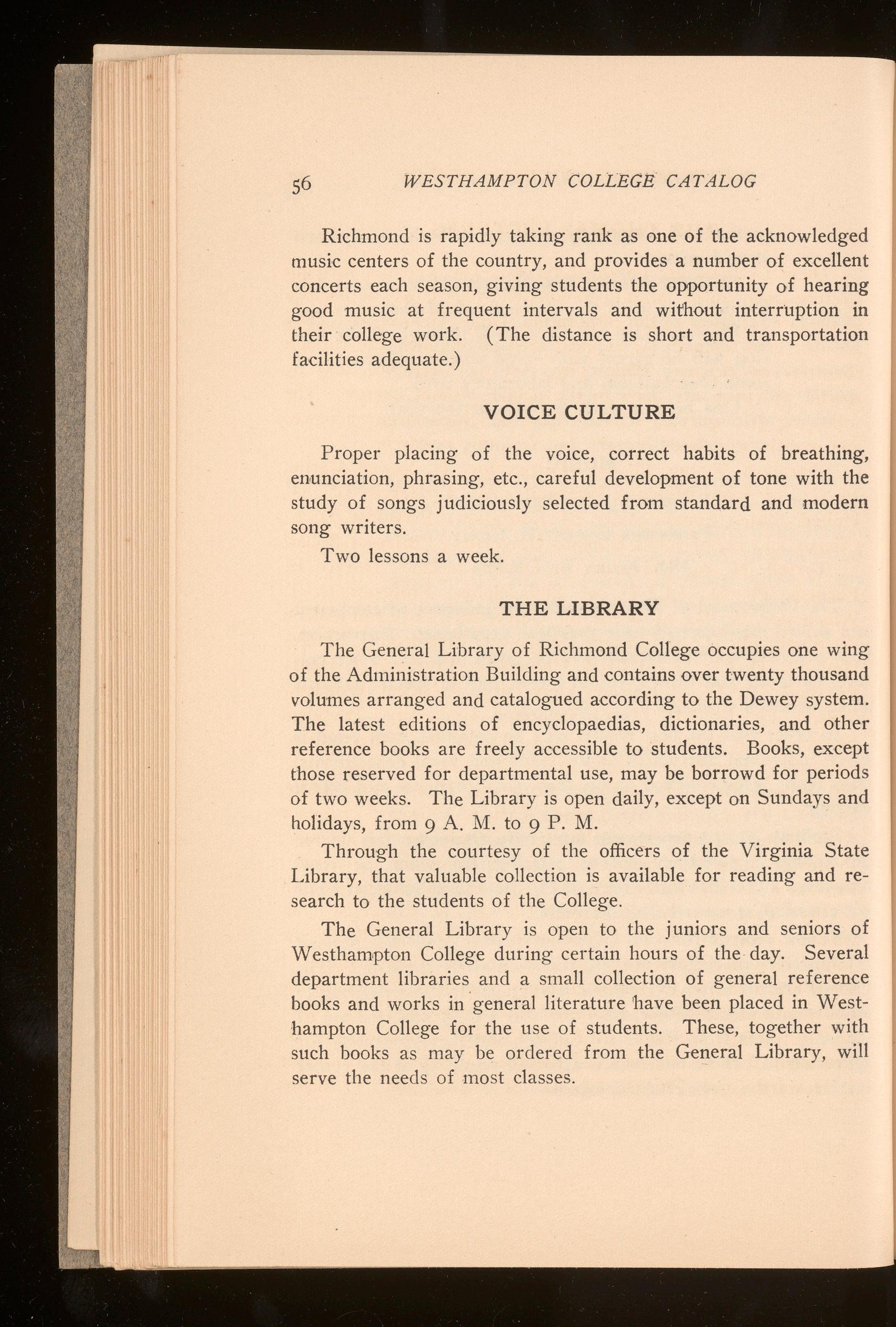
Richmond is rapidly taking rank as one of the acknowledged music centers of the country, and provides a number of excellent concerts each season, giving students the opportunity of hearing good music at frequent intervals and without interruption in their college work. (The distance is short and transportation facilities adequate.)
Proper placing of the voice, correct habits of breathing, enunciation, phrasing, etc., careful development of tone with the study of songs judiciously selected from standard and modern song writers.
Two lessons a week.
The General Library of Richmond College occupies one wing of the Administration Building and contains over twenty thousand volumes arranged and catalogued according to the Dewey system. The latest editions of encyclopaedias, dictionaries, and other reference books are freely accessible to students. Books, except those reserved for departmental use, may be borrowd for periods of two weeks. The Library is open daily, except on Sundays and holidays, from 9 A. M. to 9 P. M.
Through the courtesy of the officers of the Virginia State Library, that valuable collection is available for reading and research to the students of the College.
The General Library is open to the juniors and seniors of Westhampton College during certain hours of the day. Several department libraries and a small collection of general reference books and works in general literature 'have been placed in Westhampton College for the use of students. These, together with such books as may be ordered from the General Library, will serve the needs of most classes.
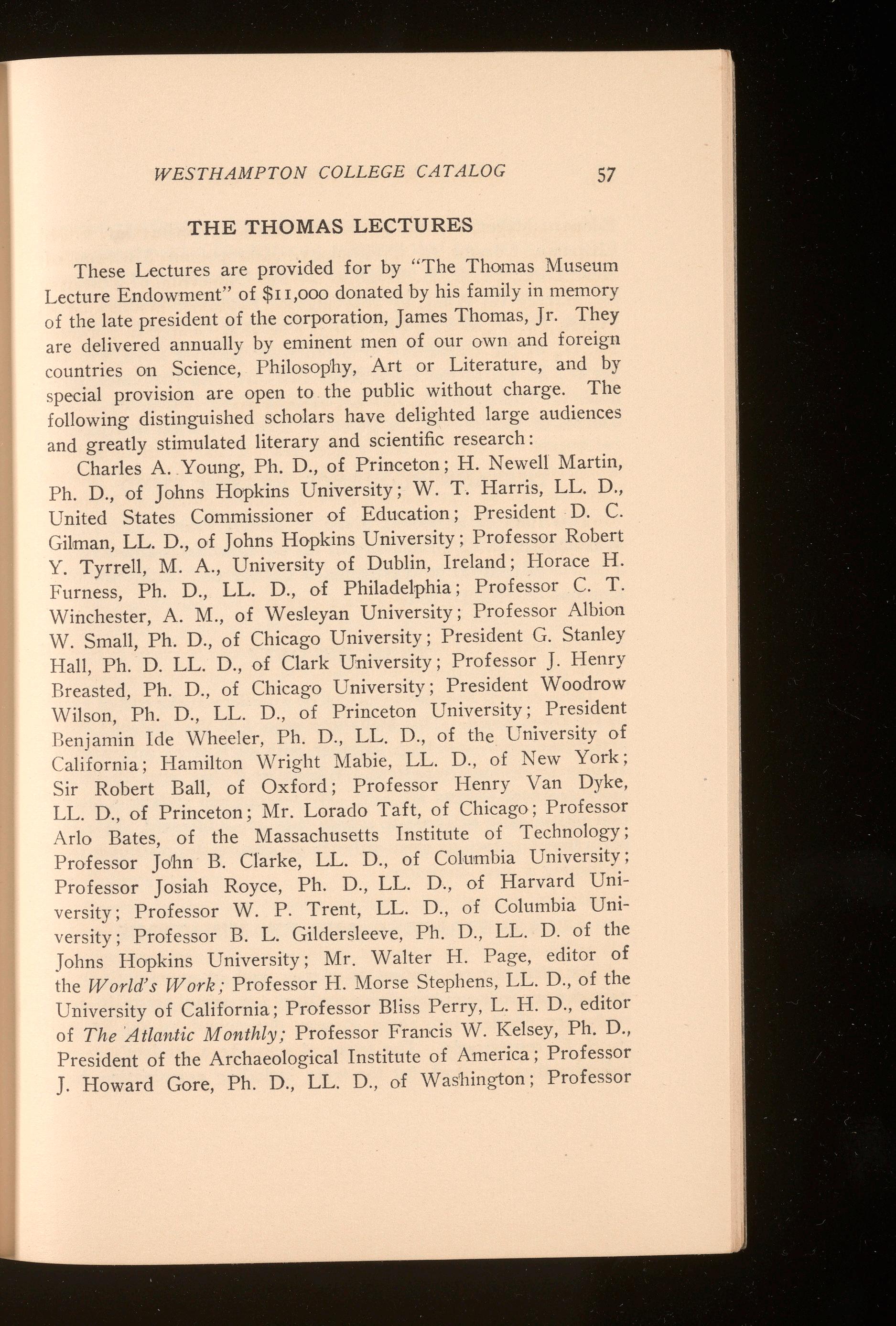
These Lectures are provided for by "The Thomas Museum Lecture Endowment" of $11,000 donated by his family in memory of the late president of the corporation, James Thomas, Jr. They are delivered annually by eminent men of our own and foreign countries on Science, Philosop'hy, Art or Literature, and by special provision are open to the public without charge. The following distinguished scholars have delighted large audiences and greatly stimulated literary and scientific research: Charles A. Young, Ph. D., of Princeton; H. Newell Martin, Ph . D., of Johns Hopkins University; W. T. Harris, LL. D., United States Commissioner of Education; President D. C. Gilman, LL. D., of Johns Hopkins University; Professor Robert Y. Tyrrell, M. A., University of Dublin, Ireland; Horace H. Furness, Ph. D., LL. D., of Philadelphia; Professor C. T. Winchester, A. M., of Wesleyan University; Professor Albion W. Small, Ph. D., of Chicago University; President G. Stanley Hall, Ph. D. LL. D., of Clark University; Professor J. Henry Breasted, Ph. D., of Chicago University; President Woodrow Wilson, Ph. D., LL. D., of Princeton University; President Benjamin Ide Wheeler, Ph. D., LL. D., of the University of California; Hamilton Wright Mabie, LL. D., of New York; Sir Robert Ball, of Oxford; Professor Henry Van Dyke, LL. D., of Princeton; Mr. Lorado Taft, of Chicago; Professor Arlo Bates, of the Massachusetts Institute of Technology; Professor Jo'hn B. Clarke, LL. D., of Columbia University; Professor Josiah Royce, Ph. D., LL. D., of Harvard University; Professor W. P. Trent, LL. D., of Columbia University; Professor B. L. Gildersleeve, Ph. D., LL. D. of the Johns Hopkins University; Mr. Walter H. Page, editor of the World's Wark; Professor H. Morse Stephens, LL. D., of the University of California; Professor Bliss Perry, L. H. D., editor of The Atlantic Monthly; Professor Francis W. Kelsey, Ph. D., President of the Archaeological Institute of America; Professor J. Howard Gore, Ph. D., LL. D., of Was 'hington; Professor
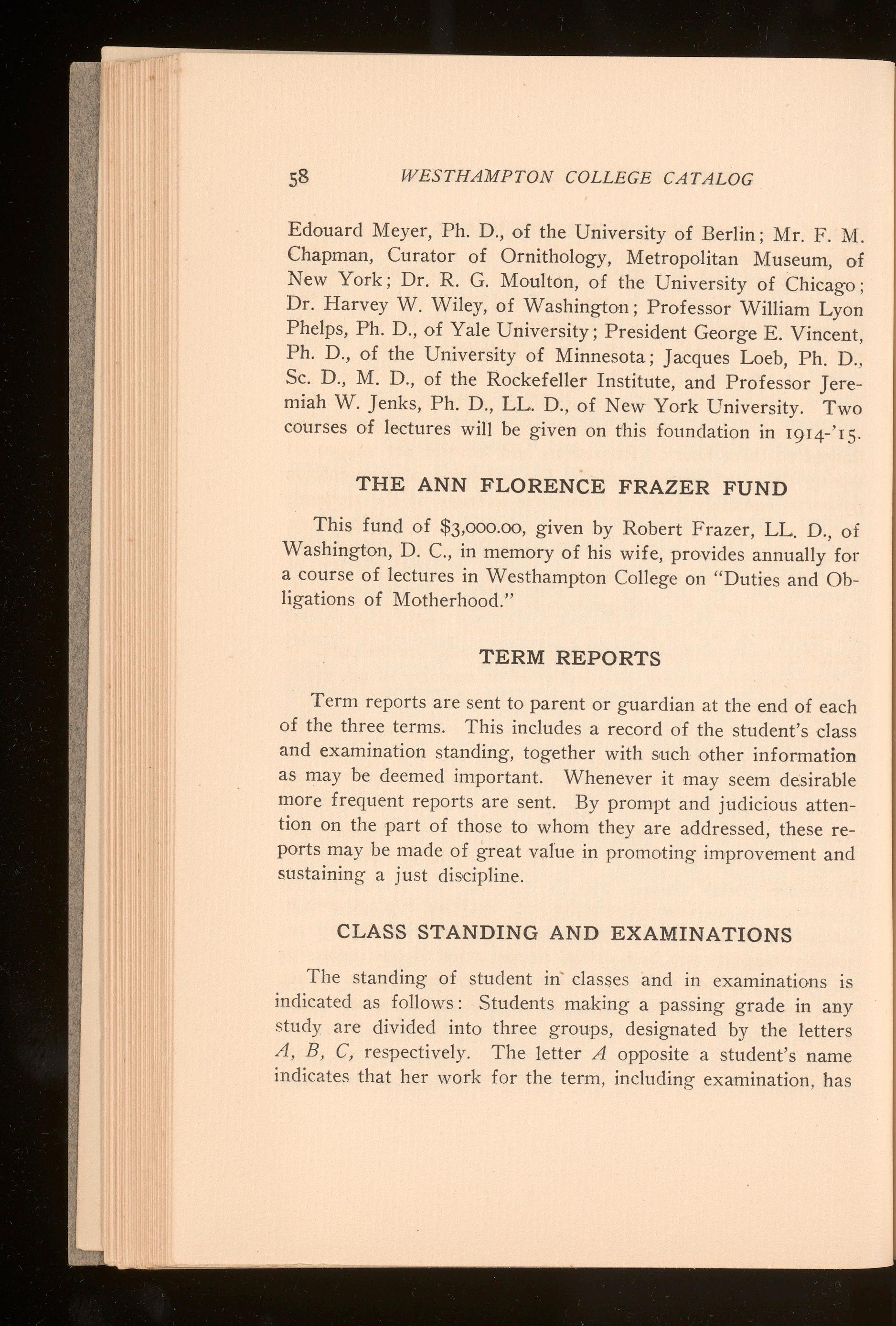
Edouard Meyer, Ph. D., of the University of Berlin; Mr. F. M. Chapman, Curator of Ornithology, Metropolitan Museum, of New York; Dr. R. G. Moulton, of the University of Chicago; Dr. Harvey W. Wiley, of Washington; Professor William Lyon Phelps, Ph. D., of Yale University; President George E. Vincent, Ph. D., of the University of Minnesota; Jacques Loeb, Ph. D., Sc. D., M. D., of the Rockefeller Institute, and Professor Jeremiah W. Jenks, Ph.D., LL. D., of New York University. Two courses of le<:tures will be given on t'his foundation in 1914-'15.
This fund of $3,000.00, given by Robert Frazer, LL. D., of Washington, D. C., in memory of his wife, provides annually for a course of lectures in Westhampton College on "Duties and Obligations of Motherhood."
Term reports are sent to parent or guardian at the end of each of the three terms. This includes a record of the student's class and examination standing, together with s,uch other information as may be deemed important. Whenever it may seem desirable more frequent reports are sent. By prompt and judicious attention on the ,part of those to whom they are addressed, these reports may be made of great value in promoting improvement and sustaining a just discipline.
The standing of student in' classes and in examinations is indicated as follows: Students making a passing grade in any study are divided into three groups, designated by the letters A, B, C, respectively. The letter A opposite a student's name indicates that her work for the term, including examination, has
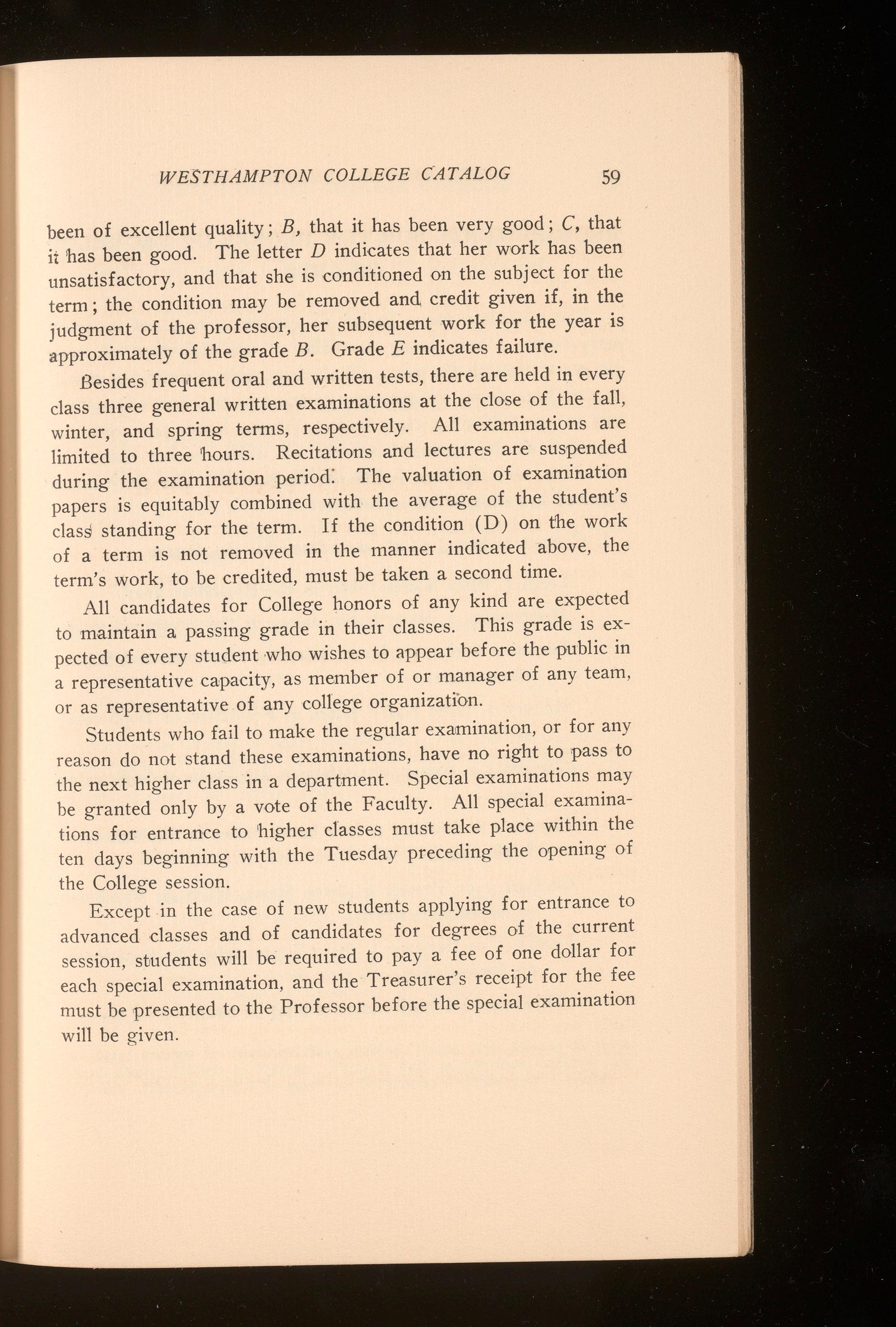
been of excellent quality; B, that it has been very good; C, that it has been good. The letter D indicates that her work has been unsatisfactory, and that she is conditioned on the subject for the term; the condition may be removed and credit given if, in the judgment of the professor, her subsequent work for the year is approximately of the grade B. Grade E indicates failure .
.Besides frequent oral and written tests, there are held in every class three general written examinations at the close of the fall, winter, and spring terms, respectively. All examinations are limited to three hours. Recitations and lectures are suspended during the examination period: The valuation of examination papers is equitably combined with the average of the student's class standing for the term. If the condition (D) on the work of a term is not removed in the manner indicated above, the term's work, to be credited, must be taken a second time.
All candidates for College honors of any kind are expected to maintain a passing grade in their classes. This grade is expected of every student •who wishes to appear before the public in a representative capacity, as member of or manager of any team , or as representative of any college organization.
Students who fail to make the regular examination, or for any reason do not stand these examinations, have no right to pass to the next higher class in a department. Special examinations may be granted only by a vote of the Faculty. All special examinations for entrance to 'higher classes must take place within the ten days beginning with the Tuesday preceding the opening of the College session.
Except in the case of new students applying for entrance to advanced classes and of candidates for degrees of the current session, students will be required to pay a fee of one dollar for each special examination, and the Treasurer's receipt for the fee must be presented to the Professor before the special examination will be given.
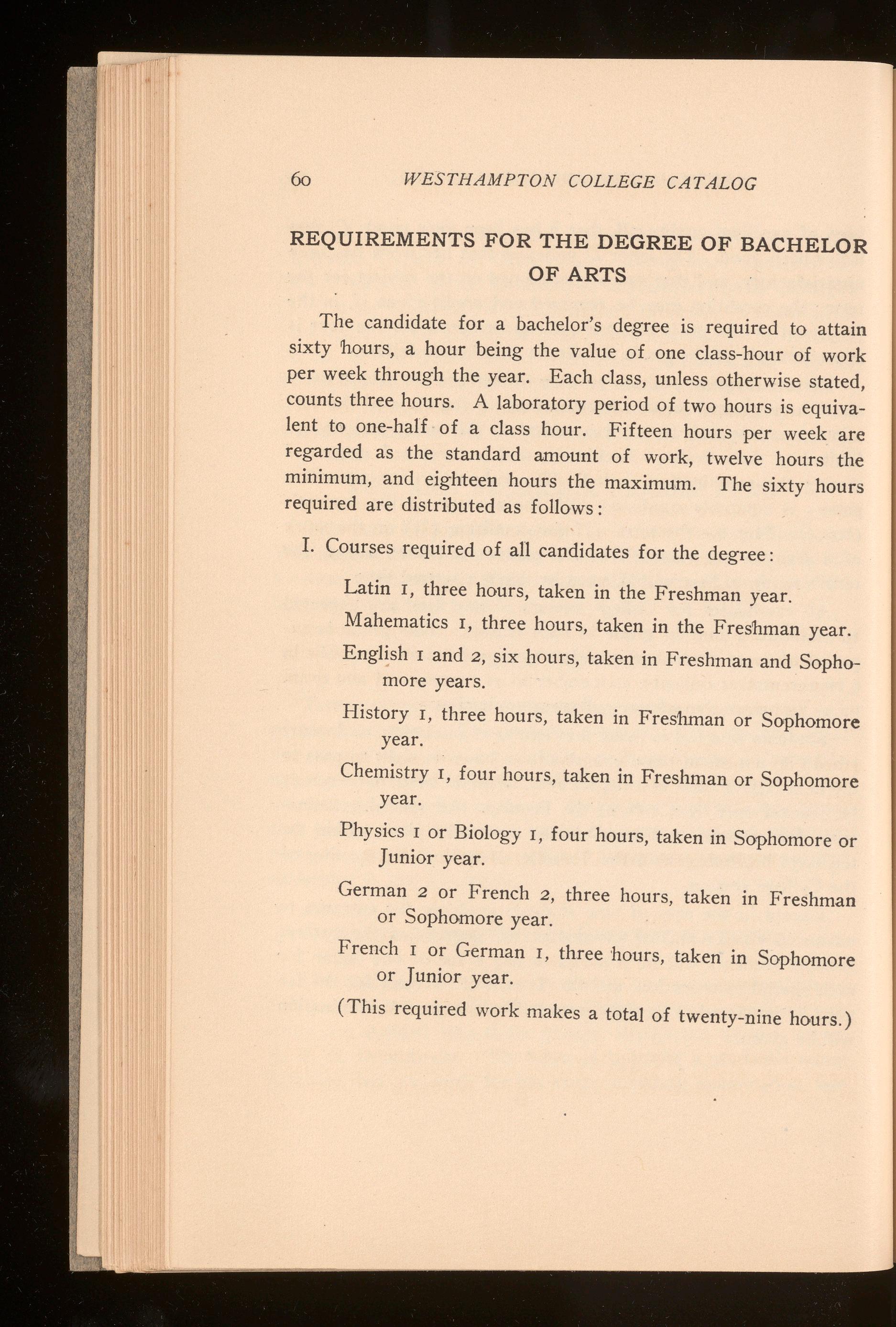
The candidate for a bachelor's degree is required to attain sixty 'hours, a hour being the value of one class-hour of work per week through the year. Each class, unless otherwise stated, counts three hours. A laboratory period of two hours is equiva- lent to one-half of a class hour. Fifteen hours per week are regarded as the standard amount of work, twelve hours the minimum, and eighteen hours the maximum. The sixty hours required are distributed as follows :
I. Courses required of all candidates for the degree :
Latin I, three hours, taken in the Freshman year.
Mahematics I, three hours, taken in the Freshman year. English I and 2, six hours, taken in Freshman and Sophomore years.
History I , three hours , taken in Freshman or Sophomore year .
Chemi stry I, four hours, taken in Freshman or Sophomore year.
Physics I or Biology I , four hours, taken in Sophomore or Junior year .
German 2 or French 2, three hours, taken in Freshman or Sophomore year.
French I or German I , three 'hours, taken in Sophomore or Junior year.
(This required work makes a total of twenty-nine hours.)
IL The · student must, before the end of the Sophomore year, choose two major subjects from the following list:
(I) Twelve hours in Latin.
(2) Nine hours in Greek.
(3) Twelve hours m Mathematics.
(4) Twelve hours 111 English and six hours in History.
(5) Twelve hours 111 History.
(6) Nine hours in Philosophy.
( 7) Twelve hours in one Science ( Physics, Chemistry, or Biology) and four ·hours in either of the other two.
(8) Fifteen hours in French and German.
III. 'The remaining thirteen hours ( or fourteen hours for students who take a science major) may be chosen at will, except that only three of these hours may be selected from Freshman courses.
N ote.-The number of hours specified in any subject includes the required work in that subject. It will he seen that each major adds to the student's course nine hours net, except a major in science, which adds eight hours above the required work.
Matriculation and incidental fee ....... $ 25 oo
Tuition in all subjects except music 100 oo
Table board . .
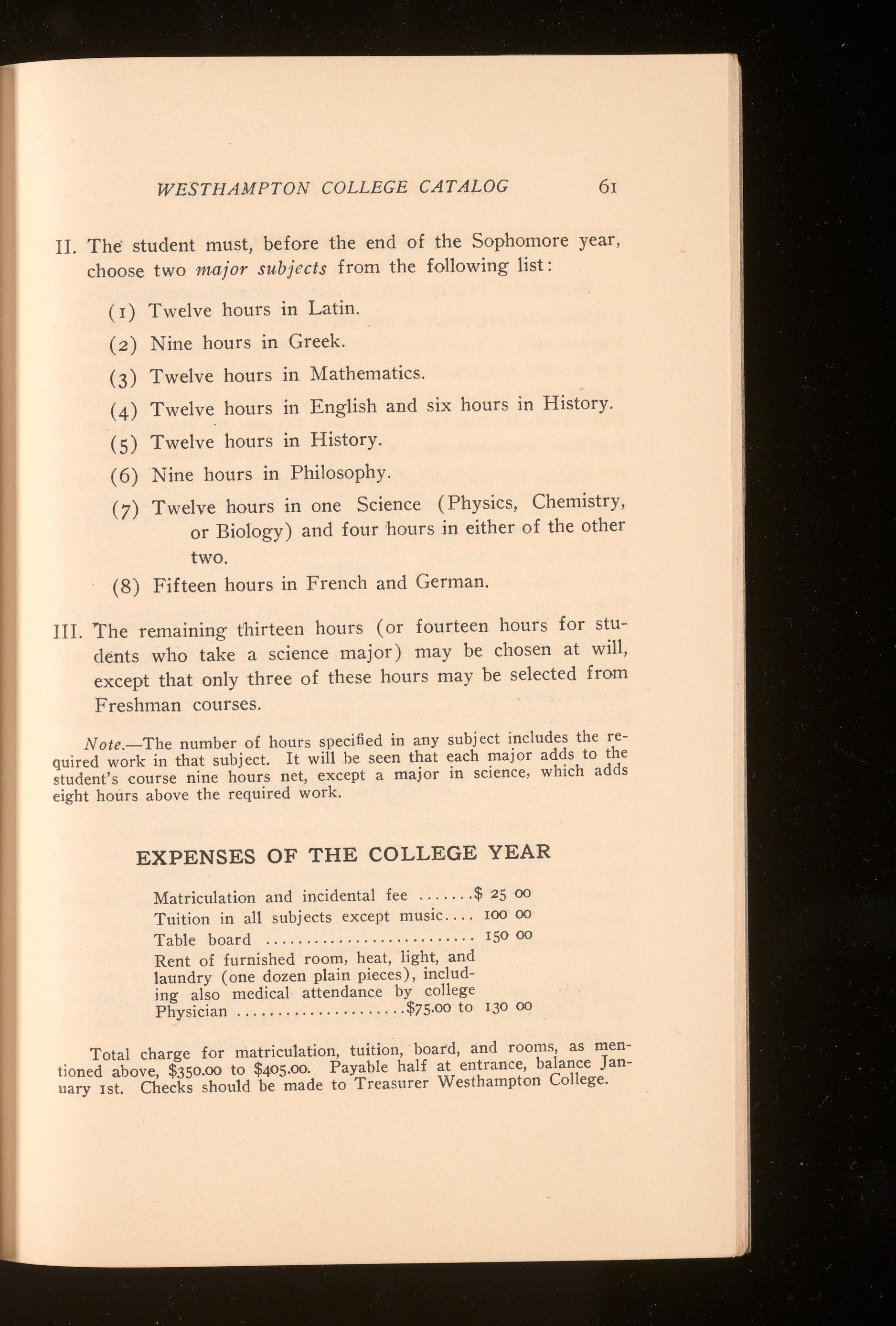
. 150 oo
Rent of furnished room, heat, light, and laundry ( one dozen plain pieces), including also medical attendance by college
Physician ..................... $75.00 to 130 oo
Total charge for matriculation, tuition, board, and rooms, as mentioned above, $350.00 to $405.00. Payable half at entrance, balance January 1st. Checks sho uld be made to Treasurer Westhampton College.
WESTHAMPTON COLLEGE CATALOG
Rooms for two students at charge to each occupant of:
$ 75.oo-u2A, 215, 305, 314, 320, 325, 41 r.
$ 85.oo-3o6.
$ 90.00-220, 304, 309, 3u.
$ 95.oo-3o8.
$roo.oo-ro8, III, u4, 124, 125, 231, 227, 226, 219, 216, 210, 212A, 208.
$II0.00-IIO, 212, 209, 202.
Rooms for one student at charge of :
$ 75.00-307, 312A 316, 317, 318, 319, 323, 324, 326, 404, 401, 402. 403, 405, 406, 407, 408, 409, 410.
$ 85.00-303, 302, 301, 322.
$ 95.00-315, 310.
$IOO.OO--II2, 122, I2I, II9, II8, 129, 229, 221, 223, 224, 214, 205, 200, 207, 201, 312.
$no.oo-109, II5, 120, n6, 117, 123, 228, 225, 217, 218, 222, 2l'I, 204, 203.
$130.00---230.
Doctor's Office-126.
Infirmary-128, 127.
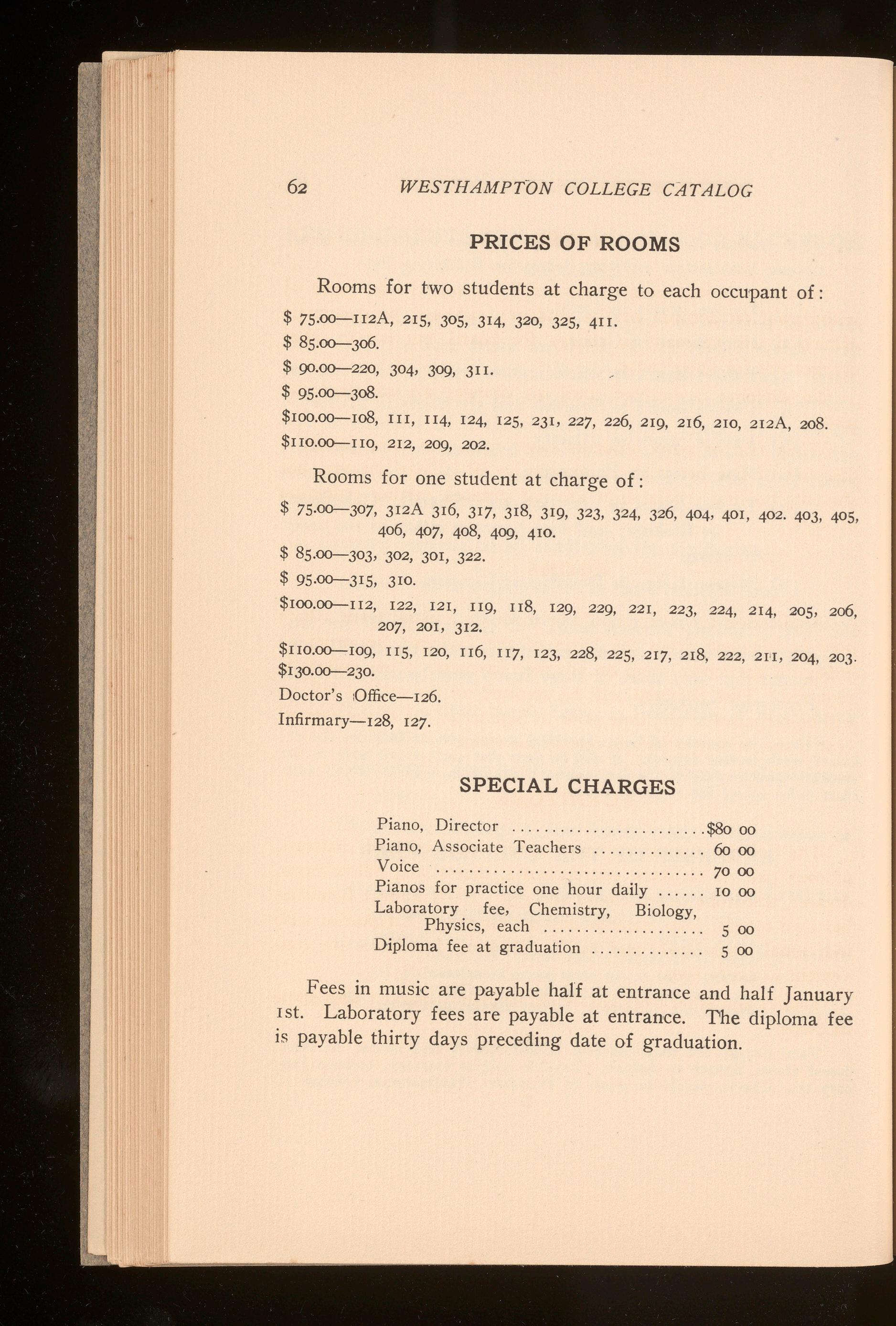
Piano, Direct or
Piano, Associate Teachers
Pianos for practice one hour daily
Laboratory fee, Chemistry, Biology, Physics, each
Diploma fee at graduation
Fees in music are payable half at entrance and half January 1st. Laboratory fees are payable at entrance. The diploma fee is payable thirty days preceding date of graduation.

Students are matriculated for a full session. In the event of withdrawal on account of the student's sickness, proportionate deduction will be made in charge for board, but not in other charges nor for other cause.
,No diploma is granted until al! charges are satisfactorily settled.
When two or more students enter from the same family a discount of five per cent. is allowed on all college charges( but students holding scholarships are not granted further reduction of fees.
Application for room should be made on a blank form, which may be obtained from the Dean of the College , In order to engage a particular room an advance payment of ten dollars is required . This payment will be credited on the college bill, or will be refunded at any time 1}rior to September Ist of the current year if the student wishes to release the room.
The College supplies students' rooms wit'h bedstead, mattress, pillows, pair of blankets, counterpanes, sheets, and pillow cases, dresser, wardrobe closet , chairs and rug. Each student furnishes her own towels, soap, napkins and napkin ring. Lavatories with individual wash-bowls and bubLle drinking fountains are convenient to every room.
Trunks and other baggage should be plainly marked with name of owner.
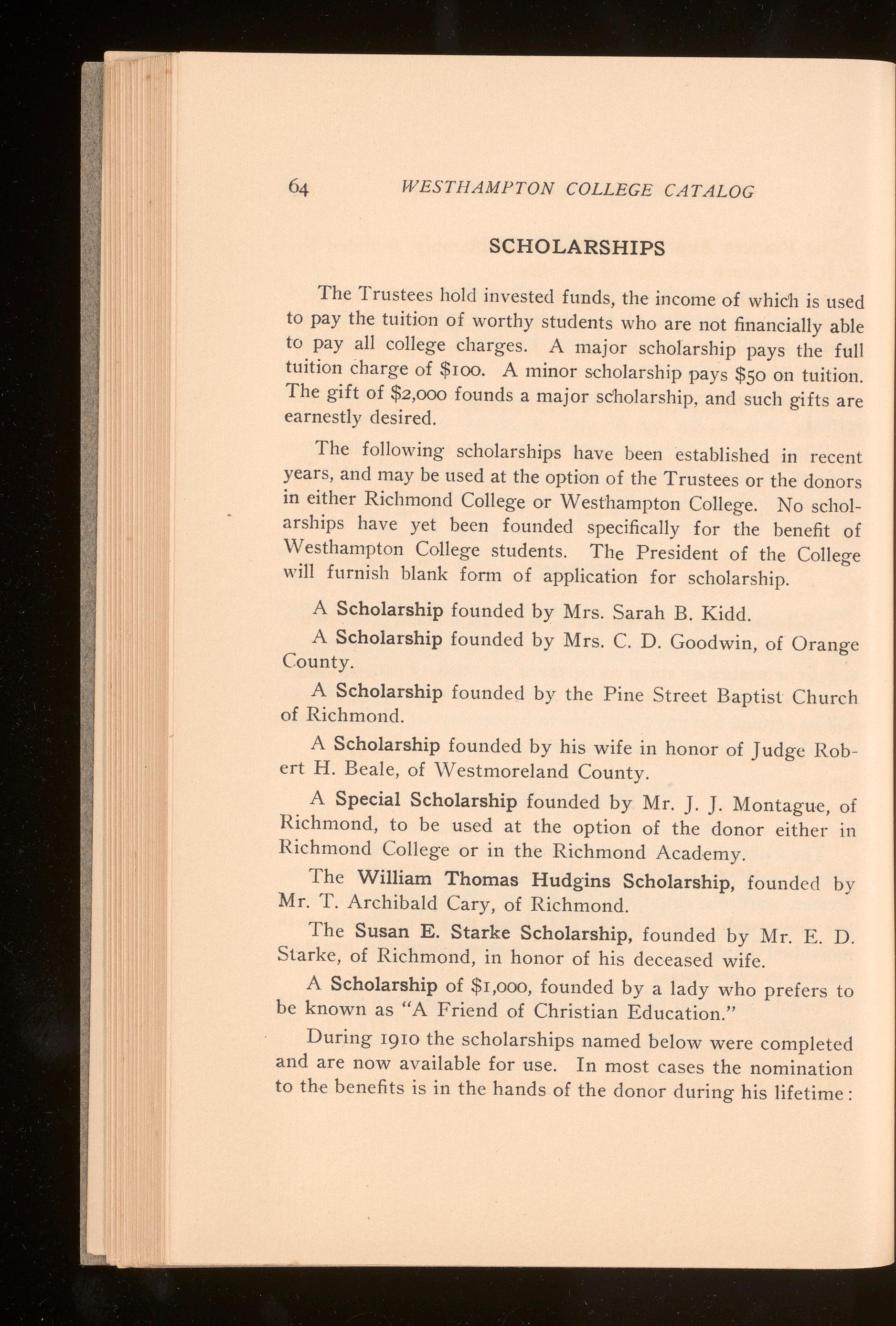
The Trustees hold invested funds, the income of which is used to pay the tuition of worthy students who are not financially able to pay all college charges. A major scholarship pays the full tuition charge of $100. A minor scholarship pays $50 on tuition. The gift of $2,000 founds a major scholarship, and such gifts are earnestly desired.
The following scholarships have been established in recent years, and may be used at the option of the Trustees or the donors in either Richmond College or Westhampton College. No scholarships have yet been founded specifically for the benefit of Westhampton College students. The President of the College will furnish blank form of application for scholarship.
A Scholarship founded by Mrs. Sarah B. Kidd.
A Scholarship founded by Mrs. C. D. Goodwin, of Orange County.
A Scholarship founded by the Pine Street Baptist Church of Richmond.
A Scholarship founded by his wife in honor of Judge Robert H. Beale, of vVestmoreland County.
A Special Scholarship founded by Mr. J. J. Montague, of Richmond, to be used at the option of the donor either in Richmond College or in the Richmond Academy.
The William Thomas Hudgins Scholarship, founded by Mr. T. Archibald Cary, of Richmond.
The Susan E. Starke Scholarship, founded by Mr. E. D . Starke, of Richmond, in honor of his deceased wife.
A Scholarship of $1,000, founded by a lady who prefers to be known as "A Friend of Christian Education."
During 1910 the scholarships named below were completed and are now available for use . In most cases the nomination to the benefits is in the hands of the donor during his lifetime:

The Frances Ann Leiper Crouch Scholarship, founded by D r. R. G. Crouch in honor of his wife.
The Luther Wright George Scholarship, founded by Mr. H . H. George, Jr. in memory of his son, who, at the time of his lamented death by accident, was a student in Richmond College .
The Eva Baker Gwathmey Scholarship, founded by Mr. Basil M. Gwathmey, of Richmond
The Robert Eugene Lockett Scholarship, founded by his parents, Capt. E. F. and Mrs. Lucy Lockett, of Crewe, ~a., to honor the memory of their son, a former student of Richmond College.
A Scholarship established by Mrs. Mary E. Winch and Mrs. Kate R. Winch, of Richmond.
A Scholarship established by Mr. W. E. Harris , of Richmond.
A Scholarship established by Mr. P. A. Fore, of Richmond
A Scholarship established by Mr. and Mrs. E T. Ivey , of N ewport News, Va.
A Special Scholarship founded b y Mr . R. L. Barnes , of Richmond .
A Scholarship founded by Mrs Martha P. Taylor, of Newport News, Va.
A Scholarship founded by Mr. Skye V Straley , of Princ eto n, \V. Va.
A Scholarship founded by Mr. John P. Branch , of Richmond, for the benefit of a student to be appointed by the ste wards of Centenary Methodist Episcopal Church, Richmond, Va.
The John P. Branch Scholarship, founded by Mr. M. C. Branch, of Richmond.
The E. Carrington Cabell Scholarship, founded by Mr. H.
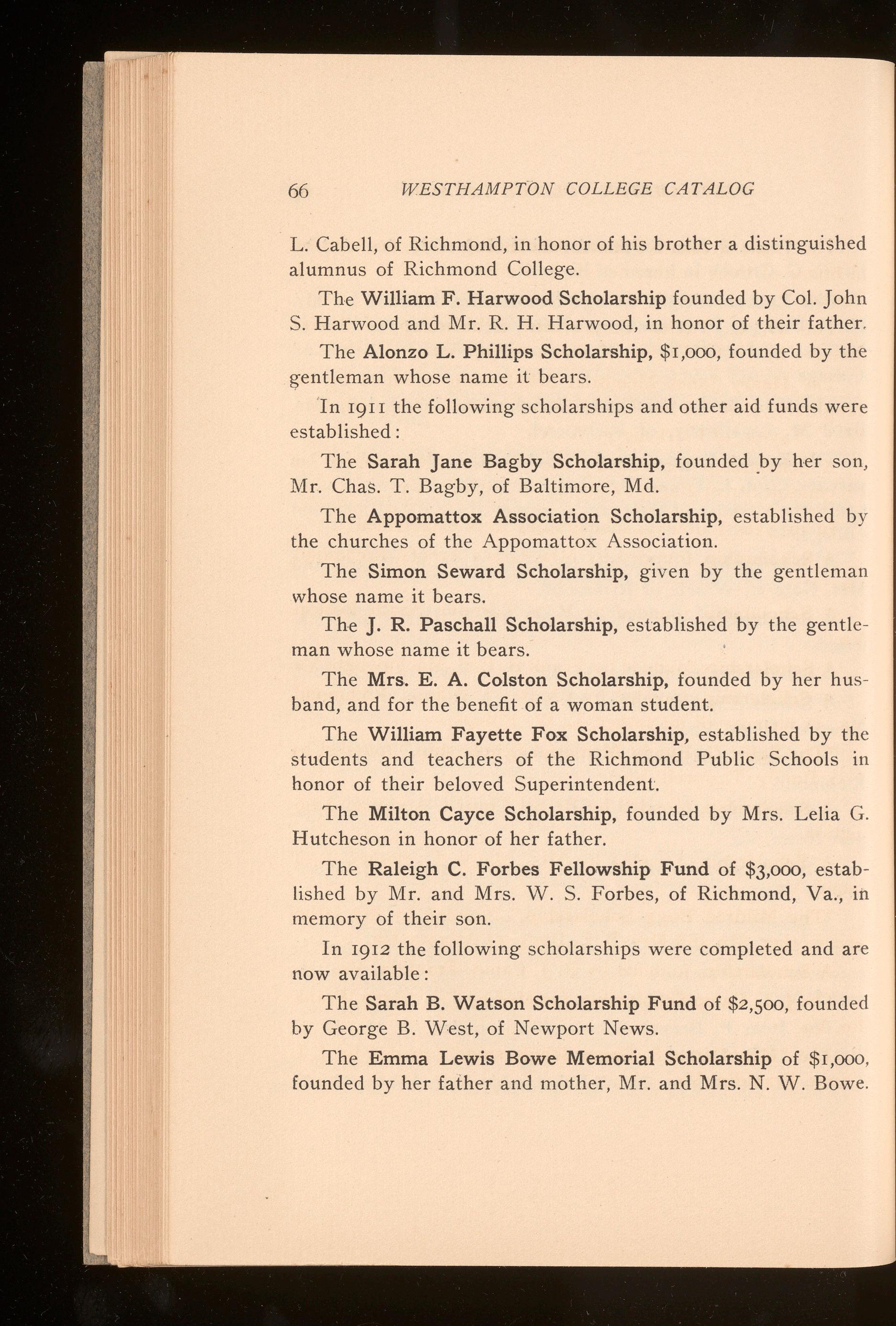
L. Cabell, of Richmond, in honor of his brother a distinguished alumnus of Richmond College.
The William F. Harwood Scholarship founded by Col. John S. Harwood and Mr. R. H. Harwood, in honor of their father .
The Alonzo L. Phillips Scholarship, $1,000, founded by the gentleman whose name it bears.
'In 19rr the following scholarships and other aid funds were established:
The Sarah Jane Bagby Scholarship, founded _by her son , Mr. Chas. T. Bagby, of Baltimore, Md.
The Appomattox Association Scholarship, established by the churches of the Appomattox Association.
The Simon Seward Scholarship, given by the gentleman whose name it bears.
The J. R. Paschall Scholarship, established by the gentleman whose name it bears.
The Mrs. E. A. Colston Scholarship, founded by her husband, and for the benefit of a woman student.
The William Fayette Fox Scholarship, established by the students and teachers of the Richmond Public Schools in honor of their beloved Superintendent.
The Milton Cayce Scholarship, founded by Mrs. Lelia G Hutcheson in honor of her father.
The Raleigh C. Forbes Fellowship Fund of $3,000, established by Mr. and Mrs. W. S. Forbes, of Richmond, Va., in memory of their son.
In 1912 the following scholarships were completed and are now available:
The Sarah B. Watson Scholarship Fund of $2,500, founded by George B. West, of Newport News.
The Emma Lewis Bowe Memorial Scholarship of $1,000 , founded by her father and mother, Mr. and Mrs. N. W. Bowe.
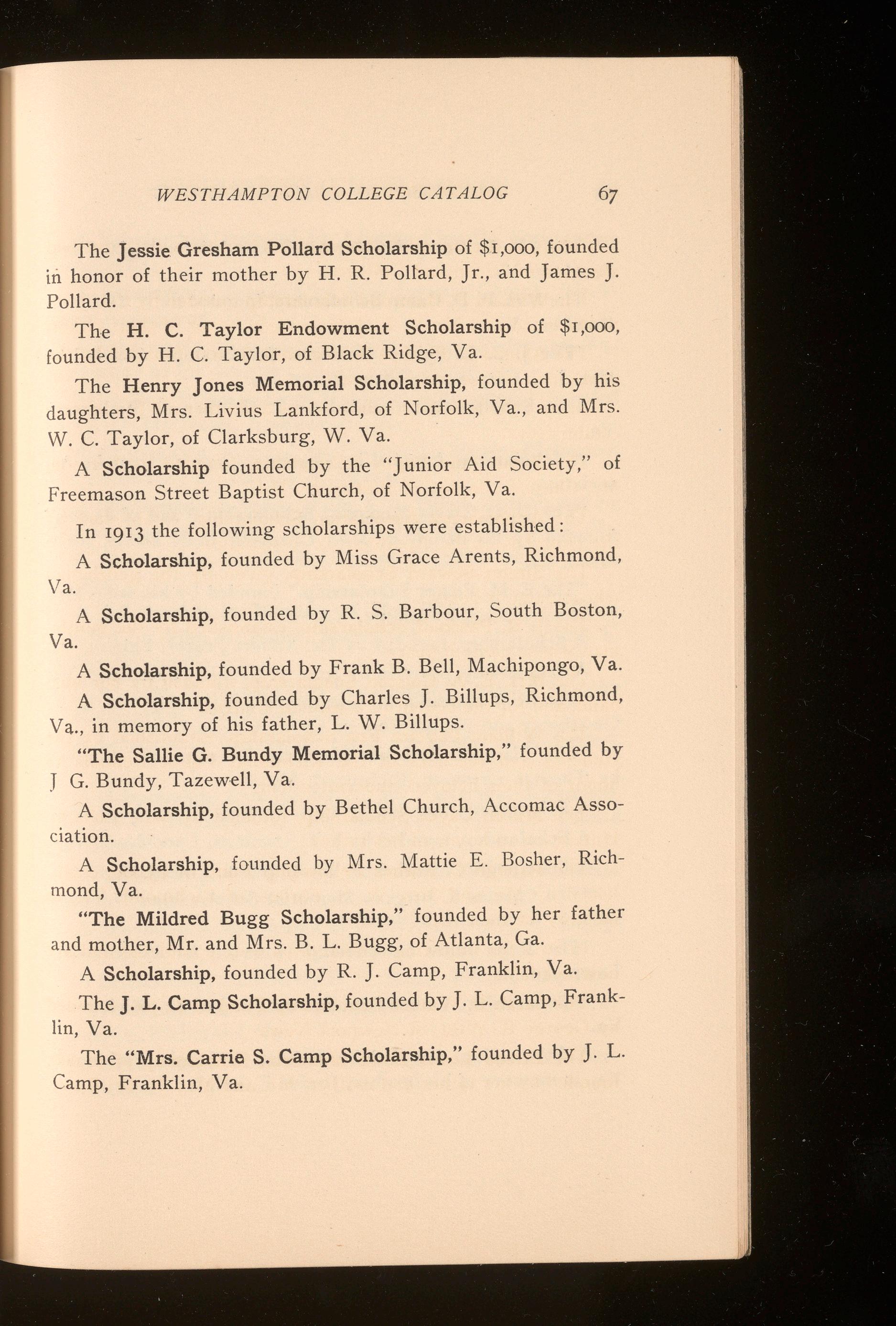
The Jessie Gresham Pollard Scholarship of $1,000, founded in honor of their mother by H. R. Pollard, Jr., and James J. P ollard.
The H. C. Taylor Endowment Scholarship of $1,000, founded by H C. Taylor , of Black Ridge, Va.
The Henry Jones Memorial Scholarship, founded by his daughters, Mrs. Livius Lankford, of Norfolk, Va. , and Mrs W . C. Taylor, of Clarksburg, W. Va.
A Scholarship founded by the "Junior Aid Society," of Freemason Street Baptist Church, of Norfolk, Va.
In 1913 the following scholarships were established :
A Scholarship, founded by Miss Grace Arents , Richmond, Va
A Scholarship, founded by R. S. Barbour , South Boston, Va.
A Scholarship, founded by Frank B. Bell, Machipongo, Va .
A Scholarship, founded by Charles J. Billups, Richmond, Va., in memory of his father, L. W. Billups.
"The Sallie G. Bundy Memorial Scholarship," founded by J G. Bundy, Tazewell, Va.
A Scholarship, founded by Bethel Church, Accomac Association.
A Scholarship, founded by Mrs. Mattie E . Bosher , Richmond, Va.
"The Mildred Bugg Scholarship," founded by her father and mother, Mr. and Mrs. B. L. Bugg, of Atlanta, Ga.
A Scholarship, founded by R. J. Camp, Franklin, Va.
The J. L. Camp Scholarship, founded by J. L. Camp, Franklin, Va.
The "Mrs. Carrie S. Camp Scholarship," founded by J. L. Camp, Franklin, Va.
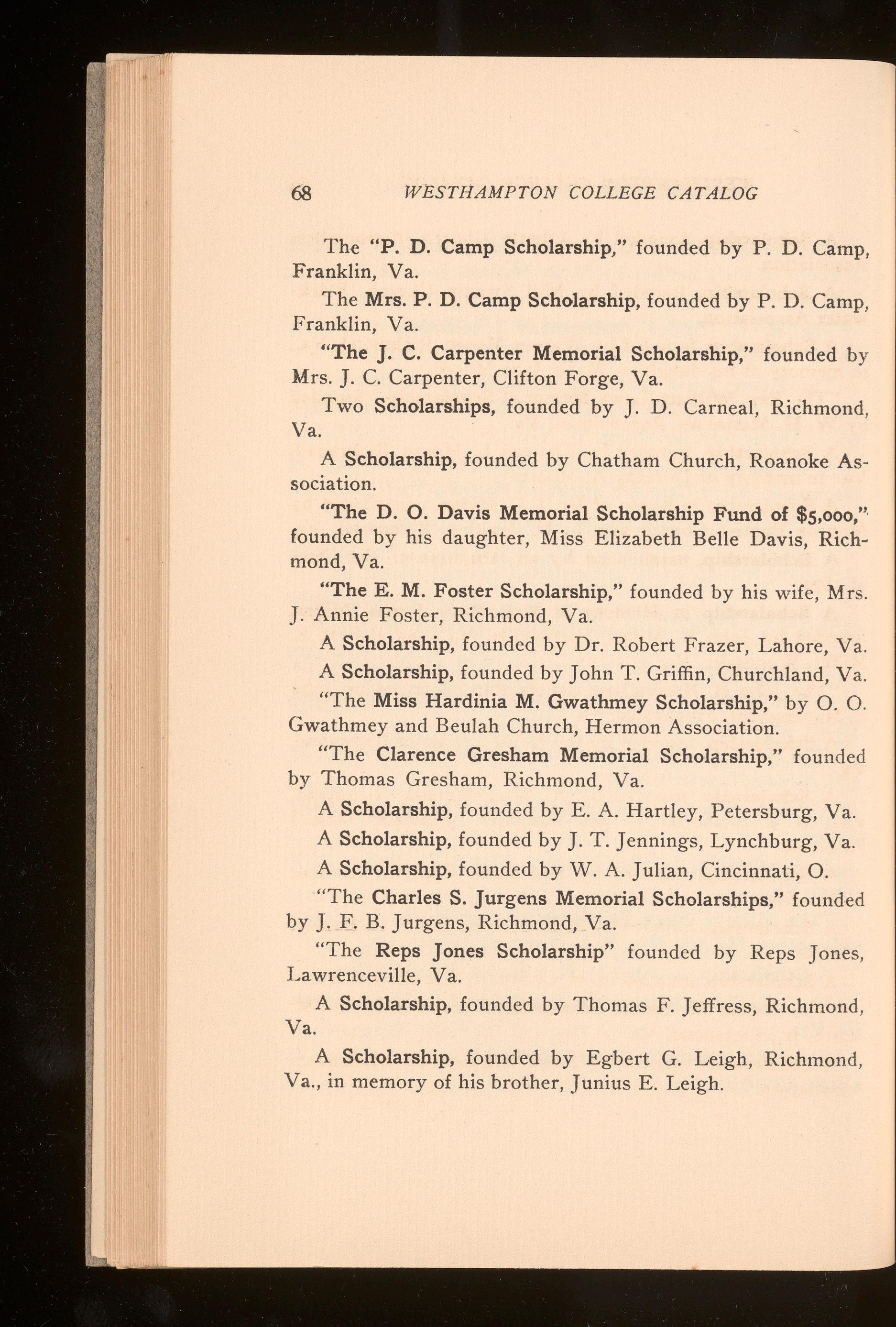
The "P. D. Camp Scholarship," founded by P. D. Camp , Franklin, Va.
The Mrs. P. D. Camp Scholarship, founded by P. D. Camp , Franklin, Va.
"The J. C. Carpenter Memorial Scholarship," founded b y Mrs. J . C. Carpenter, Clifton Forge, Va.
Two Scholarships, founded by J . D. Carneal, Richmond , Va.
A Scholarship, founded by Chatham Church , Roanoke Association.
"The D. 0. Davis Memorial Scholarship Fund of $5,000, " · founded by his daughter , Miss Elizabeth Belle Davis, Rich~ mond, Va.
"The E. M. Foster Scholarship," founded by his wife, Mr s. J . Annie Foster , Richmond , Va .
A Scholarship, founded by Dr. Robert Frazer, Lahore, Va .
A Scholarship, founded by John T Griffin, Churchland, V a.
"The Miss Hardinia M. Gwathmey Scholarship," by 0 . 0 . Gwathmey and Beulah Church, Hermon Association.
"The Clarence Gresham Memorial Scholarship," foun ded by Thomas Gresham, Richmond, Va.
A Scholarship, founded by E. A. Hartley, Petersburg, Va.
A Scholarship, founded by J . T. Jennings, Lynchburg, Va .
A Scholarship, founded by W. A. Julian, Cincinnati, 0.
"The Charles S. Jurgens Memorial Scholarships," founded by J. F B. Jurgens, Richmond, Va.
"The Reps Jones Scholarship" founded by Reps Jone s, Lawrenceville, Va.
A Scholarship, founded by Thomas F. Jeffress, Richmond , Va .
A Scholarship, founded by Egbert G. Leigh, Richmond , Va , in memory of his brother, Junius E. Leigh.
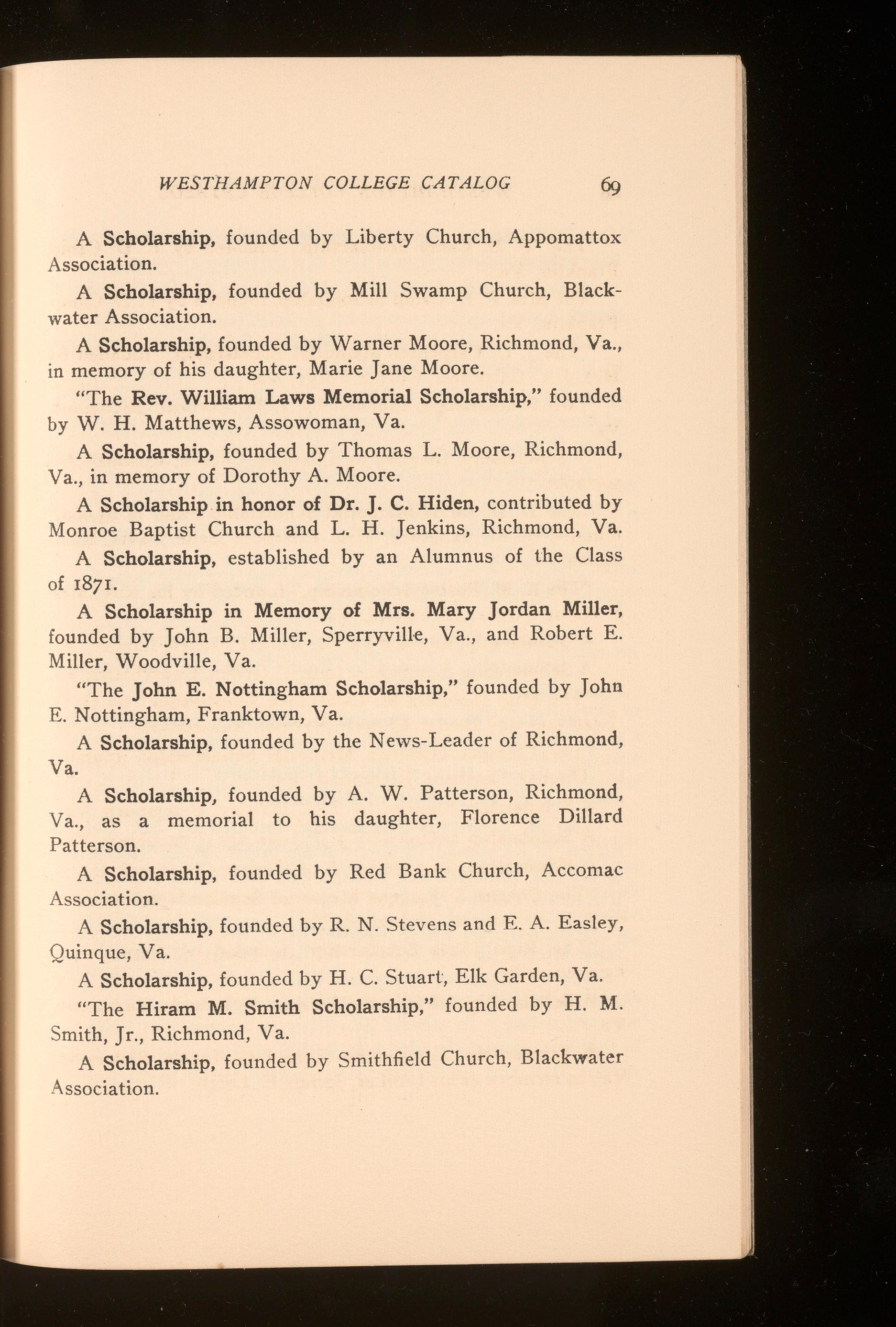
A Scholarship, founded by Liberty Church, Appomattox Association.
A Scholarship, founded by Mill Swamp Church, Blackwater Association.
A Scholarship, founded by Warner Moore, Richmond, Va ., in memory of his daughter, Marie Jane Moore.
" The Rev. William Laws Memorial Scholarship," founded by W. H. Matthews, Assowoman, Va.
A Scholarship, founded by Thomas L. Moore, Richmond, V a , in memory of Dorothy A. Moore .
A Scholarship in honor of Dr. J. C. Hiden, contributed by Monroe Baptist Church and L. H. Jenkins, Richmond, Va.
A Scholarship, established by an Alumnus of the Class of 1871.
A Scholarship in Memory of Mrs. Mary Jordan Miller, founded by John B. Miller, Sperryville, Va. , and Robert E. Miller, Woodville, Va.
"The John E. Nottingham Scholarship," founded by John E . Nottingham, Franktown, Va
A Scholarship, founded by the News-Leader of Richmond, V a.
A Scholarship, founded by A . W . Patterson, Richmond , Va ., as a memorial to his daughter, Florence Dillard Pa tterson.
A Scholarship, founded by Red Bank Church , Accomac Ass ociation.
A Scholarship, founded by R. N. St ev ens and E. A. Easley , Qu inque, Va .
A Scholarship, found e d by H. C. Stuart , Elk Garden, Va.
" The Hiram M. Smith Scholarship," founded by H . M . Sm ith, Jr. , Richmond, Va.
A Scholarship, founded by Smithfield Church , Blackwater Association.
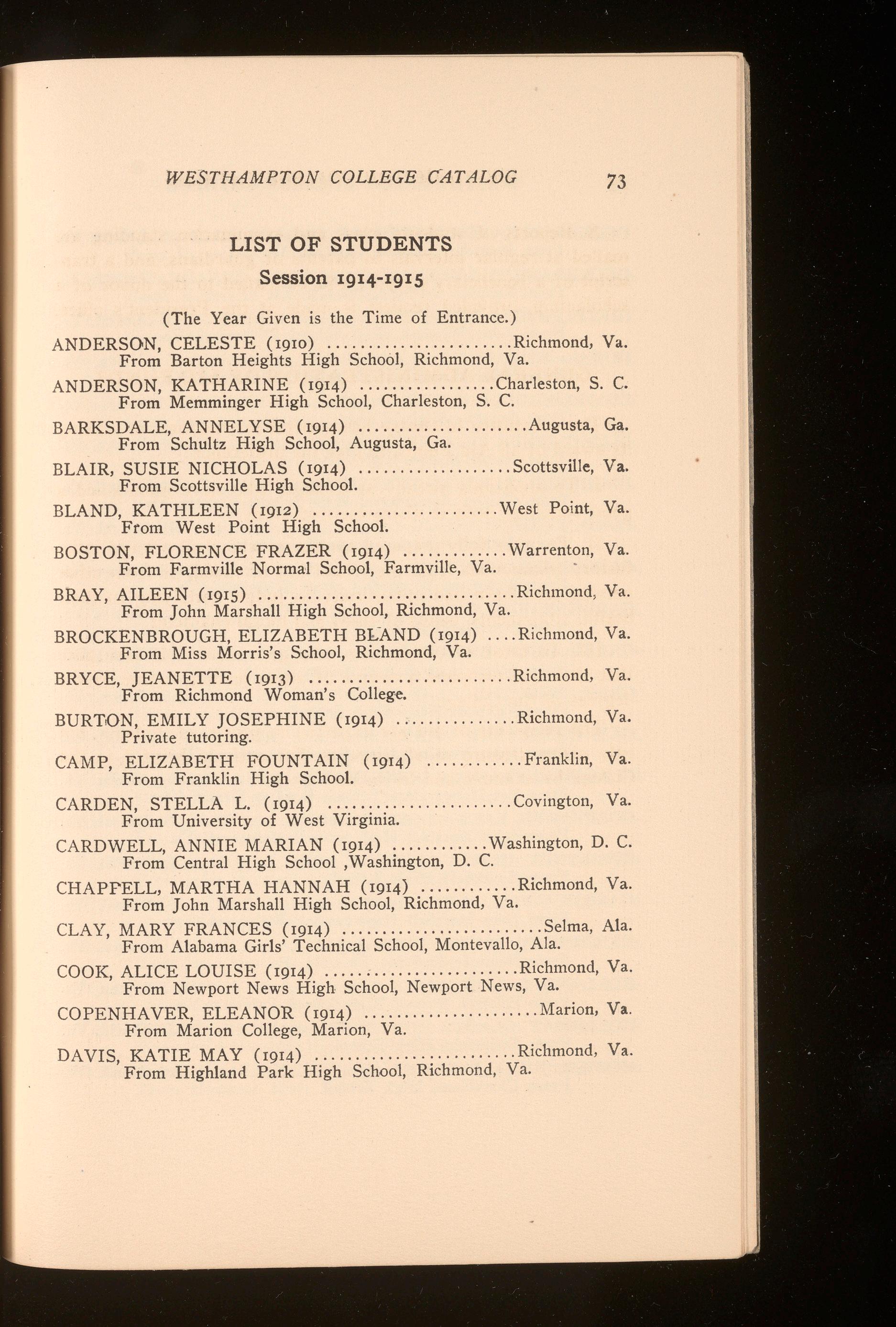
(The Year Given is the Time of Entranc e.)
ANDERSON, CELESTE (1910) .... .. . Richmond, Va.
From Barton Heights High School, Richmond, Va.
ANDERSON, KATHARINE (1914) ...... .. Charleston, S C.
From Memminger High School, Charleston, S. C.
BARKSDALE, ANNELYSE (1914) .. ... ....... Augusta, Ga.
From Schultz High School, Augusta, Ga.
BLAIR, SUSIE NICHOLAS (1914) . .. .. . Scottsville, Va.
From Scottsville High School.
BLAND, KATHLEEN (1912) ....... West Po int, Va.
From West Point High School.
BOSTON, FLORENCE FRAZER (1914) .... .. .. . .... Warrenton, Va.
From Farmville Normal School, Farmville, Va ·
BRAY, AILEEN (1915) ........... .. ...... Richmond , Va.
From John Marshall High School, Richmond, Va.
BROCKENBROUGH, ELIZABETH Bl.AND (1914) ... R ichmond, Va.
From Miss Morris's School, Richmond, Va.
BRYCE, JEANETTE (1913) ... ...... . ...... Richmond, Va.
From Richmond Woman's College.
BURTON , EMILY JOSEPHINE (1914) ....... Richmond , Va.
Private tutoring.
CAMP, ELIZABETH FOUNTAIN (1914) .. .. .... Franklin, Va.
From Franklin High School.
CARDEN, STELLA L. (1914) .... . ... . . . Covington, Va.
From University of West Virginia
CARDWELL , ANNIE MARIAN (1914) . . . .. Washington, D. C.
From Central High School ,Washington, D. C.
CHAPPELL, MARTHA HANNAH (1914) . Richmond, Va.
From John Marshall High School, Richmond , Va.
CLAY, MARY FRANCES (1914) .... ..... . .. . . Selma, Ala.
From Alabama Girls' Technical School, Montevall o, Ala.
COOK, ALICE LOUISE (1914) .. ... ... .. Richmond, Va.
From Newport News High School, Newport News, Va.
COPENHAVER , ELEANOR (1914) .. ... . ..... Mari on, Va.
From Marion College, Marion, Va
D AVIS, KATIE MAY (1914) .. . .. ..... .... Ri chmond , Va
From Highland Park High School, Richm ond , V a.
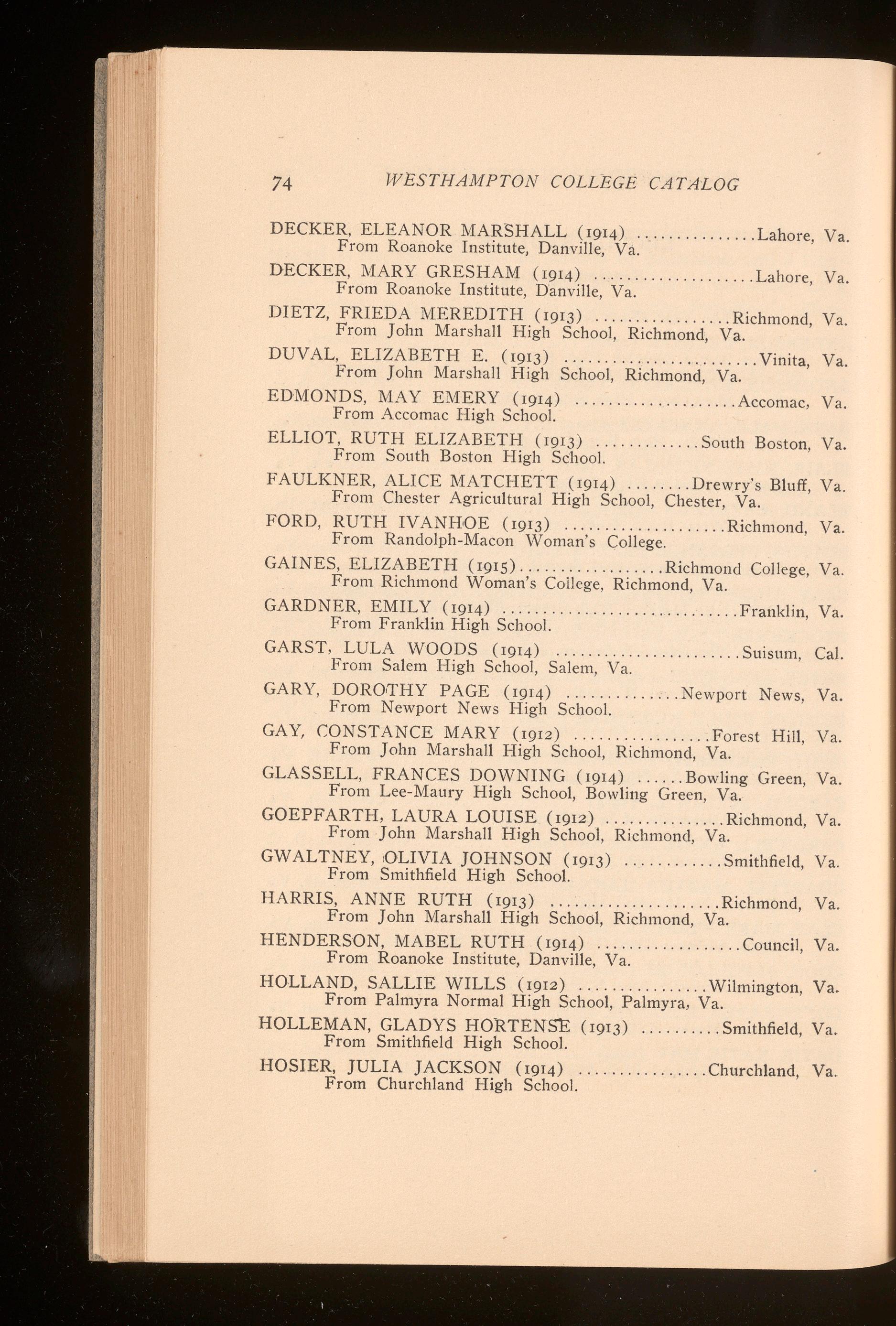
DECKER, ELEANOR MARSHALL (1914) ...... Lahore, Va. From Roanoke Institute, Danville, Va.
DECKER, MARY GRESHAM (1914) .. . ......... Lahore, Va. From Roanoke Institute, Danville, Va.
DIETZ, FRIEDA MEREDITH (1913) ... . . .. ... Richmond, Va. From John Marshall High School, Richmond, Va.
DUVAL, ELIZABETH E. (1913) ....... ............ Vinita, Va. From John Marshall High School, Richmond, Va.
EDMONDS, MAY EMERY (1914) .. .. .. Accomac, Va. From Accomac High School.
ELLIOT, RUTH ELIZABETH (1913) .... .... South Boston, Va. From South Boston High School.
FAULKNER, ALICE MATCHETT (1914) . . ...... Drewry°s Bluff, Va. From Chester Agricultural High School, Chester, Va.
FORD, RUTH IVANHOE ( 1913) ...... ... Richmond, Va. From Randolph-Macon Woman's College.
GAINES, ELIZABETH (1915) .................. Richmond College, Va. From Richmond Woman's Coilege, Richmond, Va.
GARDNER, EMILY (1914) ............................. Franklin, Va. From Franklin High School.
GARST, LULA WOODS (1914) ......... . .... Suisum, Cal. From Salem High School, Salem, Va.
GARY, DOROTHY PAGE (1914) ...... . ....... Newport News, Va. From Newport News High School.
GAY, CONSTANCE MARY (1912) ............. .. .. Forest Hill, Va. From John Marshall High School, Richmond, Va.
GLASSELL, FRANCES DOWNING (1914) ...... Bowling Green, Va. From Lee-Maury High School, Bowling Green, Va.
GOEPFARTH, LAURA LOUISE (1912) ............... Richmond, Va. From John Marshall High Schoo l, Richmond, Va.
GWALTNEY, OLIVIA JOHNSON (1913) ............ Smithfield, Va. From Smithfield High School.
HARRIS, ANNE RUTH (1913) ..................... Richmond, Va. From John Marshall High School, Richmond, Va.
HENDERSON, MABEL RUTH (1914) ........ . Council, Va. From Roanoke Institute, Danville, Va.
HOLLAND, SALLIE WILLS (1912) ......... ...... Wilmington, Va. From Palmyra Normal High School, Palmyra, Va.
HOLLEMAN, GLADYS HORTENSE (1913) .......... Smithfield, Va. From Smithfield High School.
HOSIER, JULIA JACKSON (1914) ..... . .. . Churchland, Va. From Churchland High School.
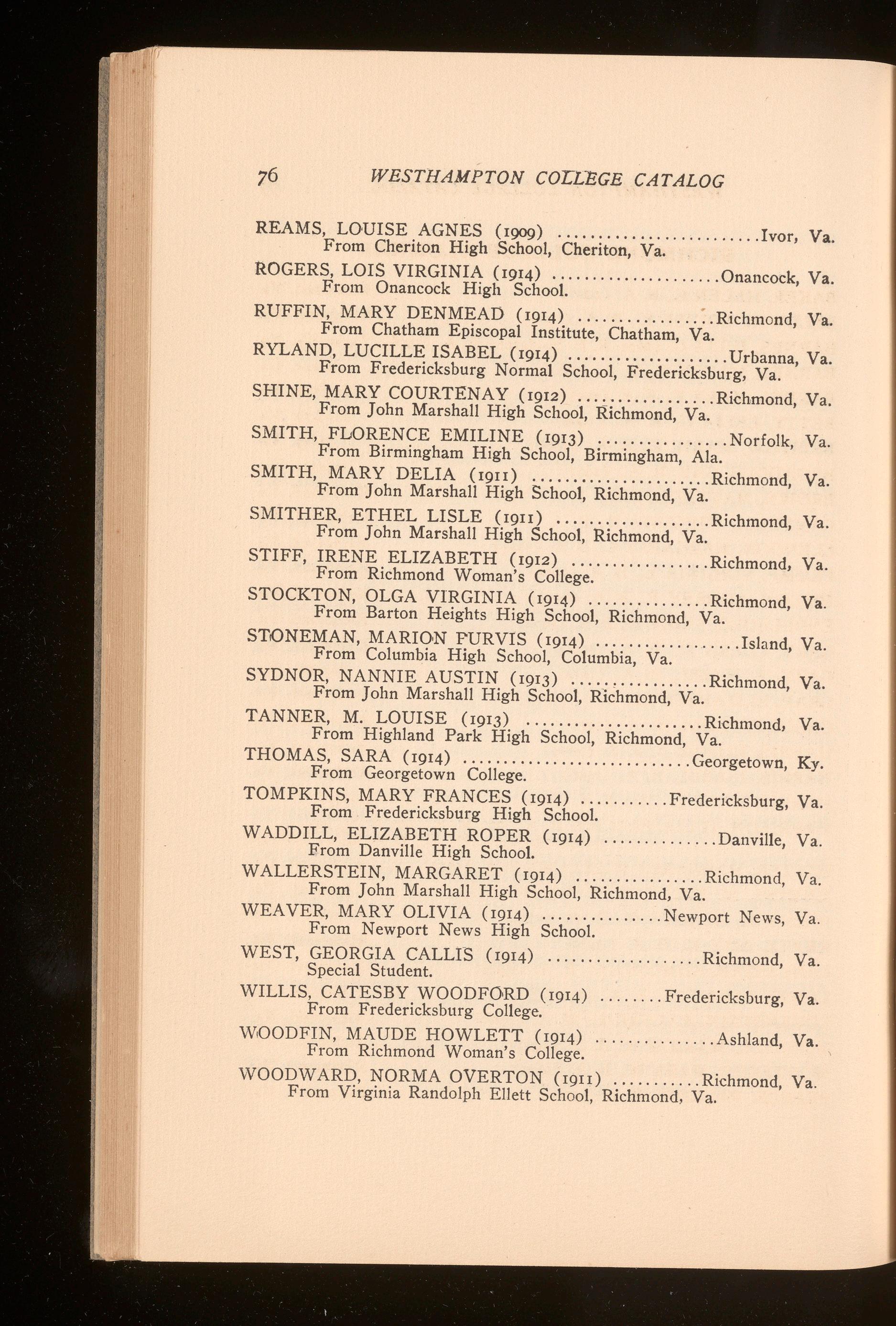
WESTHAMPTON COr:LBGE CATALOG
REAMS, LOUISE AGNES (1909) .............. .. .. . Ivor, Va.
From Cheriton High School, Cheriton, Va.
ROGERS, LOIS VIRGINIA (1914) ... ... ............ Onancock, Va .
From Onancock High School.
RUFFIN, MARY DENMEAD (1914) ... . .. . '. .Richm ond, Va.
From Chatham Episcopal Institute, Chatham, Va
RYLAND, LUCILLE ISABEL (1914) .. ........ ... . Urbanna, Va.
From Fredericksburg Normal School, Fredericksburg, Va.
SHINE, MARY COURTENAY (1912) . . . .. ...... Richmond, Va.
From John Marshall High School, Richmond, Va.
SMITH, FLORENCE EMILINE (1913) .. ... . . Norfolk, Va.
From Birmingham High School, Birmingham, Ala.
SMITH, MARY DELIA (1911) .... ............ . .... Richm ond, Va.
From John Marshall High School, Richm ond, Va.
SMITHER, ETHEL LISLE (1911) . . ...... .... Richmond, Va.
From John Marshall High School, Richm ond, Va.
STIFF, IRENE ELIZABETH (1912) ........ . . . .. Richmond, Va.
From Richmond Woman ' s College.
STOCKTON, OLGA VIRGINIA (1914) . . ... . Richm ond, Va .
From Barton Heights High School, Richmond, Va .
STONEMAN, MARION PURVIS (1914) . ... .. . .. Isl and, Va .
From Columbia High School, Columbia, Va .
SYDNOR, NANNIE AUSTIN (1913) , . . .. Richmond, Va.
From John Marshall High School, Richmond, Va.
TANNER, M. LOUISE (1913) .. . . .. ... . . Richmond, Va
From Highland Park High School, Richmond, Va .
THOMAS, SARA (1914) ....... .. . . .. . . Georgetown, Ky.
From Georgetown College.
TOMPKINS, MARY FRANCES (1914) .... .... Frederick sburg, Va.
From Fredericksburg High School.
WADDILL, ELIZABETH ROPER (1914) ... . .......... Danville, Va.
From Danville High School.
WALLERSTEIN, MARGARET (1914) .. . ........ Ri chmond, V a.
From John Marshall High School, Richmond, Va .
WEAVER, MARY OLIVIA (1914) . ..... N ewport N ews, V a.
From Newport N ews High School.
WEST, GEORGIA CALLIS (1914) . . ....... .. Richm ond, Va. Special Student.
WILLIS , CATESBY WOODFORD (1914 ) . . Fredericksburg, Va .
From Fredericksburg College.
WOODFIN, MAUDE HOWLETT (1914) . .. ..... Ashland, Va.
From Richmond Woman ' s College
WOODWARD , NORMA OVERTON (1911) . . . ........ Richmond, Va .
From Virgin ia R and olph E llett School, Richmond , Va.
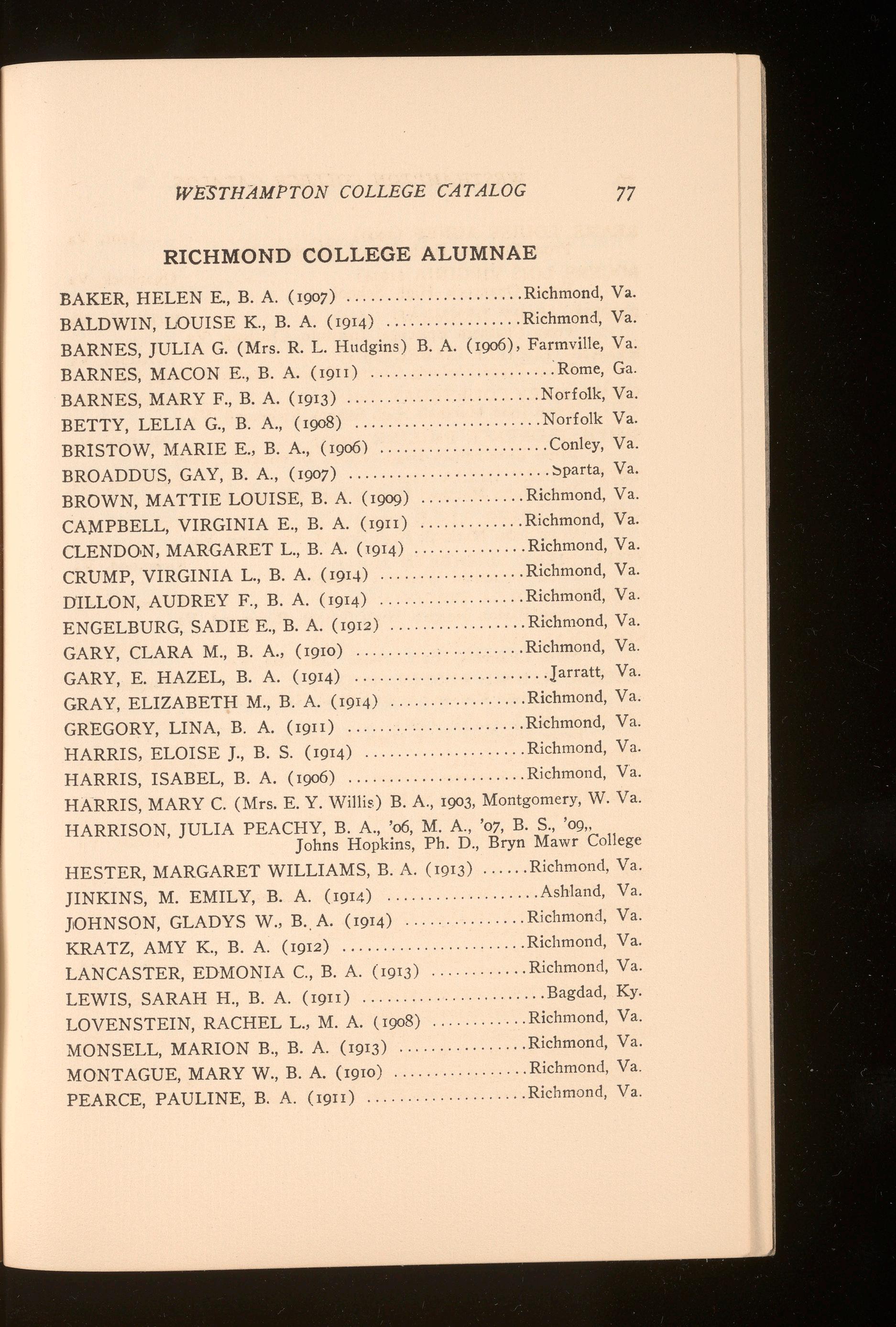
WESTHAMPTON COLLEGE C"ATALOG 77
BAKER, HELEN E., B A. ( 1907) .. ..... . . .. Richmond, Va .
BALDWIN , LOUISE K., B. A. (1914 ) . .. .. .. Richmond , Va.
BARNES, JULIA G. (Mrs. R. L. Hudgin s) B. A. (1900) , Farmville, Va
BARNES, MACON E., B. A. (19u) .. . . ... : Rome , Ga
BARNES, MARY F., B. A (1913) .. .. ............ Norfolk, V a
BETTY, LELIA G., B. A. , (1908) .. . .. . . .. ...... N orfolk Va.
BRISTOW, MARIE E ., B. A., (19o6) . ..... ...... Conley, Va
BROADDUS, GAY, B . A., (1907) .. .. ......... ::,parta, Va.
BROWN, MATTIE LOUISE, B. A . (1909 ) . . .. ... Richmond , Va.
CAMPBELL, VIRGINIA E., B A . (1911) ....•... .. Richmond, Va
CLENDON, MARGARET L., B . A (1914 ) .. . . . ... Richmond, Va
CRUMP, VIRGINIA L., B. A. (19q) ..... Richmond, Va
DILLON, AUDREY F., B. A. (1914) . ..... .. .. Richm ona, Va
ENGELBURG, SADIE E. , B. A. (191 2) ... ....... Richmond , Va .
GARY, CLARA M , B. A ., (1910) ... . .... . Richm ond , V a.
GARY, E . HAZEL, B A. (1914) . . . ... .... Jarratt, Va.
GRAY, ELIZABETH M. , B. A. (1914 ) . ... Richmond, Va.
GREGORY, LINA, B. A. (19u) ...... ...... Richm ond, V a.
HARRIS , ELOISE J., B. S . (1914) .. .......... .. .. R ichm ond , Va.
HARRIS , ISABEL, B. A. ( 1900) . ...... .. . Ri chmond, Va .
HARRIS , MARY C. (Mrs E Y . Will i ) B. A., 1903, Montgom ery , W. Va
HARRISON, JULIA PEACHY, B . A ., 'o6, M. A. , '07, B. S., ' 09,, J ohns Hopkin s, Ph. D ., Bryn Ma wr College
HESTER, MARGARET WILLIAMS, B. A. ( 19 13) .. .. . . Richmond , Va
JINKINS, M. EMILY, B. A. (191 4 ) ............. ..... Ashland, Va.
JOHNSON, GLADYS W. , B. . A. (1914) ... .... R ichmond, Va
KRATZ, AMY K. , B. A (1912) .. . . . ...... Richmond , Va.
LANCASTER, EDMONIA C., B. A. (191 3) . . . . . Richmon d, V a. LEWIS, SARAH H., B. A. (19u) . ........... . ... Bagdad, Ky
LOVENSTEIN, RACHELL., M.A. ( 1908) .......... . . Richmond, Va
MONSELL, MARION B., B. A. (1913 ) . . . Richmond, Va.
MONTAGUE, MARY W. , B. A. (19ro ) . .... .. .. Richmond , Va.
PEARCE, PAULINE, B A . ( 19u) .. .... . .. Richm ond , Va .
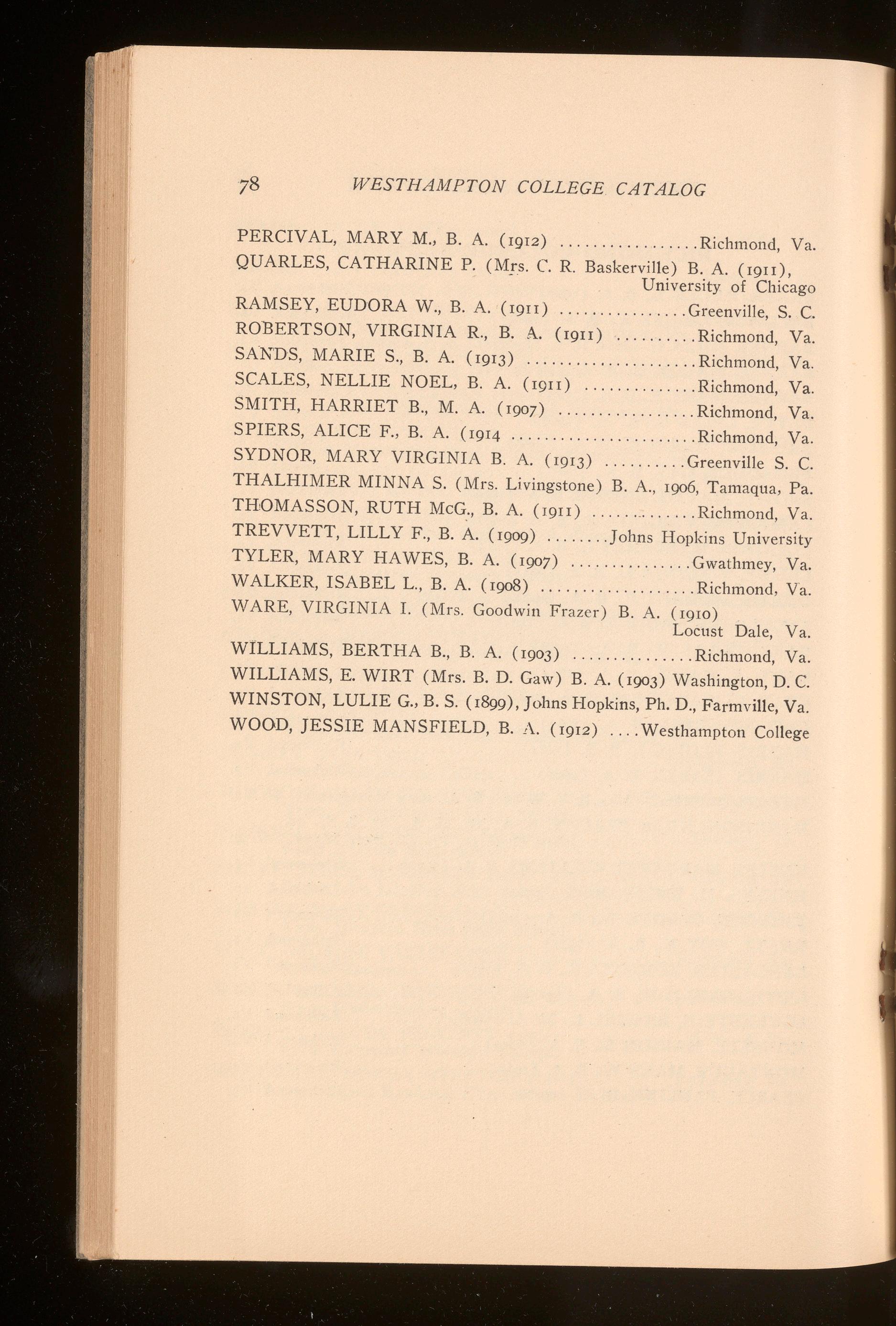
PERCIVAL, MARY M., B. A. (19t2) .......... ... Richmond, Va.
QUARLES, CATHARINE P. (Mrs. C. R. Baskerville) B. A. (19u), - · University of Chicago
RAMSEY, EUDORA W., B. A. ( 1911) ......... . ... Greenville, S. C. ROBERTSON, VIRGINIA R., B. A. (19u) .......... Richmond, Va.
SANDS, MARIE S., B. A (1913) .......... ...... Richmond, Va.
SCALES, NELLIE NOEL, B. A. (19u) ............ Richmond, Va.
SMITH, HARRIET B., M. A. (1907) ...... .. .. Richmond, Va.
SPIERS, ALICE F , B. A. (1914 ....................... Richmond, Va.
SYDNOR, MARY VIRGINIA B. A. ( 1913) .......... Greenville S. C. THALHIMER MINNA S. (Mrs. Livingstone) B. A., 1906, Tamaqua, Pa. THOMASSON, RUTH McG.-, B. A. (i9u) .............. Richmond, Va.
TREVVETT, LILLY F., B. A. (1909) ........ Johns Hopkins University TYLER, MARY HAWES, B. A. (1907) ............... Gwathmey, Va. WALKER, ISABELL., B. A. (1908) ................... Richmond , Va. WARE, VIRGINIA I. (Mrs. Goodwin Frazer) B. A. ( 1910) Locust Dale, Va. WILLIAMS, BERTHA B., B. A. (1903) ... ........... Richmond, Va. WILLIAMS, E. WIRT (Mrs. B. D. Gaw) B. A. (1903) Washington, D. C. WINSTON, LULIE G., B. S. (1899), Johns Hopkins, Ph.D., Farmville, Va. WOOD, JESSIE MANSFIELD, B. A. (1912) .... Westhampton College

